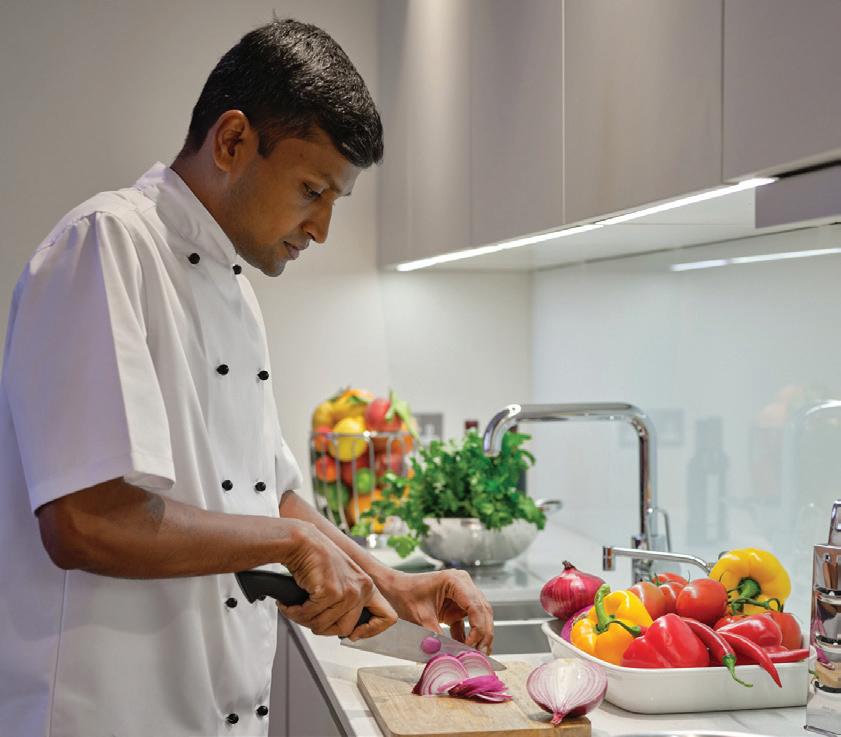HEALTHCARE IN LONDON



FIFTH EDITION
























© 2023. The entire contents of this publication are protected by copyright. All rights reserved. No part of this publication may be reproduced, stored in a retrieval system, or transmitted in any form or by any means: electronic, mechanical, photocopying, recording or otherwise, without the prior permission of the publisher. The views and opinions expressed by independent authors and contributors in this publication are provided in the writers’ personal capacities and are their sole responsibility. Their publication does not imply that they represent the views or opinions of Senate Publishing and must neither be regarded as constituting advice on any matter whatsoever, nor be interpreted as such. The reproduction of advertisements in this publication does not in any way imply endorsement by Senate Publishing of products or services referred to therein.
8
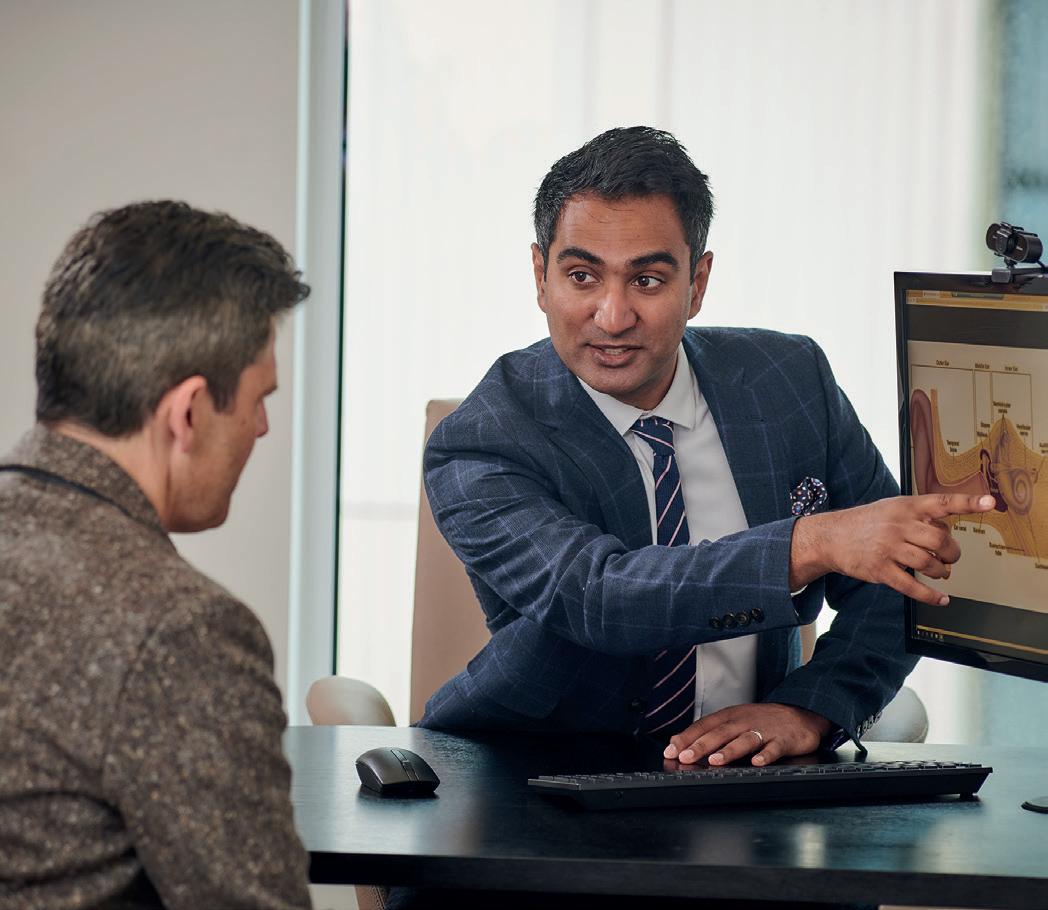
16

21
26
34

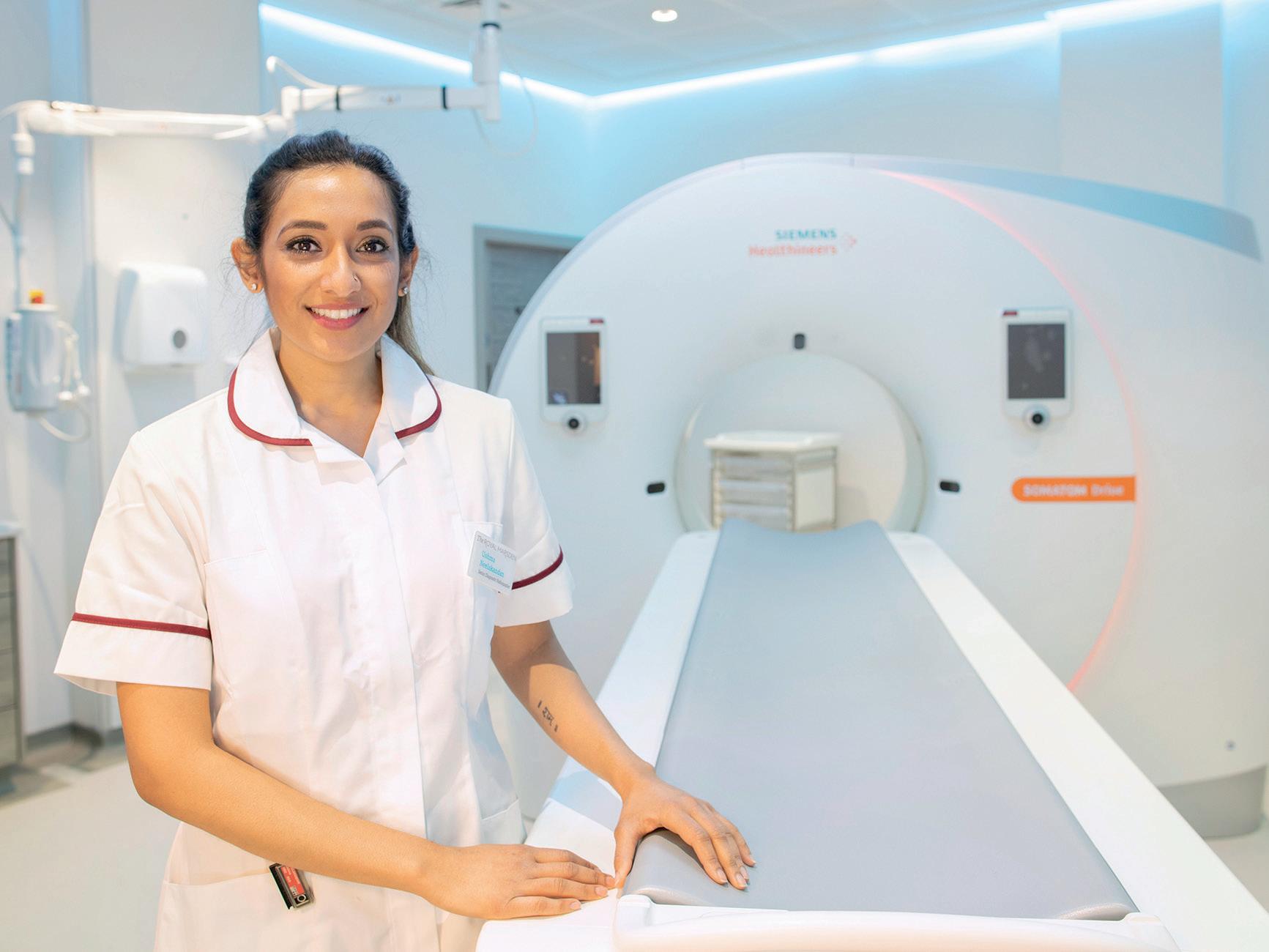
It is my great pleasure to welcome you to this latest edition of Healthcare in London, profiling the leading private healthcare options for international patients. We are proud to publish our fifth edition during a special year for the UK, as London takes centre stage for the Coronation of King Charles III, focusing the eyes of the world on a unique backdrop that combines the traditional and modern and attracts so many visitors to the city.
Since our first edition in 2018, we have followed the expansion and innovation in London’s private healthcare facilities. This latest edition continues to track this positive trend as the capital’s hospitals and clinics update us on the new facilities and technologies they have recently introduced, adding to
their already impressive offerings. Such developments are highlighted by the Howard de Walden Estate, landlord and steward of the Harley Street Medical Area – the world-class cluster of pioneering medical facilities mostly hidden behind the facades of the Victorian and Georgian buildings in this historic district.
The UK has long held a position at the forefront of cancer treatment and research, and the services available to those seeking the highest standards of care continue to expand. Among the cancer care providers we hear from in this edition are Cromwell Hospital, which gives an update on its partnership with GenesisCare that enables diagnosis, treatment, recovery and rehabilitation under one roof. The latest innovations in breast cancer treatment are also
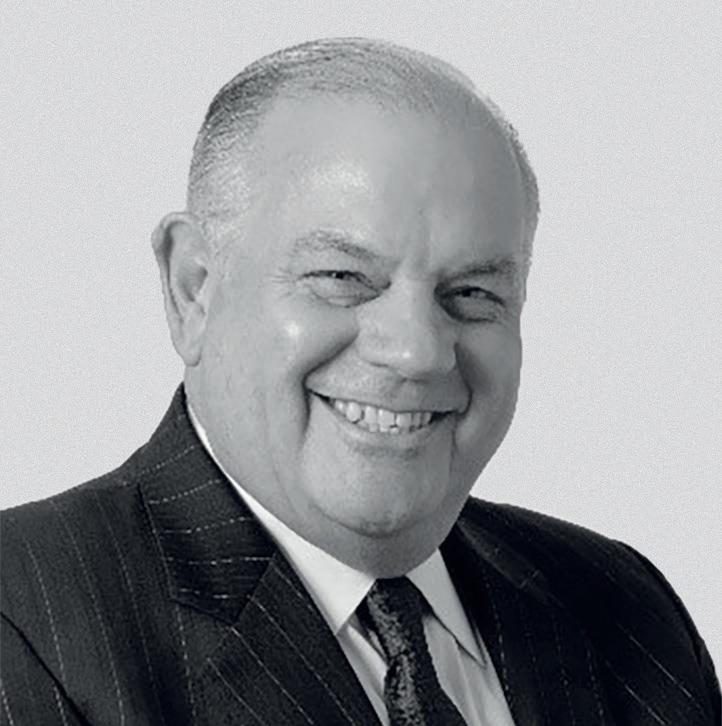
Further enhancements to the private healthcare services on offer in London maintain the city’s position as one of the leading destinations for international medical tourism
discussed by Cromwell consultant Giles Davies, who offers a helpful guide to a typical patient journey, while King Edward VII’s Hospital – one of London's oldest independent hospitals –explains its highly personalised, holistic approach to breast cancer treatment.
Professor Sanjay Popat, a specialist in cancers of the chest at The Royal Marsden Private Care, talks about the latest treatments options and research, and we also learn about the worldleading oncology services offered by The Royal Marsden NHS Foundation Trust. The newly enlarged Guy’s and St Thomas’ NHS Foundation Trust –which recently merged with the Royal Brompton and Harefield Hospitals to form a new clinical group – also outlines the wide range of private healthcare services it offers across its sites, including specialist care for young patients at Evelina London Children’s Hospital.
The expansion of London’s private healthcare provision is also in evidence at specialist day surgery and outpatient diagnostics facility OneWelbeck, whose chief executive, Andrew Chadwick-Jones, provides an update on the hospital's development and the success of its doctor-partnership model. Also, Cleveland Clinic highlights its global network and specialist services for international patients, provided by the recent addition of the Cleveland Clinic London Hospital in Belgravia to its Portland Place Outpatient Centre.
The welcome increase in discussion of women’s health in the media continues to break down taboos associated with issues affecting women of all ages. Healthcare in London continues to shine a spotlight on women’s health in this edition with an informative article on endometriosis, the awareness of which has grown recently as several high-profile women have shared their experiences of this often debilitating condition. Mr Amer Raza, consultant gynaecologist leading the team at the International Centre for Endometriosis at Cromwell Hospital, explains the diagnosis and treatment procedures for visiting patients.
We also turn our attention to diabetes, which accounts for at least 1.5 million deaths each year and is a growing
problem in countries that have developed rapidly over recent decades, such as those in the Middle East where traditional lifestyles and diets have often been replaced. Jeannette Woods, diabetes nurse consultant at the London Clinic, explains the condition and how it can be managed.
Aside from the obvious benefits of visiting London for medical treatment, the city’s retail, hospitality and leisure attractions add to its appeal. Our Experience London section focuses on the Chelsea and Knightsbridge districts and, in particular, the area around stylish Sloane Street, which boasts an array of luxurious shops, restaurants, hotels and more to enjoy.
London’s combination of medical expertise and unique attractions goes from strength to strength, and I am sure the wealth of information and expertise in these pages will encourage you to visit our city for both medical and leisure reasons. A warm welcome awaits!

“London’s combination of medical expertise and unique attractions goes from strength to strength”David Hare, Chief Executive, Independent Healthcare Providers Network, NHS Confederation
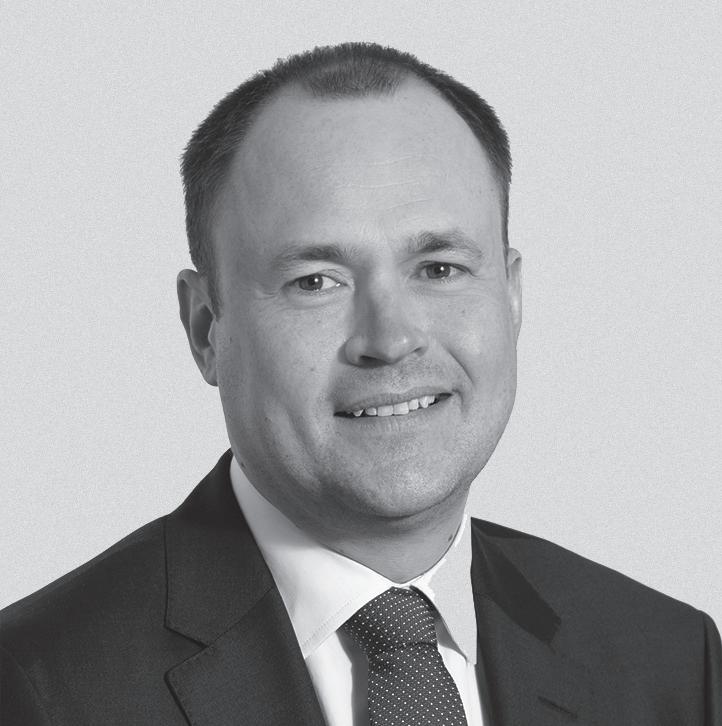
It was the writer Dr Samuel Johnson that once remarked, “when a man is tired of London, he is tired of life; for there is in London all that life can afford.” Johnson made that comment in 1777, but what was true then remains true to this day – London is a city with endless possibilities; brimming with the finest art, culture, cuisine, shopping and leisure that the world has to offer, alongside opportunities for immense human and commercial progress.
The fact that, in 2022, London was ranked the world’s most magnetic city for the 10th consecutive year, keeping New York in second place
and Tokyo in third, demonstrates the ongoing pull factor that London enjoys, and why more than 20 million tourists visit the city every year.
It is also why so many highly skilled people across the world choose to study and work in London, adding to its rich talent pool and providing a world-class human resource capability for thousands of businesses, including the many multinationals that choose to be headquartered in the city. This brings a genuine vibrancy and diversity to London, with an estimated 200 nationalities represented in the city, together speaking more than 300 languages.
Not only is London a magnet for commercial and leisure visitors, it is also home to some of the finest healthcare available anywhere in the world
But it is not just London’s vast cultural and commercial attractions that bring people to the UK capital – London is also home to some of the finest healthcare available anywhere in the world. Supported by high levels of investment, London’s hospitals deliver cutting-edge healthcare to large volumes of patients every year, including well over 100,000 people based abroad, who choose London as their preferred destination for medical treatment.
From advanced diagnostics to the treatment of complex conditions, London’s hospitals collectively deliver among the broadest ranges of services available in a single city anywhere in the world, with outcomes “best in class”. This is supported by ongoing investment in research and clinical trials to ensure that London’s hospitals remain at the cutting edge of modern healthcare. The city’s providers also continue to innovate with 'telehealth' and with the virtual patient experience increasingly becoming part of the patient pathway.
This vibrant ecosystem is overseen by one of the strongest and most robust regulatory frameworks anywhere in the world, providing reassurance to patients that there is independent validation and assessment of the safety and quality of services provided. Pleasingly, London’s hospitals score well against these criteria –developed and overseen by the Care Quality Commission (CQC) – with standards of transparency taken to a high level, including regular inspections and publicly released reports detailing the inspection teams' findings.
Modern healthcare is very much a team sport, and London’s hospitals embrace multidisciplinary team working and an ethos of professional partnership. This is all supported by London’s ability to attract the top talent from the UK and the rest of the world, and to bring that into its hospitals. Ongoing training and education is a major priority, building on the pioneering work of people such as Florence Nightingale, the founder of modern nursing, and Joseph Lister, the father of modern surgery, who worked at King’s College London.
This benefit is bolstered by the widespread use of the English language in the city and the fact that London is well positioned geographically for rapid access to the city’s six airports. This includes London’s Heathrow, the world’s most connected international airport, serving hundreds of destinations around the world through direct flight routes.
For every single one of us, our health and the health of our families is our top priority, and this is why so many people want the best healthcare that is available, wherever that may be. In London it is possible for everybody, no matter their need or condition, to access the treatment that they require, often at prices well below competitor jurisdictions.
Allied with the fact that London is still the world’s greatest and most connected city, and the personalised and tailored support that international patients receive from its hospitals, it is little surprise that so many people view the city as their number-one healthcare destination of choice when considering their overseas treatment options.
International patients are increasingly choosing London for medical treatment, as well as accessing remote consultations (PHOTO: EVERYTHING POSSIBLE/SHUTTERSTOCK)

“London’s hospitals remain at the cutting edge of modern healthcare”

The Harley Street Medical Area (HSMA), from the outside at least, appears to have changed very little since its renown as a hub for private healthcare first began to build, over a century ago. But behind the grand Georgian and Victorian facades of its many period buildings, the HSMA’s evolution has continued at a relentless pace.
The Howard de Walden Estate, in its role as the area’s landlord and steward, has spent the past two decades gradually ramping up a substantial development programme designed to create a portfolio of world-class healthcare facilities. In many cases, this has meant enlarging
individual buildings or linking buildings together, working behind those distinctive period facades. The result is the creation of 21st-century facilities capable of meeting the demands of modern healthcare, providing a frictionless patient experience and accommodating large, highly sophisticated equipment.
In tandem, Howard de Walden has sought out healthcare providers at the very top of their respective fields to work within these buildings. This pursuit of excellence has given the area an increasingly international
bent, with the likes of Mayo Clinic Healthcare, HCA and Cleveland Clinic from the USA and Isokinetic from Italy establishing a presence in the HSMA, alongside some of the UK’s most impressive operators. Established private healthcare providers such as Phoenix Hospital Group, The London Clinic and King Edward VII’s Hospital have been joined by the private patient units of some of London’s leading NHS trusts: Guy’s and St. Thomas’, Moorfields Eye Hospital and The Royal Marsden.
Throughout this process of expansion, Howard de Walden has very deliberately sought to diversify the range of specialisms provided by the HSMA’s hospitals and clinics. Some of the more prominent specialisms now include cancer services, ophthalmology, urology, fertility, sports medicine and specialised dentistry. Mental health is another major focus, recently bolstered by the arrival from the US of the pioneering All Points
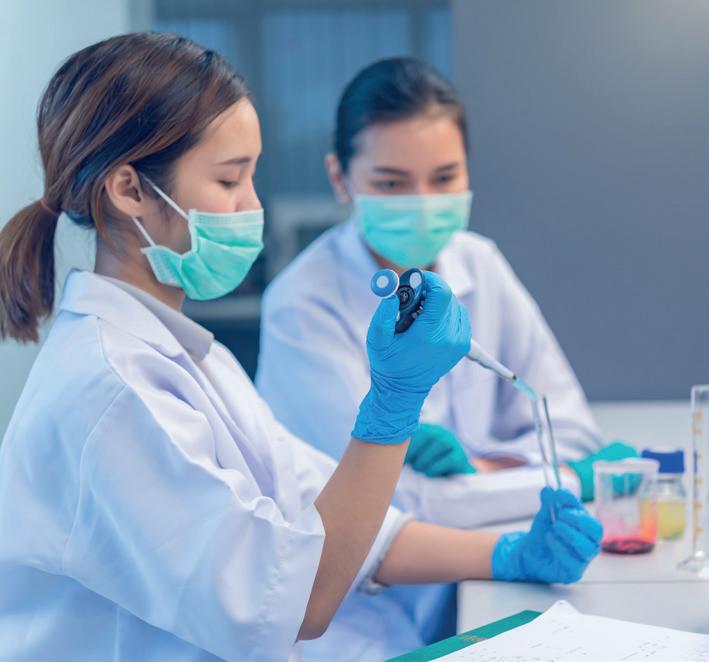
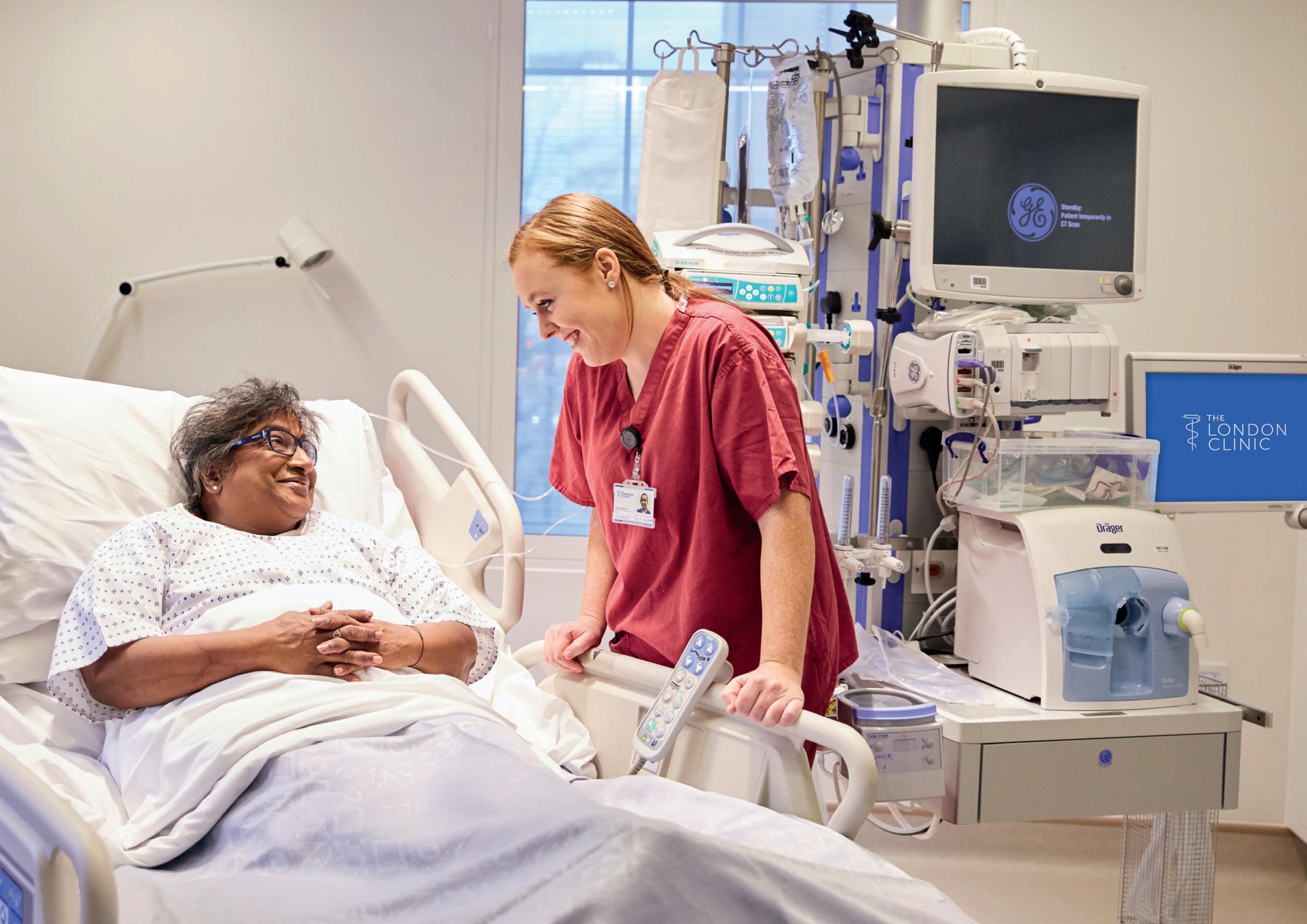
North clinic. But with so many clinicians clustered here, working in facilities ranging from individual consulting rooms to full-scale hospitals, the offering is unique. This complex ecosystem has also drawn in other related services, from GPs to physiotherapists and nutritionists. There is a mature healthcare infrastructure operating under a collective brand that is known and trusted around the world. If people want to see the best practitioners in almost any field, they know they can head to Harley Street.
The HSMA is now at an inflection point in its development. The major benefits of the area’s location – in the middle of Marylebone, right in the heart of London – are its international accessibility, its unique atmosphere and aesthetics, and the lifestyle appeal to patients and their families of the local hotels, restaurants, shops and parks. The only real downside
to this central location is that space is necessarily at a premium. Following the recent wave of major redevelopments, there is now little immediate potential for, large-scale buildings to be added to the portfolio. As a result, The Howard de Walden Estate is looking to compliment the HSMA still further, attracting services and enablers that don’t require the scale of development demanded by a hospital or a large clinic.
Prominent among these is life sciences –the intersection between healthcare and research. A thriving life-sciences sector requires two things: universities and research institutes in which to formulate ideas, and hospitals in which to test and refine them. The HSMA has unrivalled

proximity to both and the potential to build bridges between them. Imperial College is just to the west, UCL to the east, King’s Health Partners to the south, and the Academy of Medical Sciences right in the middle of the estate. Clinics and hospitals are lined up, side by side. Several organisations, such as the Sarah Cannon Institute and Re:Cognition Health, are already running clinical trials in the HSMA, but there is now a plan in place to accommodate other dedicated research and data facilities that can help strengthen this vital and innovative sector.
In the coming years, the historic facades of the HSMA’s buildings still won’t change, beyond the occasional repair work needed to keep them gleaming. Inside them, though, nothing ever stands still.
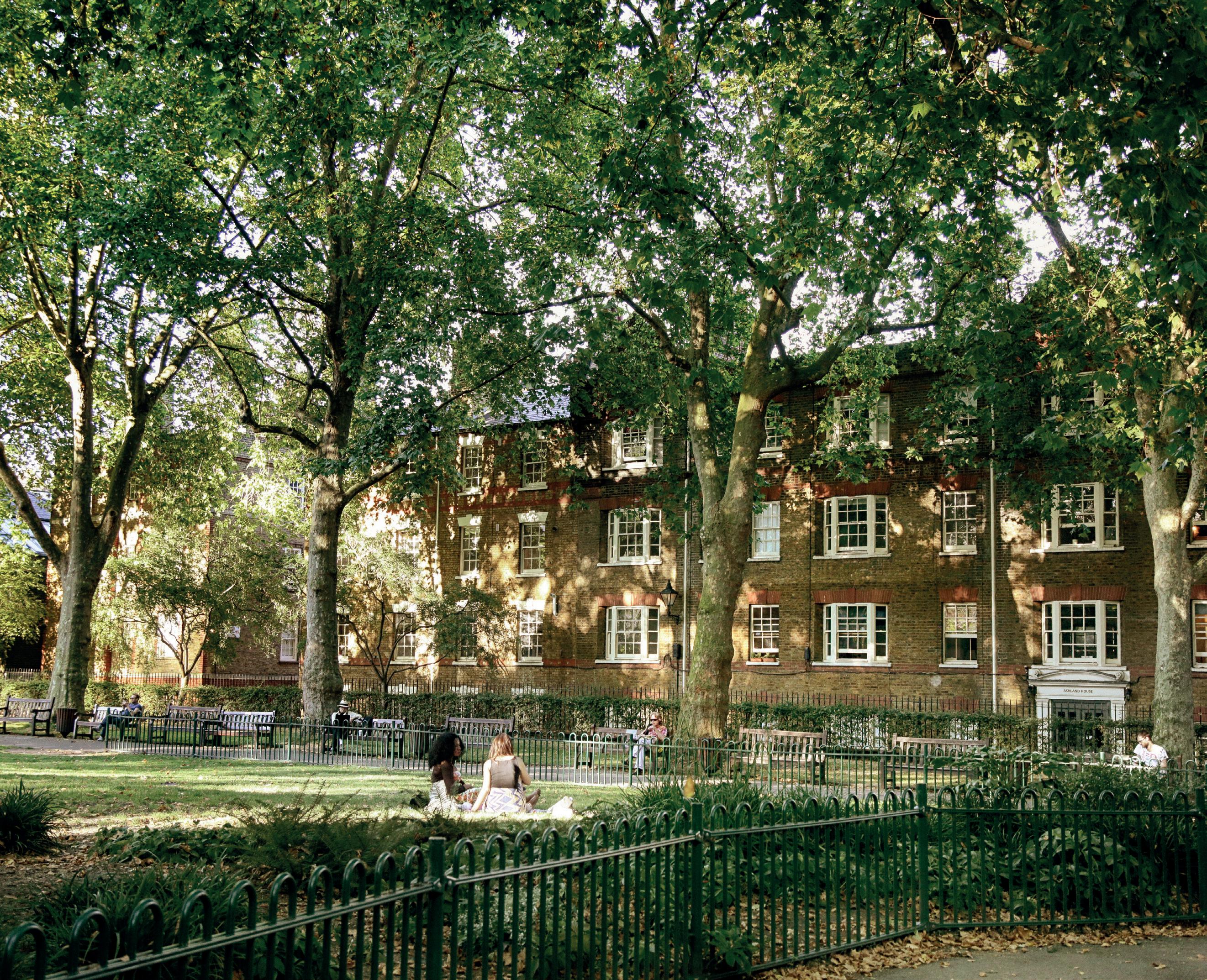
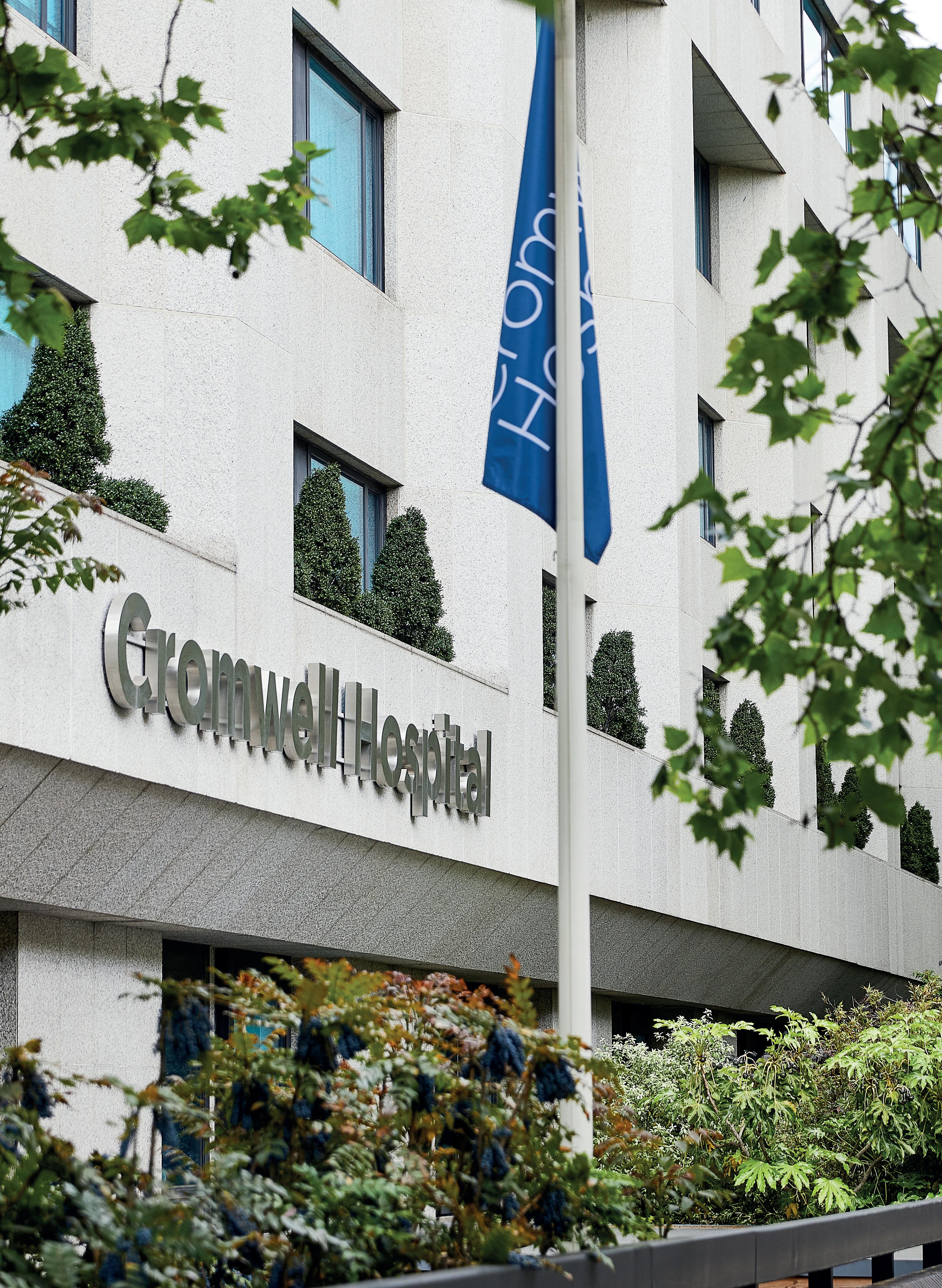
At Cromwell Hospital, we understand that getting rapid access to quality cancer care has never been so important. According to the British Journal of Cancer, one in two people in the UK will be diagnosed with cancer during their lifetime – it is an illness that will touch nearly every family personally. However, with an early diagnosis and fast access to a tailored treatment plan, there is a very good chance of beating cancer.
We diagnose and treat all types of cancer at Cromwell Hospital, including breast, bowel, blood, gynaecological, prostate, liver, lung, skin, gastrointestinal and thyroid cancers. Alongside access to a pioneering team of world-leading cancer consultants, clinical nurse specialists, counsellors and specialist physiotherapists, all under one roof, we also offer rapid
diagnostics including MRI, CT, PETCT, ultrasound, mammography and endoscopy, and genetic testing, We also offer leading cancer treatments, including minimally invasive and robotic surgery, advanced radiotherapy and some of the latest cancer drugs.
We know that time to treatment heavily influences patient outcomes, so we’ve set up rapid-access patient pathways at our Integrated Cancer Campus, enabling patients to see a consultant, undergo the necessary tests and receive a diagnosis in the shortest possible timeframe. Our rapidaccess cancer care pathways include breast, prostate, and bowel cancer.
Forming a multidisciplinary team, members from each of the clinical disciplines available at our Integrated

From diagnosis and treatment to recovery and rehabilitation, Cromwell Hospital offers rapid access to world-leading cancer care – all under one roof1 Cromwell Hospital is an ISO 9001 accredited, internationally recognised centre of excellence in oncology and an integrated cancer campus (PHOTO: CROMWELL HOSPITAL)
“I felt like I was in safe hands with my healthcare team throughout, and the fact that the service was so streamlined also helped to make what was a very stressful time a lot easier. I was able to have all my scans/tests on the same day and was even able to have my mastectomy done and as part of the same operation. This was a big relief to me.”
Jennifer, breast cancer patient
Cancer Campus meet regularly to discuss patient cases. As part of these meetings, they review test results and work together to jointly devise a tailored treatment plan that best meets a patient’s personal and clinical needs. Evidence shows that this collaborative working contributes to better patient outcomes and an improved patient experience.
Each patient and every cancer case is different. As such, we tailor our cancer treatment pathways to the individual patient. A comprehensive genetics service, overseen by our clinical geneticist and team of worldleading oncologists, allows us to both understand a patient’s predisposition to cancer, and the specific genetic mutation of an existing cancer – therefore, tailoring a targeted and effective treatment plan.
are more at risk of developing cancer. For example, patients with an altered BRCA1 and BRCA2 gene are more at risk of developing breast cancer. There are more than 100 gene variants associated with an increased risk of breast, prostate and ovarian cancer, and genetic testing can help identify these variants. Understanding the genetics behind cancer can not only help with diagnosis, but it can also guide oncologists on deciding what cancer treatment or medicine will work best for each individual patient.
Our experienced pharmacy team have access to all established drug regimens, as well as access to the latest cancer drugs. Being at the forefront of these new medicines means our patients have access to targeted cancer drugs that can both treat their cancer and reduce their symptoms and pain.
2 Cromwell Hospital offers rapid diagnostics, including MRI (magnetic resonance imaging) / 3-4 Visitors are greeted with modern and comfortable facilities (PHOTOS: CROMWELL HOSPITAL)
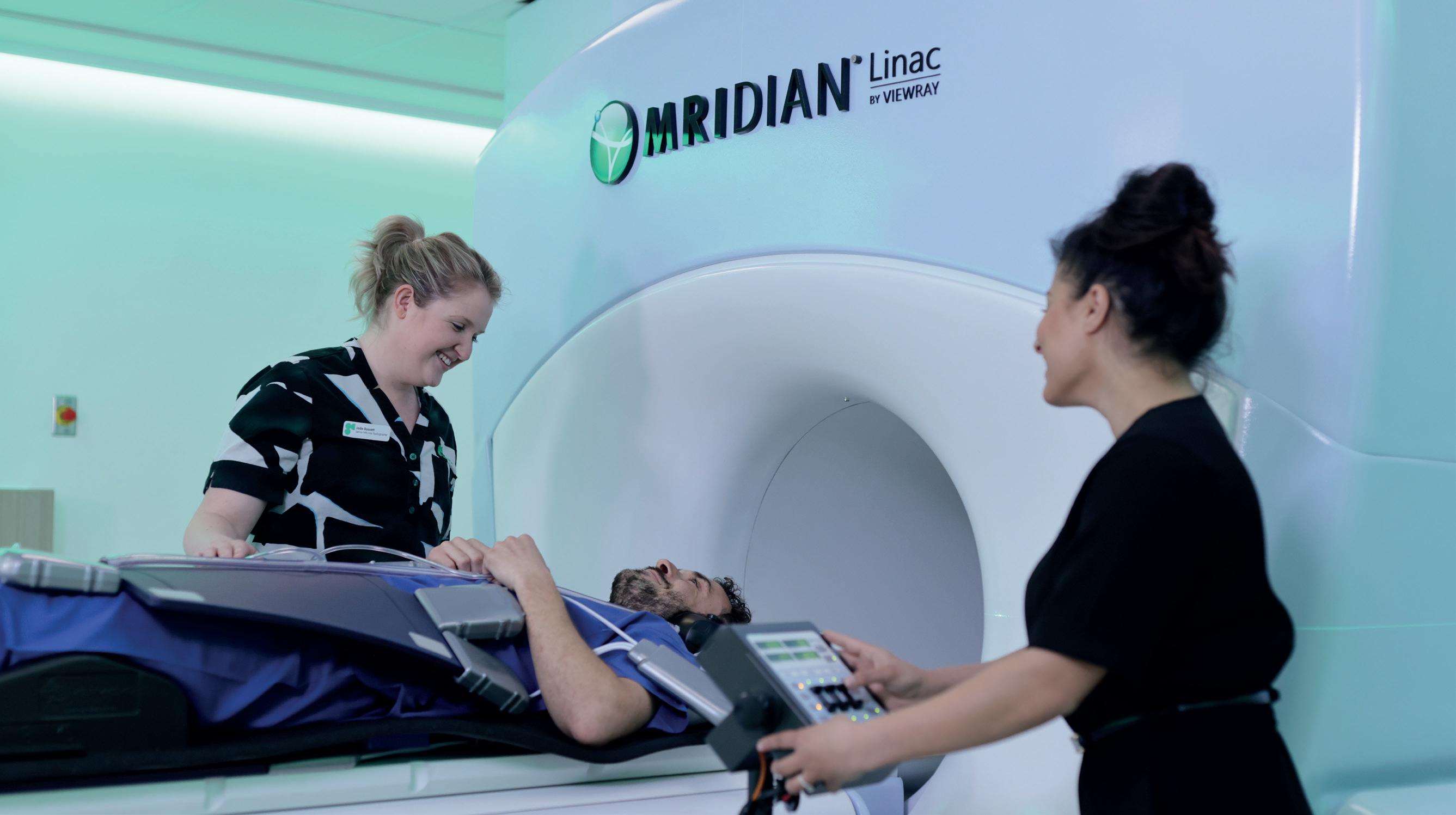
Some types of cancer are more commonly associated with certain genes, and patients with these genes
Where suitable, patients may undergo what is described as adjuvant therapy, where chemotherapy medications
“My role is to provide both inpatient and outpatient counselling to cancer patients at Cromwell Hospital. After receiving a diagnosis of cancer, people can understandably feel anxious, and that the situation is out of their control. Talking about their feelings in a confidential and non-judgmental environment can bring a sense of relief and help with symptoms such as depression, sleeplessness, and anxiety.
"Being treated at Cromwell and receiving support from the whole team, including allied health professionals such as counselling, physiotherapy, complimentary therapies and dietetics can help patients manage the side effects of treatment, feel less alone, find coping strategies and ways forward. At Cromwell Hospital, we are piloting a prehabilitation clinic to offer support prior to treatment from physiotherapy, dietetics, and counselling, as research shows this leads to better outcomes across physical and psychological health and recovery.”
are administered after surgery. This is designed to kill any small remaining cancer cells to significantly reduce the chances of recurrence or relapse.
We are proud to be partnered with GenesisCare, the leading private provider of radiotherapy services in the UK. Together we provide one of the most advanced oncology care pathways in Europe.

GenesisCare centre for radiotherapy at Cromwell Hospital offers some of the most advanced radiotherapy technologies in the world, working closely with leading health professionals and investing early in cutting-edge treatments that are proven to be safe and effective. Designed around three state-ofthe-art radiotherapy machines – the MRIdian, Gamma Knife Icon and Varian Edge – each specifically devised to treat different, and often complex cancers, meaning GenesisCare is equipped to treat all adult cancers with evidence-based care.
These technologies improve outcomes by enhancing the precision of treatment – limiting side effects and reducing the number of treatment sessions required. Having these machines under one roof makes the centre Europe’s most advanced radiotherapy facility.
Alongside the latest radiotherapy treatments, GenesisCare offers therapies that are proven to benefit people with cancer. Patients can
access a fully equipped gym, where oncology exercise specialists prescribe exercise programmes tailored to a patient, helping the body heal itself and improving treatment tolerance. In addition, through GenesisCare's charity partner Penny Brohn UK, patients can also benefit from a groundbreaking approach to supporting emotional and physical wellbeing through complimentary therapies.
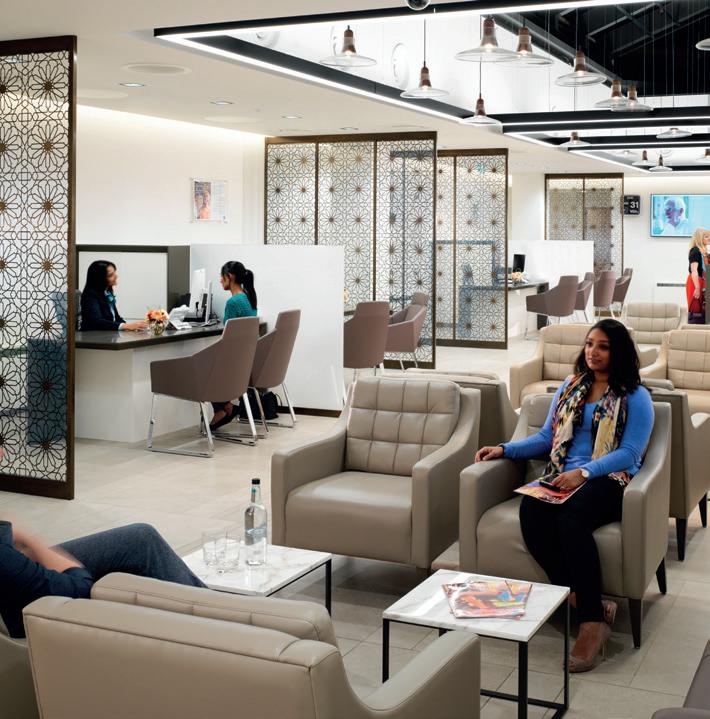
Together, Cromwell Hospital and GenesisCare are changing the way people experience cancer treatment and care, understanding what it takes to achieve the best possible life outcomes and going a little further to prove it.
At our Integrated Cancer Campus at Cromwell Hospital, we are always looking for new ways to ensure we offer world-class care tailored to your needs. That’s why we are harnessing the benefits of the latest roboticassisted surgical technologies to help our surgeons perform complex surgical procedures with even more precision.
We offer technologically advanced robotic-assisted surgical technologies, including the da Vinci Xi system, used for a range of keyhole surgery in urology, general surgery, oncology, colorectal, hepato-pancreato-biliary, lung, gynaecology and head and neck procedures. The Da Vinci Xi consists of highly advanced robotic arms, controlled by the surgeon from a console in the operating theatre.
If you are concerned about your health, or have received a cancer diagnosis and are considering private treatment, contact Cromwell Hospital to learn more about your options: call +44 (0)20 7460 5700 or visit www.cromwellhospital.com/ oncology
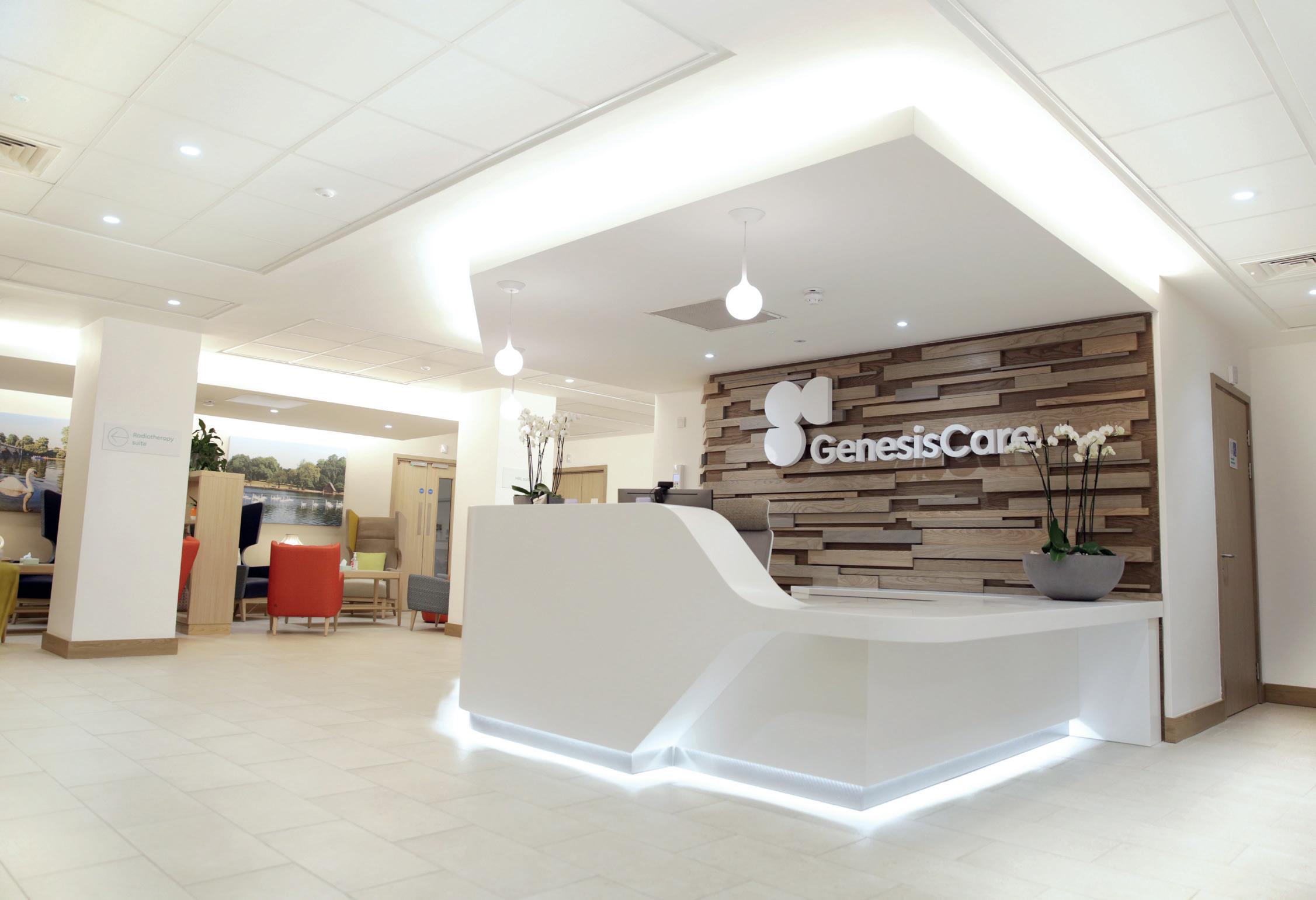
The robotic arms provide the surgeon with greater precision, control and flexibility when using surgical instruments, as well as superior visualisation and enhanced camera technologies, helping them to accurately plan the operation and monitor progress in real-time. This technology means that we can provide our patients with a more personalised surgical experience, based on their specific diagnosis and anatomy, delivering care expertly tailored to their needs.
Our specialist Macmillan Cancer counsellor, Helen Storey, offers an integral support service to our patients and their families. Helen is a qualified psychotherapist and specialist cancer counsellor, with over 20 years of experience in giving emotional support to those impacted by cancer – both patients and their families, including children. Helen offers a safe, confidential setting in which
patients can talk honestly about their feelings and any concerns they have.
At Cromwell Hospital, we have established the first survivorship clinic in recognition of the fact that patients going through head and neck cancer experience side effects that can impact their quality of life. There are many patients living with the consequences of having had head and neck cancer and treatment for it.
The survivorship clinic includes speech therapy, physiotherapy, dietetics and oral medicine, as well as surgery, so we can provide surveillance and manage symptoms such as dry mouth, fibrosis after radiotherapy, and dental issues that arise, as well as supporting and monitoring some of the rarer side effects. It is all about making sure that we can rehabilitate patients and help them live as full a life as possible after cancer.
Jeannette Woods, diabetes nurse consultant at the London Clinic, explains what it means to be diabetic and the best methods for managing the condition
What is diabetes?
Diabetes is a condition whereby the body is unable to control blood sugars, because there is a problem either in the production or the action of insulin. This is a hormone in the made in the pancreas and, effectively, its job is to convert our food into energy. Without sufficient insulin, or without insulin working properly, our bodies are unable to utilise our food for energy. Food is our battery – it’s what makes our bodies work – but it only becomes that energy when the sugar from the food moves from the bloodstream into the blood cells, and it is insulin that carries that sugar across from the fluid part of the blood into the blood cells.
There are two types of diabetes: type 1 and type 2. Type 1 covers a very small percentage of all diabetics in the world –
fewer than 10% – and is an autoimmune disease, meaning that the body turns on itself and kills off the cells that make insulin. We have no means of predicting who will get type 1 diabetes and, even if we did, there is no way of preventing or curing it. Somebody with type 1 diabetes is producing no insulin at all, and without insulin we can’t live, so these people need to inject insulin multiple times a day to control their blood sugar.
The majority of diabetics have type 2 diabetes, which is genetic in origin. We’re born with or without the predisposition for type 2 diabetes – it doesn’t mean we will definitely get it, but if we receive the right stimulants at the right time, then we can get it. Unlike type 1 diabetes, we can predict who is likely to get type 2 by considering their ethnicity, their family history of both diabetes and
1 People with diabetes will usually have to monitor their blood sugar on a daily basis, but sensor technology is making this task easier (PHOTO: SHUTTERSTOCK)
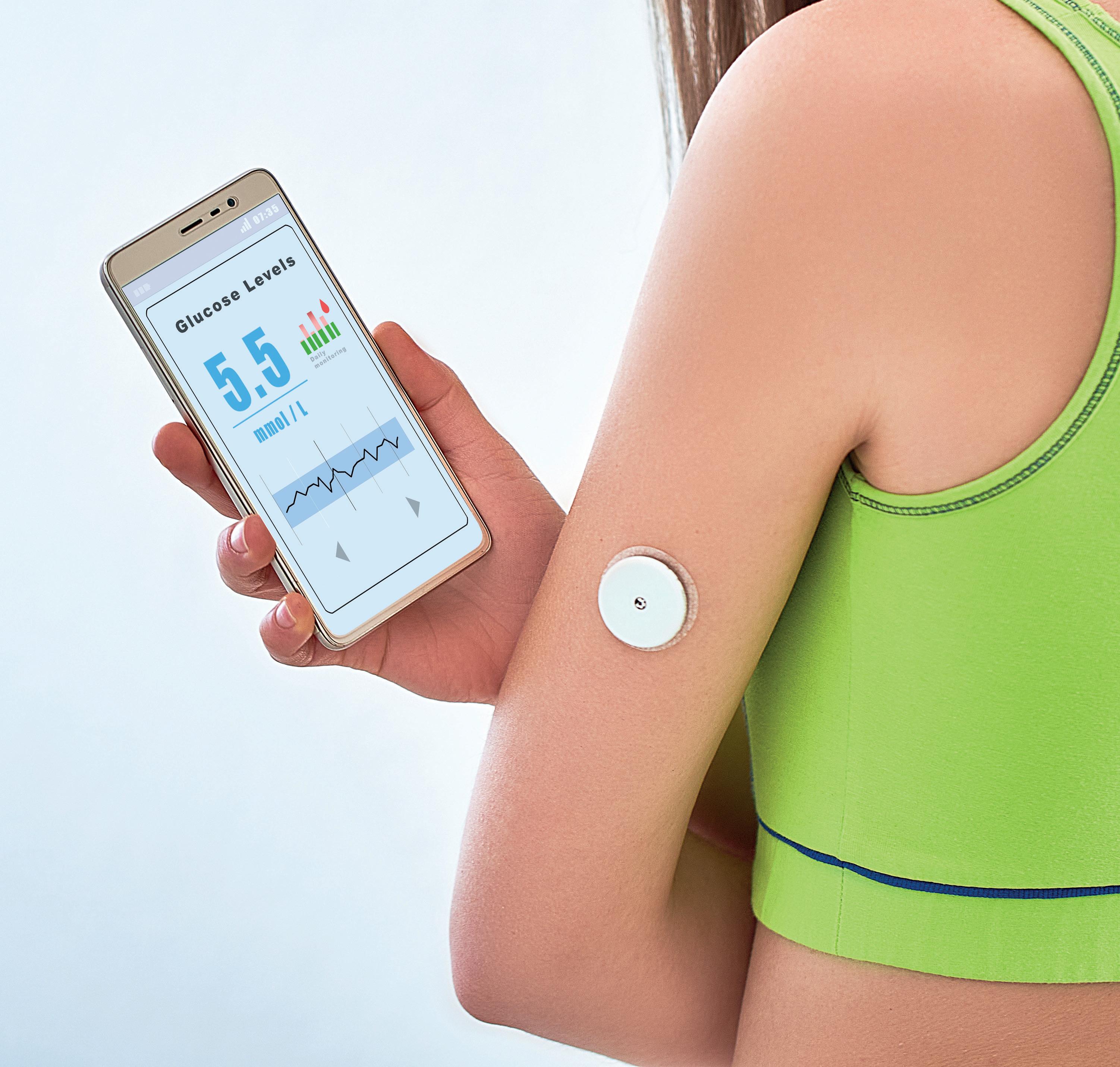
cardiovascular disease, and their waist circumference. Type 2 diabetes is very much related to lifestyle, which is why we see many more diabetes cases today than we have previously. This is mainly because as a people, in general, are much less active and we tend to carry more weight than our predecessors did. We tend to eat a lot of refined sugar in our diets, and this will often lead to the onset of type 2 diabetes.
With type 2 diabetes, the main problem is what we call ‘insulin resistance’. Even though the body is producing insulin, it’s not really capable of utilising it effectively, so the body has to produce increasing amounts of insulin in order to get the sugars under control. If this goes on for too long, then the pancreas can become tired and then have a problem with producing sufficient insulin.
Among the places where we see the most diabetes is in countries that have developed quickly. For example, in the Middle East, where countries such as Kuwait developed rapidly with the advent of the oil industry, the traditional lifestyle
and diet has been largely replaced with fast and processed food, as well as increasing car ownership, meaning less physical activity. Genetics haven’t caught up in such a short space of time, so the increase in type 2 diabetes is exaggerated in countries where there has been such rapid change.
In some people, prevention is possible, but for the majority of people the onset of type 2 diabetes can be delayed significantly, often by decades. The key is leading a healthy lifestyle, by eating healthily, losing weight and being active. Activity is so important because the more active we are, the less resistant to insulin we are.
With a healthy lifestyle, someone with type 2 can manage their condition and get to a position where they don’t need any outside treatment. It isn’t a cure, so if previous unhealthy habits return then blood sugar levels are going to
“Among the places where we see the most diabetes is in countries that have developed quickly”
1
go back up. A very high percentage of people with type 2 diabetes don’t need to suffer if they change their lifestyle significantly enough.
Type 2 used to be called ‘mature onset’ diabetes, because almost all those who developed it were in their late sixties and seventies. We cannot say that anymore and the average age of onset for diabetes comes down year on year, to the extent that now our lifestyles are often so unhealthy that we even have children developing type 2 diabetes, which was previously unheard of.
Whether a person has type 1 or type 2 diabetes, the symptoms are the same, but with type 1 these are much more obvious. That is because the speed of onset of diabetes is very different in each case, with a type 1 patient presenting with diabetes within weeks of onset, as their lack of insulin occurs very quickly.
The two most common signs of either newly diagnosed or uncontrolled diabetes are passing a lot of water and
the need to drink a lot. When there’s too much sugar in the body, it tries to produce more insulin to lower the level of sugar in the blood, but if you are not producing insulin or it is not functioning then the body can’t do that. Instead, it tries to get rid of the sugar by passing it out through the kidneys. As sugar is very absorbent, it takes lots of water with it, so we become thirsty to replace the water and avoid becoming dehydrated.
As I mentioned before, sugar is our battery. It’s our energy, but you still have to keep living, even if you can’t use that sugar. So the body turns to its own fat stores and starts breaking those down in order to get some energy out of it. Obviously, that leads to very rapid weight loss, which tends to happen with type 1.
The problem with type 2 diabetes is that the onset is very slow, so people who are diagnosed will certainly have had it for months, perhaps even for years. The person with type 2 diabetes has reached a high sugar level over maybe the previous 18 months, so the body has adapted very slowly and the patient doesn’t recall how much better they were feeling a year or two earlier. Often, our patients only realise how
2 In general, people tend to carry more weight than their predecessors did, raising the rick of diabetes / 3 Finger-prick blood tests have long been a painful daily chore for diabetes patients (PHOTOS: SHUTTERSTOCK)
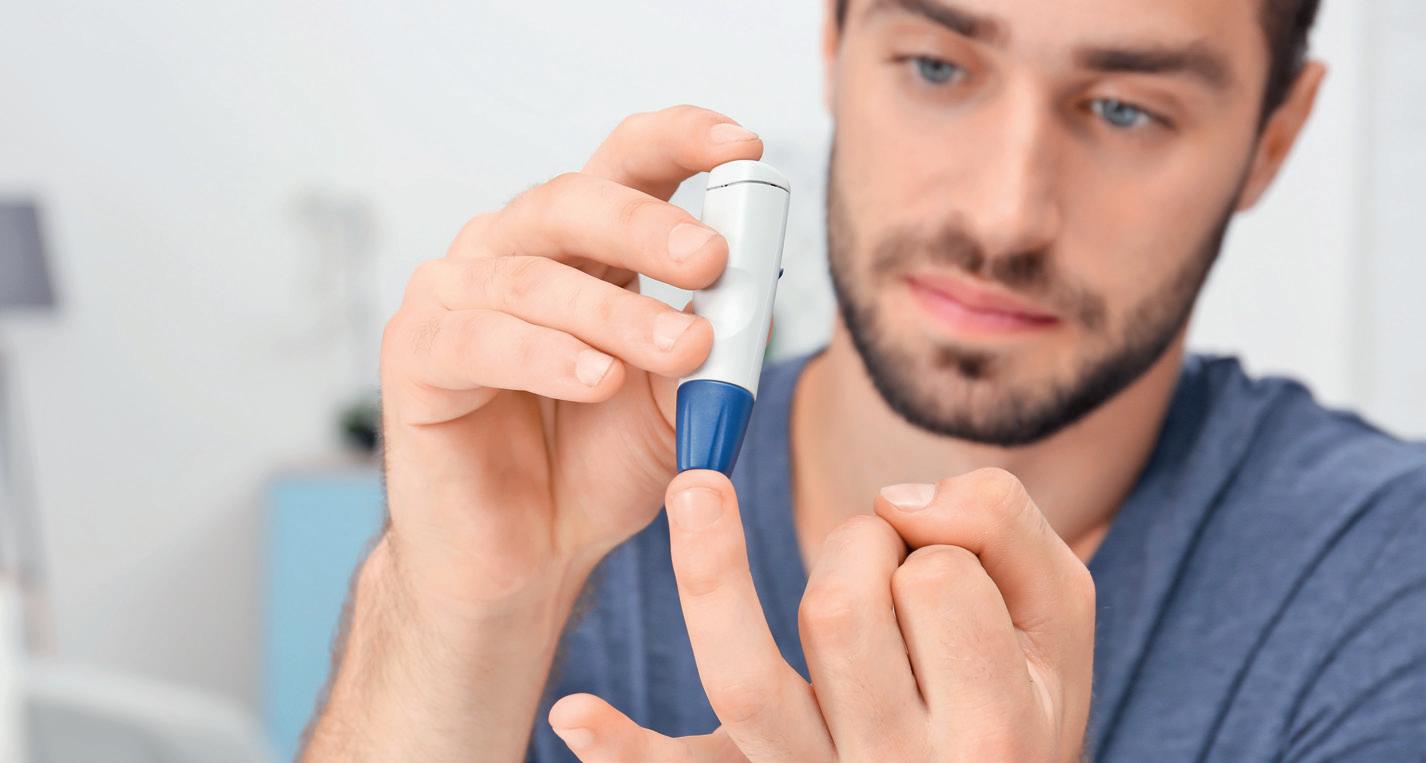

poorly they had been feeling a couple of weeks after starting their treatment.
It is quite common that people with type 2 diabetes are diagnosed when they have a routine health check for insurance, for example, or a blood test in preparation for a hospital procedure. Also, sadly, another way that diabetes is often diagnosed is when the patient presents with a complication of diabetes, such as a black toe or a sight problem, or they might have shown kidney problems in a blood test. At that point, the patient will have had diabetes for a long time, without any treatment, and that is when complications can occur.
What would be the typical patient journey for someone diagnosed with diabetes?
Often, when someone is diagnosed by their general practitioner, their doctor may prescribe tablets and suggest a follow up in, say, six months. However, it is best if the patient is educated on how to manage their diabetes from day one.

Diabetes is very much a self-management condition, but obviously this can only
happen with knowledge. Education really is the key, but sadly many people don’t receive that education and then they and their doctors are puzzled at why their control isn’t very good.
When people come to our practice at the London Clinic, they would first see our specialist – consultant in endocrinology and diabetes Dr Richard Sheaves – who would spend an hour with them to talk through their condition, the type of diabetes they have and what their blood sugar reading means. My role is then to talk more about day-to-day management of diabetes, most importantly starting with understanding the patient – who is the patient? What do they do for a living? What do they like to do for leisure? What treatments might suit them best and what might they struggle with?
What technology is available to help diabetes patients manage their condition?
Generally, patients monitor their blood sugar on a daily basis, often on multiple occasions. Monitoring is the biggest issue for patients, as it is irritating to
“Diabetes is very much a selfmanagement condition, but obviously this can only happen with knowledge”
technology such as continuous glucosemonitoring sensors that can sit under the skin and monitor blood sugar every five minutes, send that information to your phone. At all times patients can their blood sugar levels, and that’s a huge educational tool – in a short period the patient can learn exactly what foods affect their blood sugar, by how much and for how long. In the first few weeks of using a sensor a patient will learn more than they would have done previously in a year or two, which has changed the lives of so many people. For example, patients may not need to give up particular foods completely, but can learn what is a sensible portion size for them.
controls with their phone or a handset. It’s a very complex way of managing diabetes and, when used in combination with glucose-monitoring sensors, can mean a type 1 patient would only need to inject insulin every three days, at the time when the pump is changed.
This has also led to the development of a hybrid system – an artificial pancreas, essentially – with pumps that can connect directly to a sensor, so that the patient doesn’t have to make the decisions on a constant basis about how much insulin should be administered. This means they can keep their blood sugar within normal limits almost all the time.

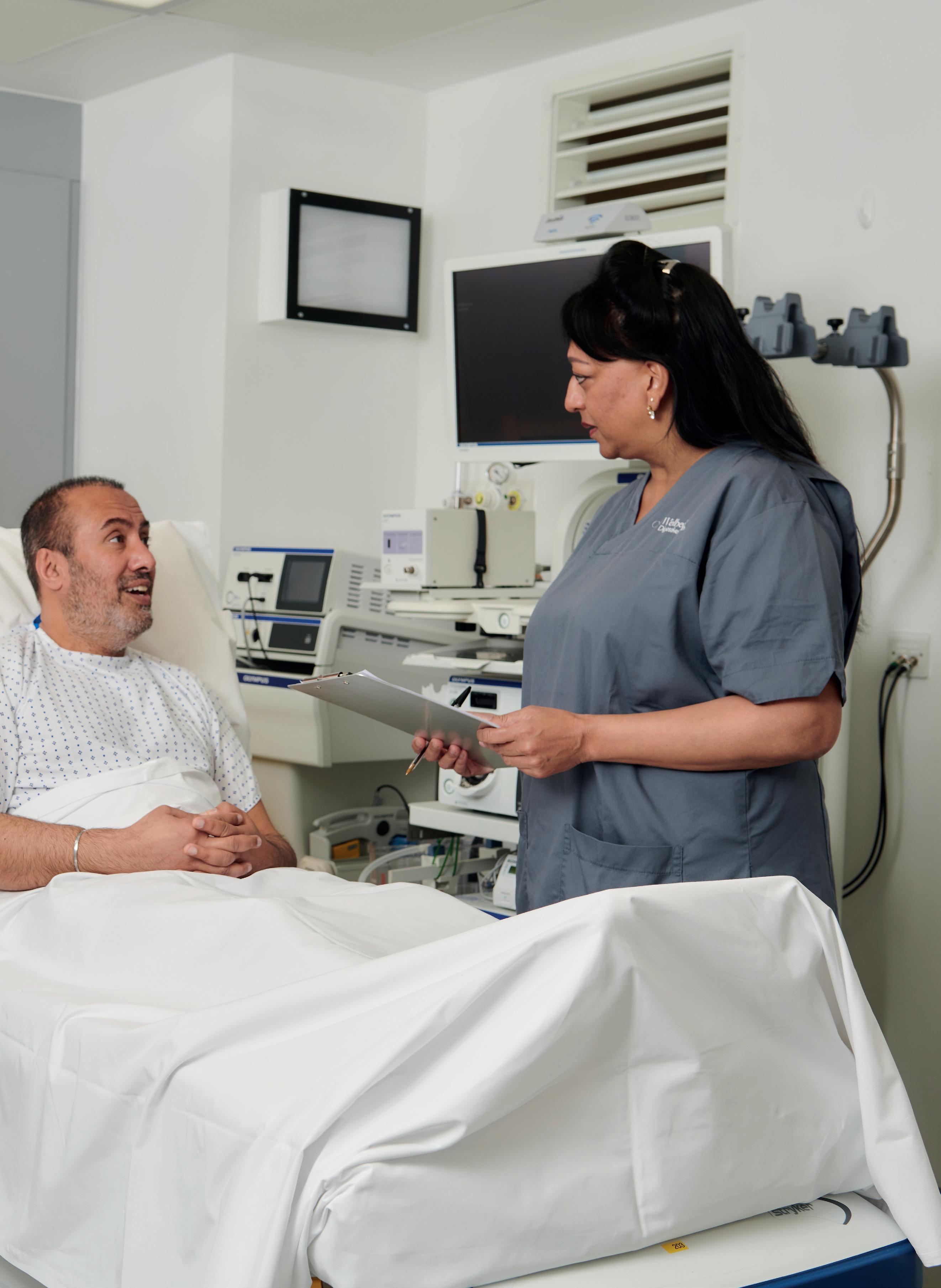
OneWelbeck CEO Andrew ChadwickJones talks about the hospital's expansion and the success of its doctorpartnership model
OneWelbeck has expanded over the past few years. What departments do you now have?
We currently have 12 departments at OneWelbeck, including the largest teams of their kind in the UK for our digestive health and heart health departments. Additionally, we have teams for women's health, which covers both gynaecology and enhanced breast screening, imaging & diagnostics, orthopaedics, and ear, nose and throat (ENT). We have built a lung health team, which is now the largest private respiratory group in the UK and has been crucial in the treatment of Long Covid, along with an endocrinology team that has 14 endocrinologists.
As a result, when a patient walks into one of our clinics, they are immediately seen by the appropriate clinician,
which is exciting because healthcare in London has not traditionally been organised in this way.
What is it about OneWelbeck that sets it apart from other private hospitals and clinics?
The difference in our model is that we have excellent doctors who wanted to affect change in the system by leading their own clinics. They had, to an extent, become frustrated with the traditional way that hospitals operate and wanted to build a better type of healthcare. That meant these leading doctors forming teams of their highly regarded colleagues and building a clinic that focused on their specialty.
OneWelbeck is now the largest doctor partnership in the UK, and our model is so successful because every doctor
in each department is recruited directly by the other medics in that team, who are all partners and invested in the business. The fact that every member of our medical staff has been selected by the other doctors on their teams gives our patients great peace of mind, knowing they will receive consistently high-quality care.
There is a great sense of pride within the hospital, as well as an enormous amount of experience, because so many of our clinicians have had leadership roles within the National Health Service (NHS) and they also have exceptional academic credentials. Being invested in OneWelbeck gives many of these highly established specialists the chance to consolidate decades of experience. They can develop the very best practice within their clinics, as they know what works and what doesn’t.
Some of our teams at OneWelbeck have as many as 40 doctors. That means we cover all the subspecialties, and our
doctors will happily refer patients to their colleagues in other departments where they could also help, rather than sending them elsewhere and causing delays to diagnosis and treatment.
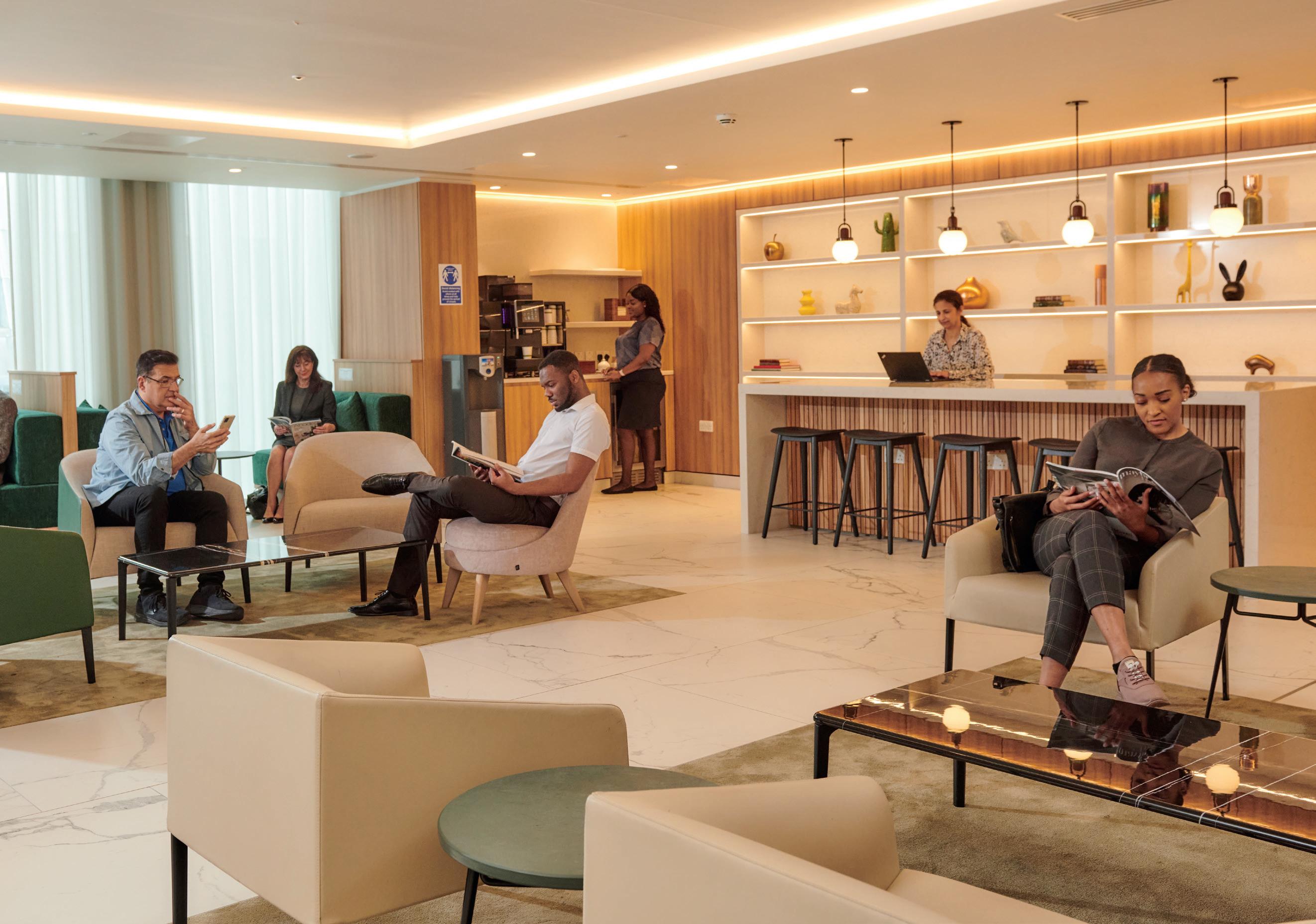
As each doctor has a strong personal connection to OneWelbeck, they are invested in its success and committed to the convenience and comfort of their patients. Our senior clinicians recruit staff that they are confident are the best in their specialties, ensuring an exceptional quality of patient care. The doctors at OneWelbeck spend a lot of time trying to find new ways to support and inform their patients too. For instance, most of our clinical specialties now have an integrated app with over 300 personalised videos of different procedures, which patients can watch before coming into our building. This simply wouldn’t be possible in places where the specialists often change.
“Our aim is to be the highestquality, most renowned clinic in the UK”2 Visitors are greeted by a modern, comfortable and welcoming environment / 3 OneWelbeck’s specialist teams are located across nine floors of the same building, making the hospital one of the most accessible centres for private healthcare / 4 Visiting patients are immediately seen by the appropriate clinician (PHOTOS: ONEWELBECK)
Then, of course, there is the fact that our specialist teams are located across nine floors of the same building, which makes it one of the most accessible centres for private healthcare. Usually, these services would be more fragmented and spread across multiple sites.
We are fortunate to have an incredibly modern building, and hygiene has obviously been a priority. The hospital has its own air plant, so we have been running up to 15 air changes an hour, exceeding regulations, and this is something we will continue to do. We have also embraced numerous technological advances because of the pandemic, such as using dual-energy CT scans that enable us to provide a more detailed picture of lung damage.
The most significant development during the lockdown stages of the pandemic was the increase in online consultations, which have proved successful and have remained in place. Video conferencing enables us to offer initial consultations a lot sooner, as well as to provide aftercare where required, and also gives our international patients a greater degree of flexibility.
For example, if you live in the Middle East, you can book an initial online consultation without having to travel.
Our aim is to be the highest-quality, most renowned clinic in the UK, and we will achieve that by continuing to expand. We will soon be opening a new hospital in Oxford, one of the world’s leading centres for academic health science. We’re very excited about the expertise that will bring to our network.
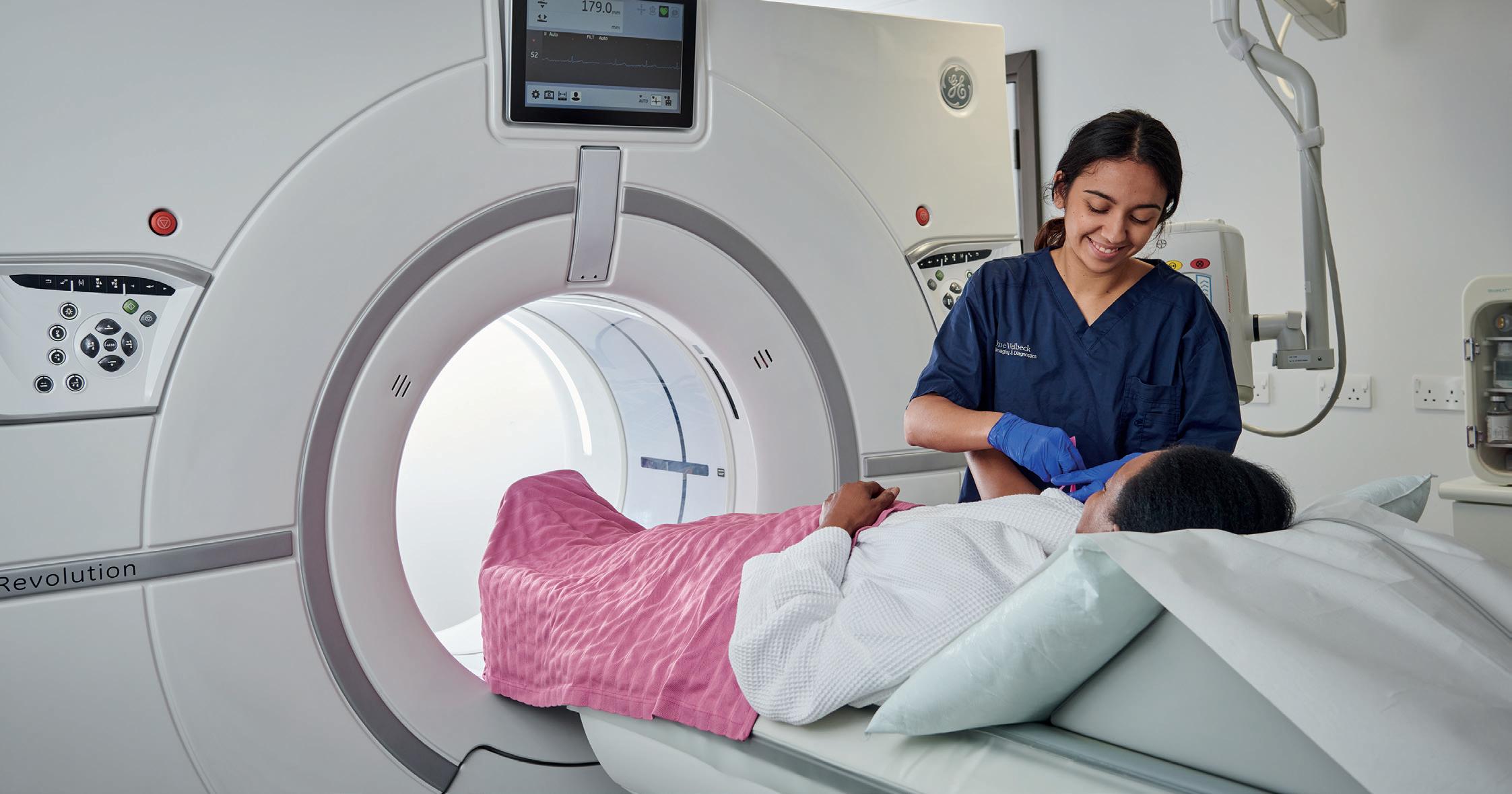
Our specialist teams work incredibly well, and I think we really have discovered a winning formula. Our ethos is simple –get the best doctors and allow them to develop outstanding clinics.
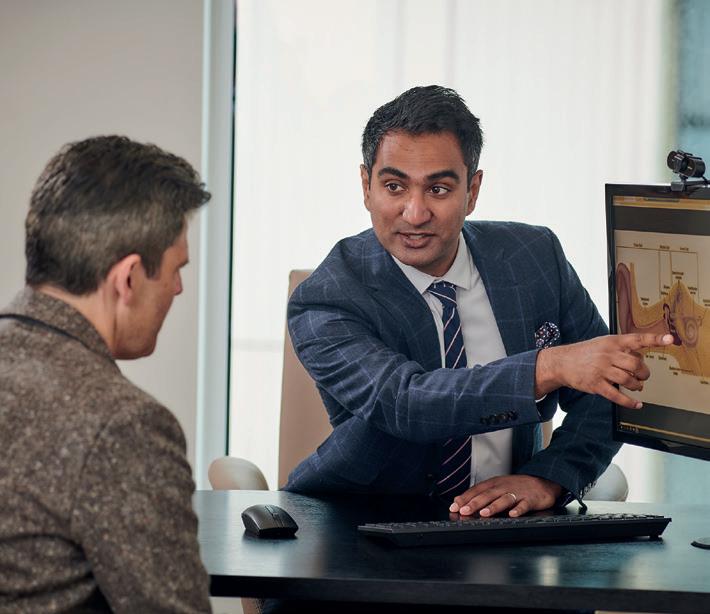
We are also very committed to implementing the latest medical breakthroughs, so our role as a leading private hospital is to turn academic research into new clinical techniques, which can pioneer throughout the private sector and the NHS. We have been busy building up academic partnerships and collaborations to ensure that we can give our patients the very best new treatments – not just in London, but the world.
To learn more about OneWelbeck and how to refer patients, please call +44 (0)20 3653 2000 or visit onewelbeck.com
The capital’s most accessible and advanced destination for worldclass healthcare, OneWelbeck is a specialist facility for minimally invasive day surgery and outpatient diagnostics across nine floors in the heart of London. with more than 250 consultants across 12 specialties, housed in custom-designed facilities. We empower teams of exceptional
doctors, using the latest technology in dedicated centres of excellence, to deliver an effortless, personal and premium experience.
OneWelbeck’s specialist centres offer diagnosis and treatment for a wide range of conditions – utilising the newest technology and the latest medical developments.
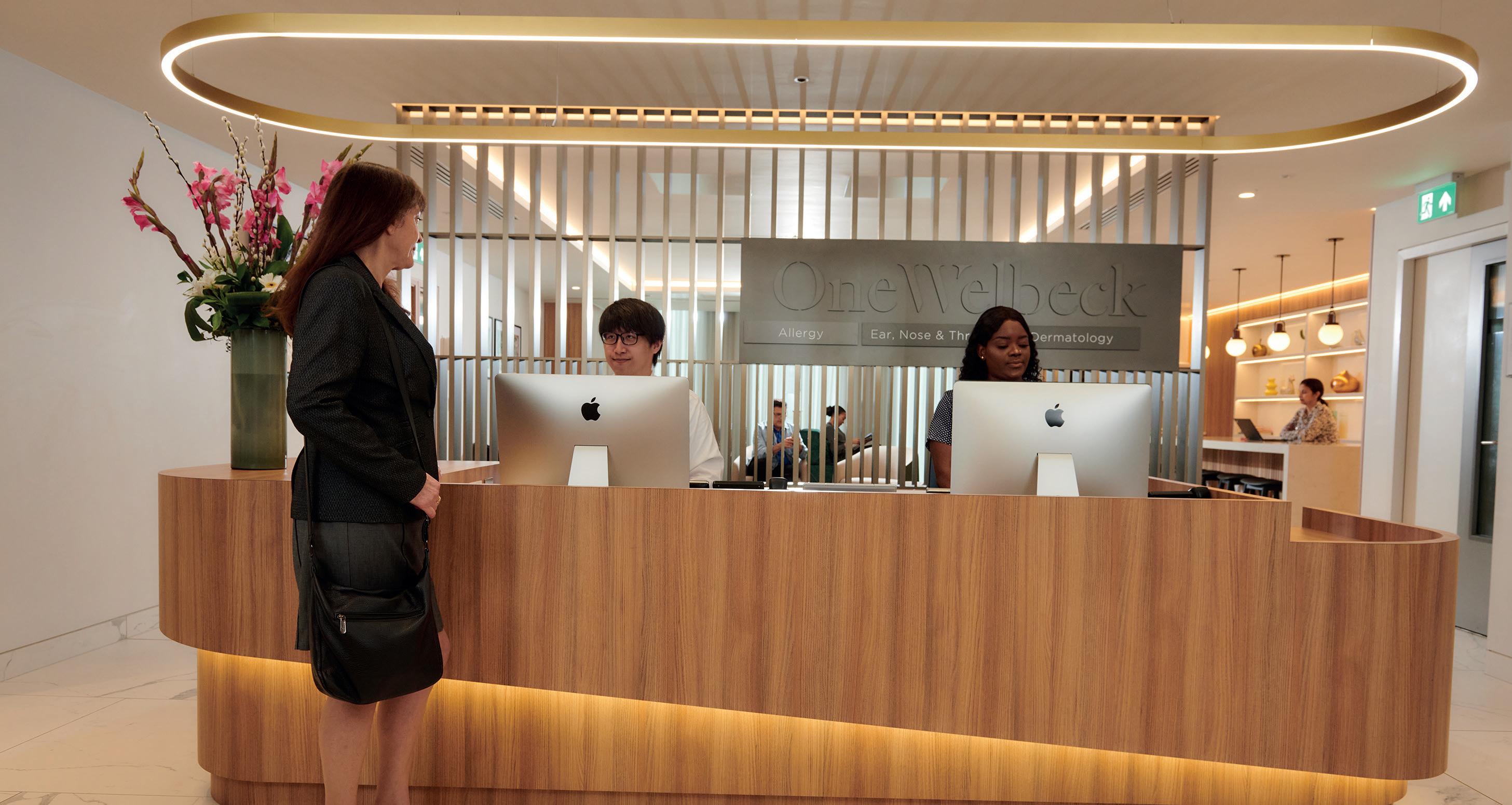
The consultants at OneWelbeck Heart Health have been assembled based on their hard-earned international reputations and expertise. Together, they cover the major London teaching hospitals and leading cardiac services, making up the largest independent cardiology group in the UK.
OneWelbeck Heart Health is also the country’s leading centre for treatment of atrial fibrillation (AF – a chaotic heart rhythm) with ablation. AF ablation helps to maintain a normal heart rhythm and involves making small burns or freezes to cause scarring on the inside of the heart. These help to break up electrical signals that cause an irregular heart rhythm, with the aim of returning the heart to a normal rhythm.
OneWelbeck is the only centre in London to offer AF ablation exclusively as a day-case
procedure. and the only clinic to follow patient outcomes using a nationally approved patient reported outcome measure. Our world-leading cardiology specialists carry out cutting-edge research into AF and lecture internationally on the best ablation techniques.

We also provide pacemaker insertion and offer complete care for pacemaker patients, even if the device was inserted at a different hospital. OneWelbeck is the only private centre in the UK that offers MRI for patients with pacemakers, and we work with insurers to deliver state-of-the-art conduction-system pacemaker devices and techniques.
We also treat and care for patients with an implantable loop recorder (LINQ) device, and offer on-site cardiology diagnostic tests such as echocardiograms, exercise testing and portable devices.
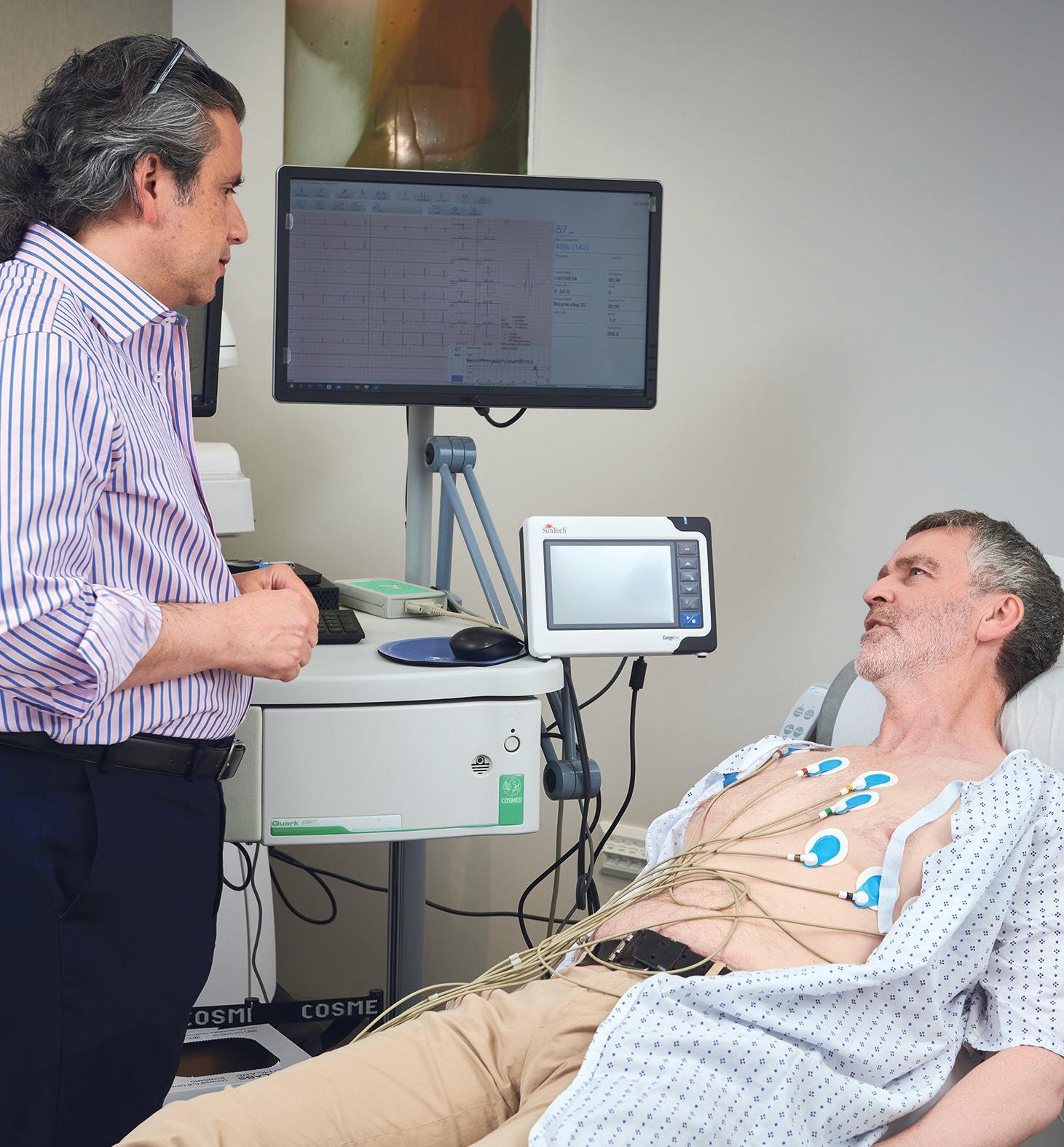
Hearing loss can significantly affect a person's quality of life and, in severe cases, even conventional hearing aids may not provide sufficient help. People in this situation may struggle to understand what others are saying, making social interactions difficult and putting them at risk of depression and dementia due to social isolation. In addition, development problems can occur in children born with severe hearing difficulties, as they may never be able to understand voices or learn to speak.
In such cases, a suitable and effective alternative to a hearing aid may be a cochlear implant – a device inserted under the skin behind the ear. Cochlear implants work differently to hearing aids by bypassing the part of the hearing pathway that is the cause of the hearing loss, using a tiny electrical charge to stimulate the hearing nerve. Cochlear implantation is a routine operation and complications are rare, with those receiving implants often noticing sounds, such as birds singing, that they may not have realised they had lost.
OneWelbeck has the largest private cochlear facility in the UK, with dedicated cochlear audiologists on site, as well as a walk-in audiology booth to offer a fully comprehensive service. The centre provides a full package of services, including speech and language therapy, audiology, surgery, aftercare and a rehabilitation process of six to 12 months.
We are proud to offer the most advanced form of mole mapping available in the UK. Designed specifically for dermatology, the VECTRA WB360 whole-body 3D imaging system captures the entire skin surface in macro-quality resolution. The fully integrated software allows us to map and monitor pigmented lesions and distributed diseases of the skin.
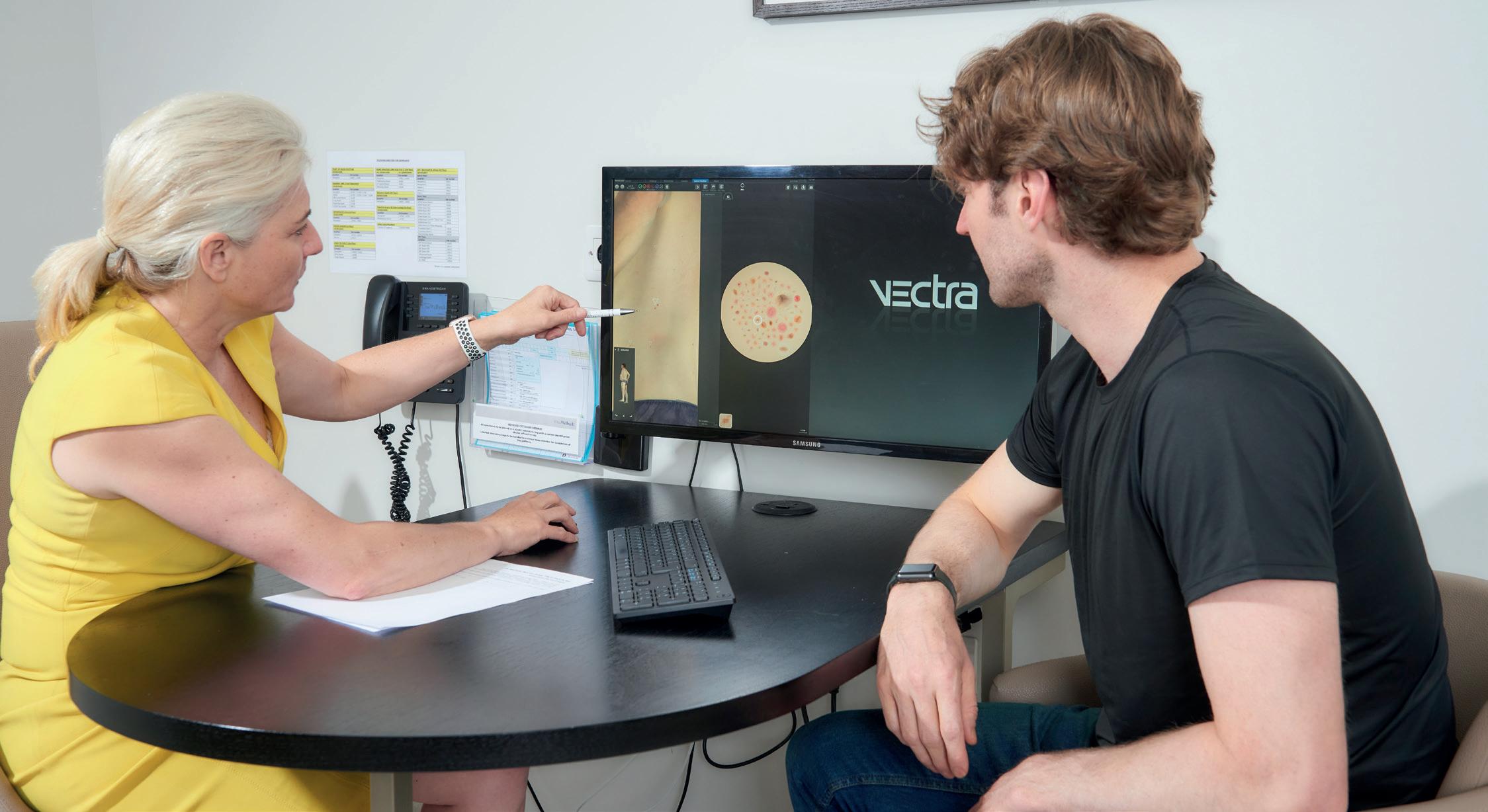
Our mole-mapping machine allows a full 360-degree view of your skin. This will document all your moles in great detail and the images will be stored for molemonitoring purposes. Individual moles can also be examined in greater detail using a microscopic light called a dermatoscope. All the images are examined by a dermatology consultant and stored securely. Artificial intelligence is then used to flag up any changes to moles when mapping is repeated at a later date. Mole-mapping will also identify any new moles that have appeared since the previous images were taken.
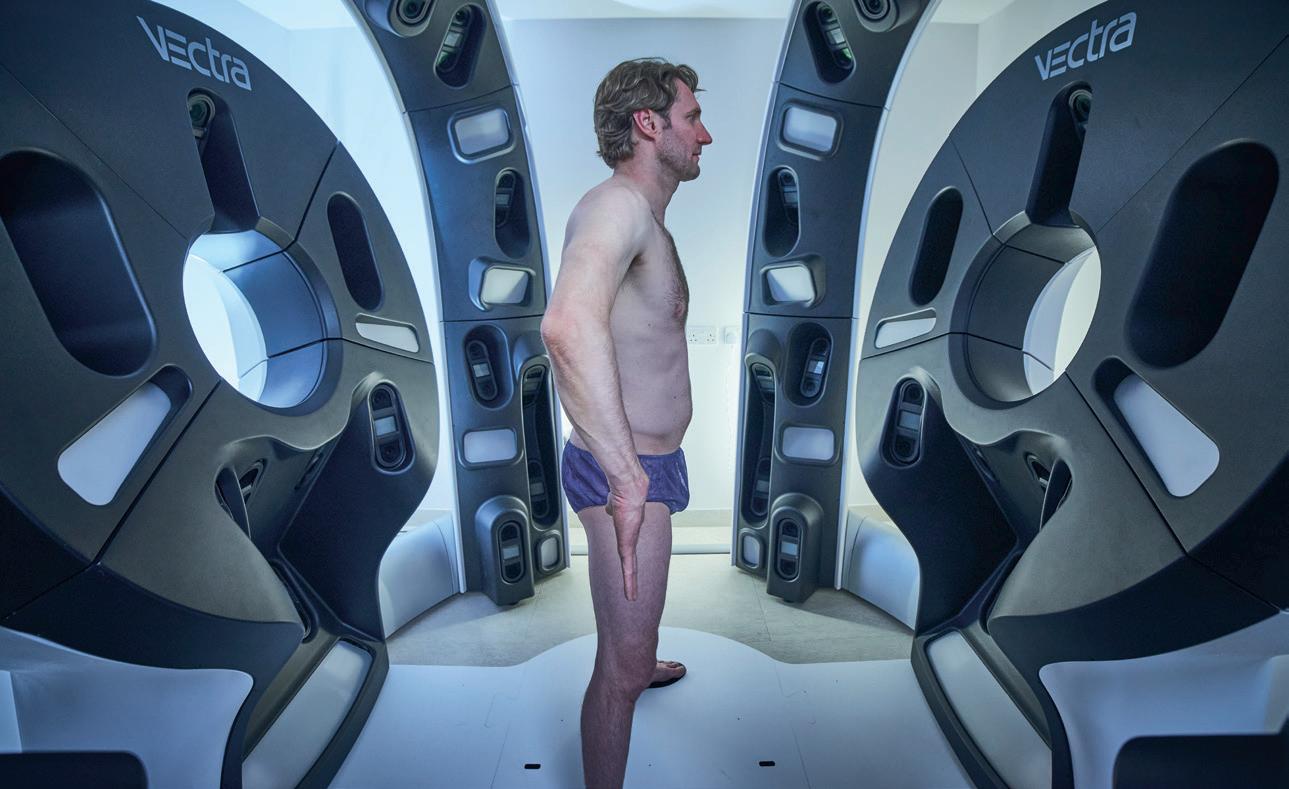
Benefits of regular mole-mapping are that any abnormal moles will be picked up quickly and any subtle changes in your moles can be detected. The earlier that abnormal moles and skin cancers are detected then the quicker they can be removed, leading to a higher cure rate.
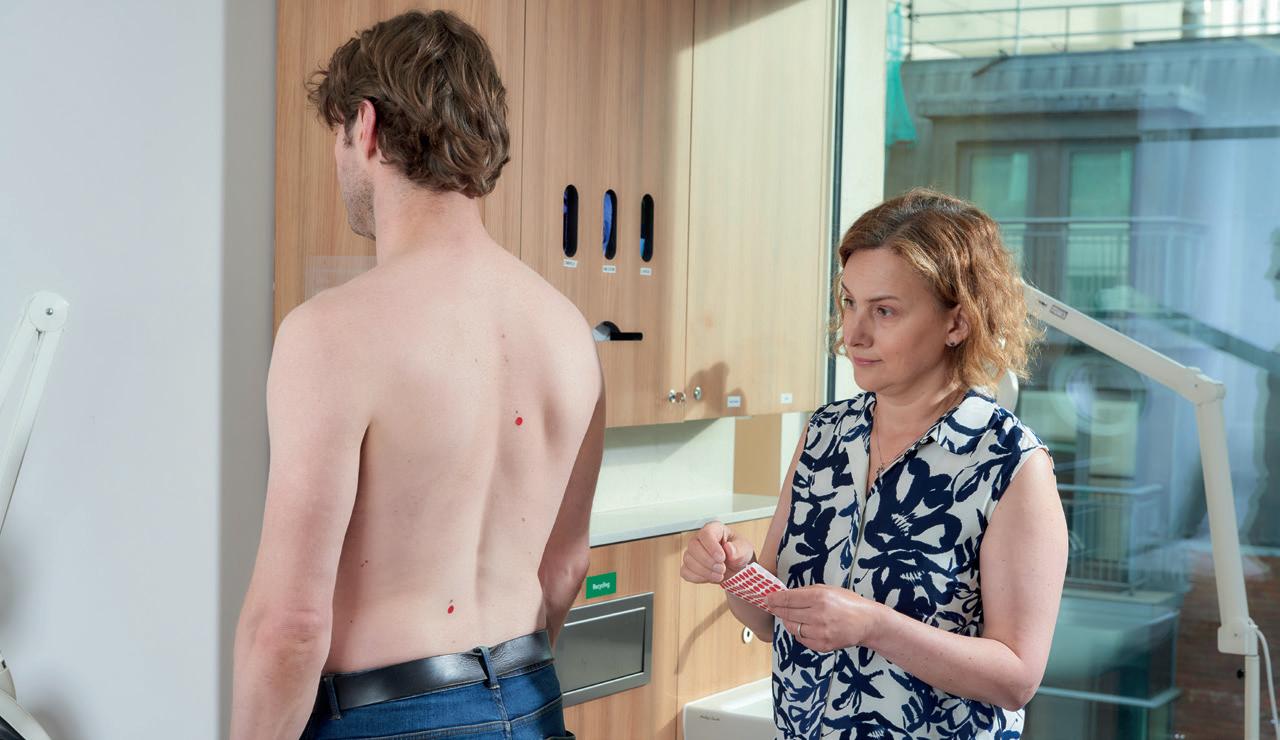
Breast cancer is the most common type of cancer in the UK, causing about 11,500 deaths in women each year. The survival rate from the disease has been steadily improving over time, and now over 75% of all women diagnosed with breast cancer are alive a decade later; and over 98% of women with breast cancers detected by screening are alive five years later.
Screening women between the ages of 40 and 49 reduces the chance of death from breast cancer by 25%, and annual screening after the age of 50 can lessen the chance of dying from the disease by 25-30%. Simply put, the earlier cancer is detected, the quicker treatment can be administered, and the survival rate is much higher.
The 3D screening mammogram at OneWelbeck is the most technologically advanced screening unit in the UK. Breast screening enables early detection and prevention of breast cancer. At OneWelbeck, annual asymptomatic screening is offered to all women over the age of 40.
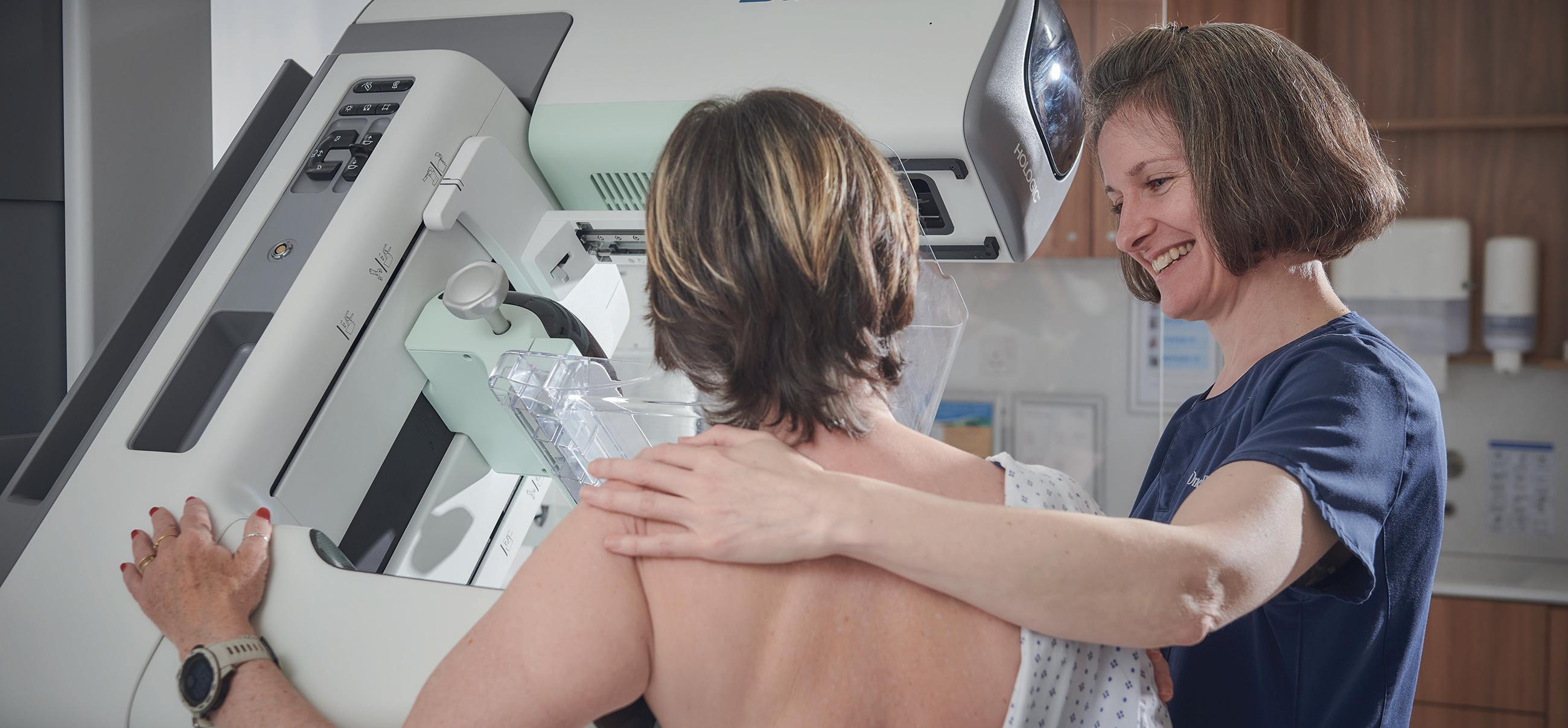
We understand that going for a breast screening mammogram is often a daunting and uncomfortable experience. That’s why we’ve taken every step to ensure you feel at ease and cared for. Our breast screening centre is a calm and relaxing space with no congested waiting areas, purpose-built with patients’ needs in mind.
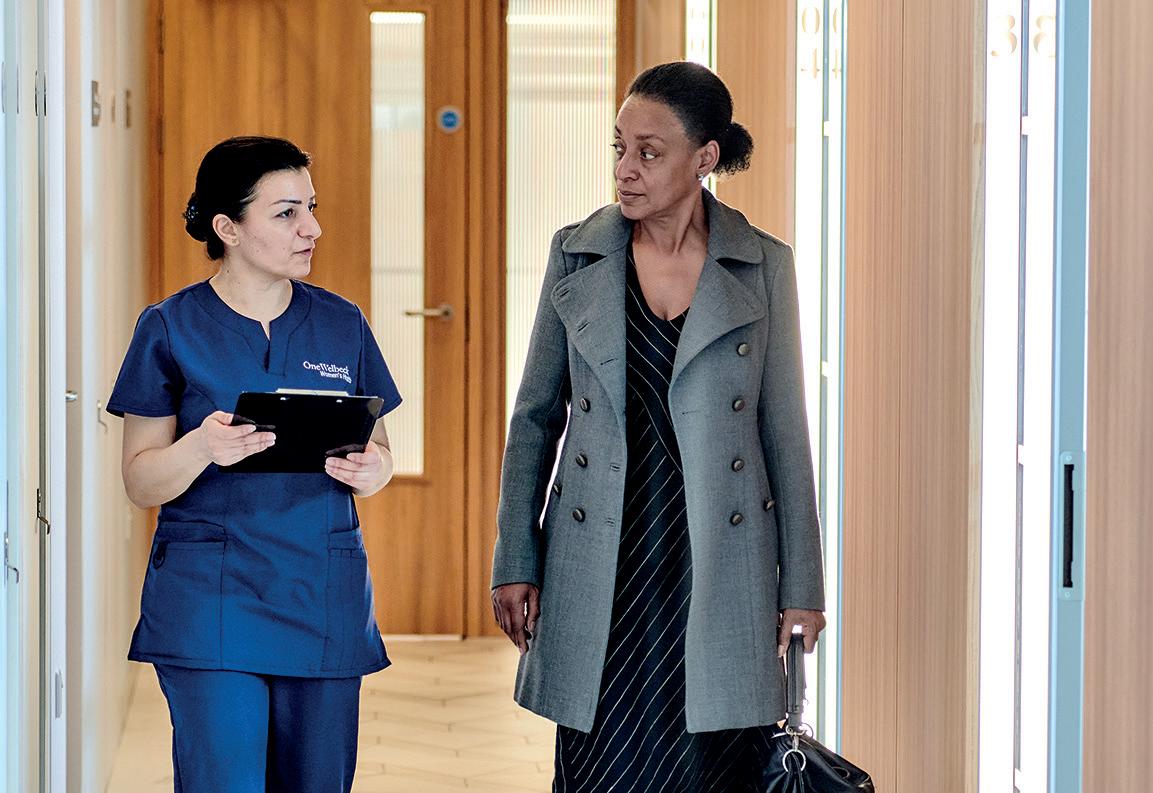
To learn more about our centres and how to refer patients, please contact us at t. 020 3653 2000 w. onewelbeck.com a. 1 Welbeck Street, London, W1G 0AR
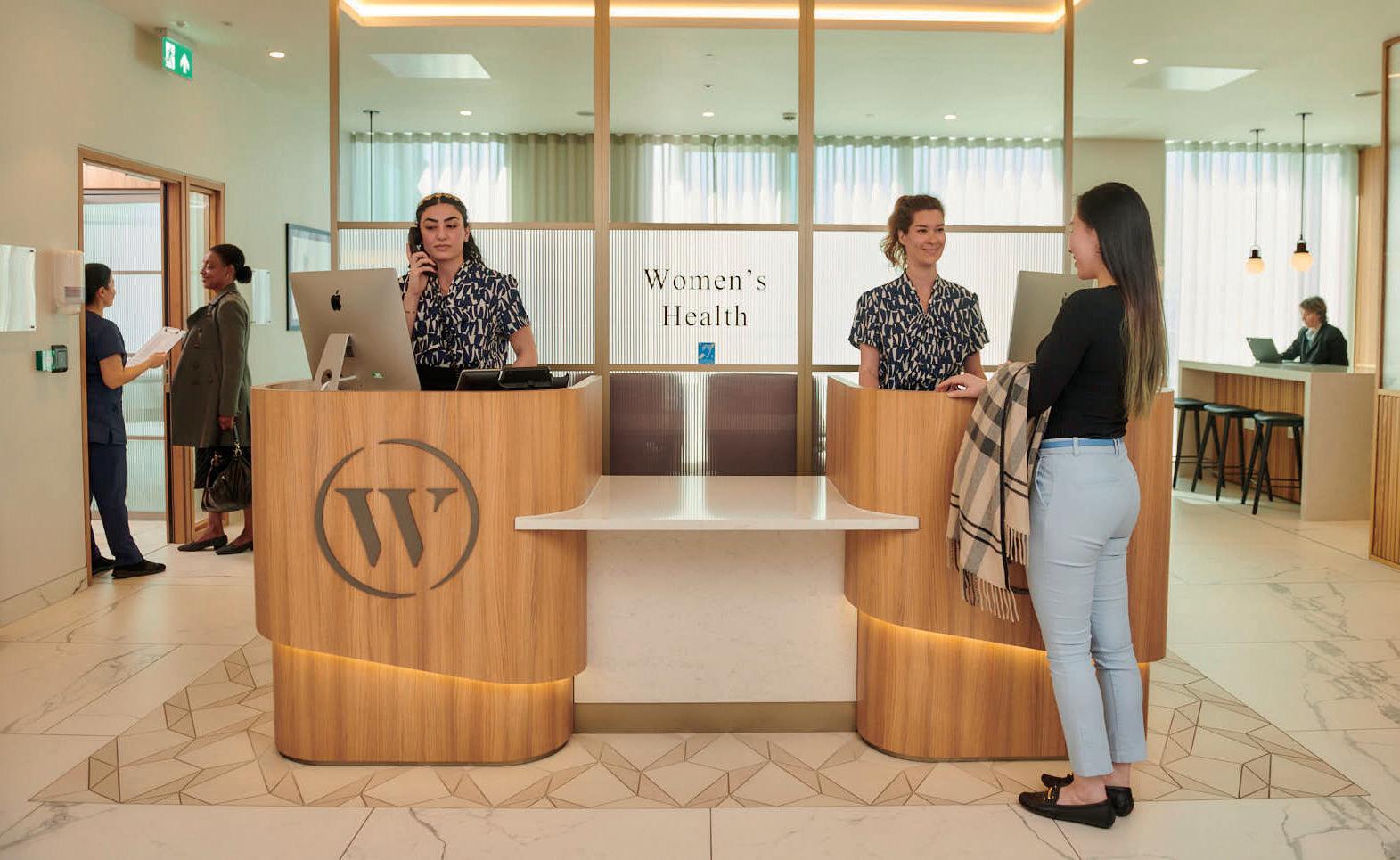
Private patients in London benefit from the combined excellence and specialist care provided by Guy's and St Thomas' Private Healthcare and Royal Brompton & Harefield Hospitals Specialist Care
Royal Brompton & Harefield Hospitals’ merger with Guy’s and St Thomas’ NHS Foundation Trust in February 2021 formed one of the largest and strongest healthcare organisations in Europe. The merger of the two NHS foundation trusts means the creation of a newly expanded Guy’s and St Thomas’ NHS Foundation Trust, with Royal Brompton and Harefield forming a new Clinical Group within the Trust. This means our clinicians and teams continue to build on the partnership work established over the past three years, working more closely together, and generally providing services to the same patients and in the same places as they do now.
With our combined expertise, clinical and academic teams are now unparalleled and will continue to deliver exceptional care to patients, as well as drive research forward into new and better treatments. The merger of the two Trusts provides a once-in-a-
generation opportunity to combine leading specialist cardiothoracic services and transform heart and lung care on a national and international stage.
Guy’s and St Thomas’ NHS Foundation Trust is one of the world’s most prestigious and respected teaching hospitals, with a proud history of high-quality care, clinical excellence and innovation that dates back more than 900 years. The Trust is also part of King’s Health Partners, an Academic Health Sciences Centre that pioneers health research and provides high-quality teaching and education.
Our expertise has resulted in life-saving innovations, such as the first blood transfusion in 1818, and the world’s first mitral heart valve replacement on a beating heart in 2014.
We have been recognised as one of the World’s Best Smart Hospitals and listed top UK provider by Newsweek in 2022 for our state-of-the-art digital imaging technology to improve patient care and outcomes.
Private patients benefit from the combined expertise provided by Guy’s and St Thomas’ Private Healthcare and Royal Brompton & Harefield Hospitals Specialist Care with greater access to our world-leading expert heart and lung care, the latest technology and innovations.
Guy’s and St Thomas’ Private Healthcare provides a unique combination of world-class complex care and medical services for adults and children, offering lifelong care for the whole family. With consultant-led care, and support from multidisciplinary
teams, private patients are in safe and caring hands. Conveniently located in central London, patients can enjoy the comfort of a private facility and modern inpatient rooms that provide stunning views across the River Thames and the Houses of Parliament, and many of London’s iconic landmarks.
Our complex care specialties include cardiology, respiratory, thoracic and vascular surgery. We also have the largest adult and children’s renal transplantation programme in Europe, as well as a comprehensive range of services in paediatrics, fertility, maternity gynaecology, general surgery and medicine.
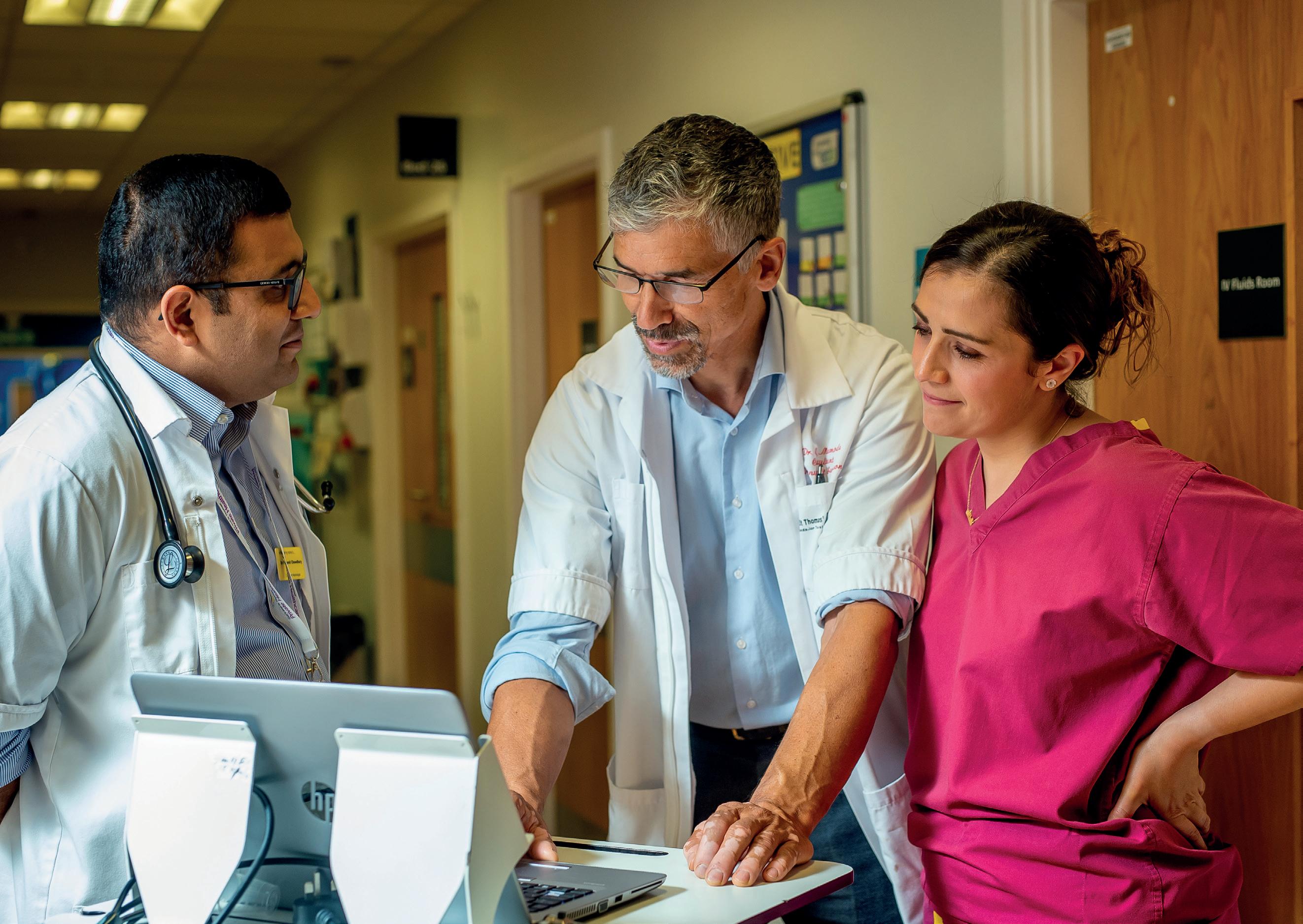
Evelina London Children’s Hospital
Evelina London, as one of only two specialist children’s hospitals in London, offers a unique range of medical and surgical services from before birth to childhood and
1 World-renowned consultants and specialist staff, with experience across multiple clinical services, provide outstanding patient care (PHOTO: GUY’S AND ST THOMAS’/ ROYAL BROMPTON & HAREFIELD HOSPITALS)
into adult life. We are honoured to have the Princess of Wales as Patron of Evelina London.
Our comprehensive clinical services range from treatment of routine conditions to complex care for babies and children requiring multidisciplinary support and intensive care. Many of our specialist services are internationally recognised as centres of excellence.
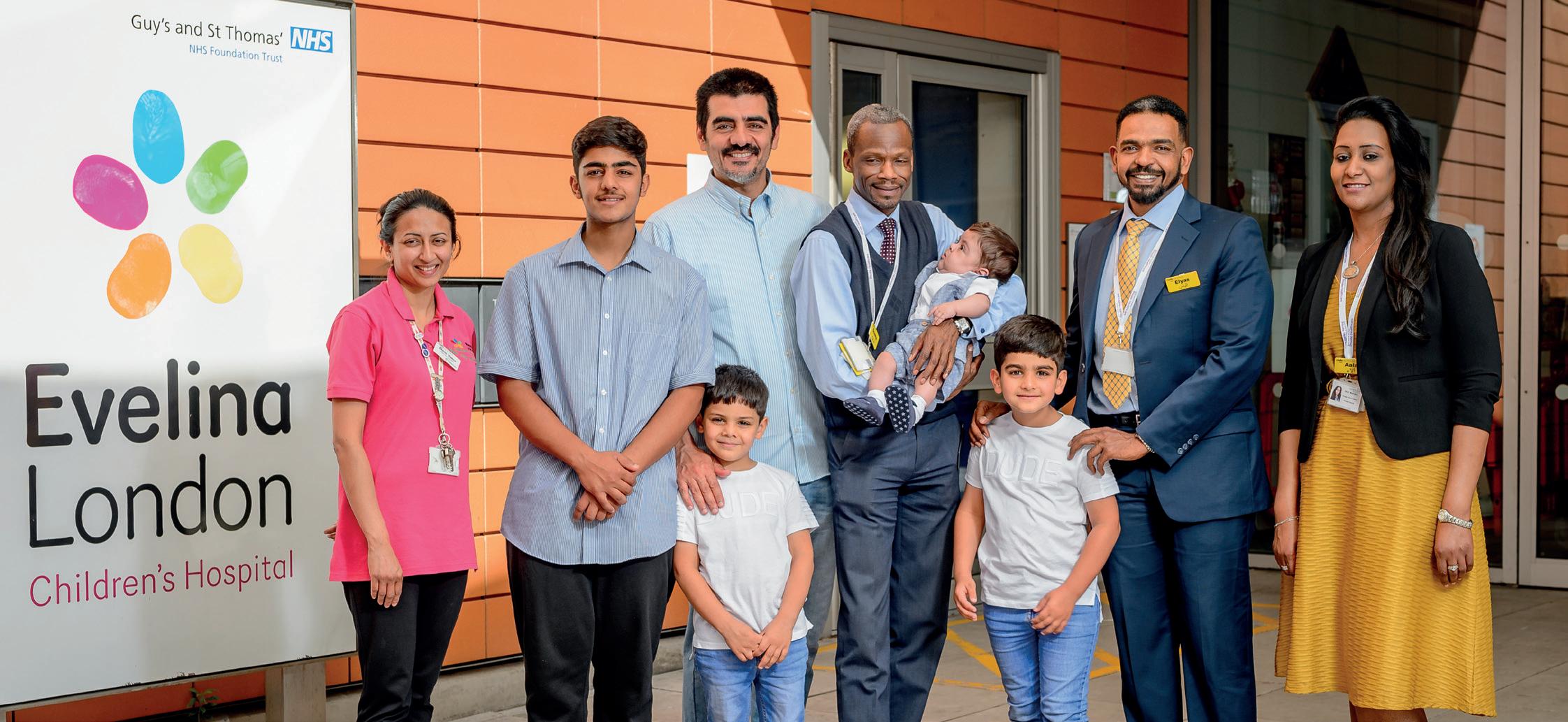
With a long and proud history, Evelina London boasts leading expertise in fetal cardiology, cardiac intervention, cardiac surgery, respiratory services and renal transplantation. Our paediatric renal service is the largest in Europe and provides blood group compatible kidney transplants for private patients. We also specialise in managing complex nephrotic syndrome, renovascular patients and transplant urology for adolescents.
Our innovations include the UK’s first and largest fetal cardiology unit, the world’s first MRI-guided children’s heart valve surgery, and fetal cardiac intervention. We continue to pioneer new techniques in advanced cardiac imaging with a world-leading fetal cardiac MRI programme to identify pre-birth heart issues and lead the first 3D echo programme. Our commitment
to research will transform patient care, with cutting-edge applications such as artificial intelligence and virtual reality.
Our expert consultants provide care for routine conditions to complex care, including:
allergy
cardiology and cardiac surgery
ENT
general surgery and urology
metabolic medicine
neurosciences
ophthalmology
renal transplantation and nephrology
respiratory
speech and language therapy
We have made significant investment with the opening of Sky Ward, our new cardiac and critical care unit, which offers private cubicles and a modern welcoming environment for children and families. Our future plans include a new day surgery unit, which will transform paediatric services and support our vision to improve the lives of children and young people by putting our patients and their families at the heart of everything we do.
Our expertise in women’s services covers the full breadth of treatment for common and complex conditions in fertility, gynaecology and maternity.
The Assisted Conception Unit at Guy’s Hospital is known worldwide as an innovator in fertility treatments. It is one of the leading providers of assisted conception techniques in the UK. A wide range of fertility treatments have been pioneered at the unit, including our pre-implantation genetic testing service, which is now one of the largest in the country.
We pride ourselves on the highest standards of personalised care and offer all common assisted conception techniques, including in-vitro fertilisation (IVF) and intracytoplasmic sperm injection (ICSI), donor treatments and fertility preservation (including ovarian tissue cryopreservation) for cancer patients. Our highly experienced teams of consultants, nurses, embryologists and counsellors are experts in investigating, assessing and treating infertility and provide dedicated support throughout the patient’s fertility journey.
We provide a comprehensive range of gynaecology services, from routine check-ups to assessment, diagnostics, and treatment. Our renowned team of consultant gynaecologists perform low-risk procedures to complex surgery and provide services for reproductive medicine, recurrent miscarriage, uterine fibroid management, endometriosis, pelvic pain and urogynaecology.
The Westminster Maternity Suite has been offering private maternity services for over 25 years. As part of one of the UK’s most comprehensive and highly regarded NHS teaching hospitals, our highly skilled team expertly manage a range of pregnancies with access to full intensive care facilities should the need arise.
The co-location of maternity and paediatric services at Evelina London means women and children receive a comprehensive private healthcare service with a full spectrum of world-leading medical and surgical care at one location. Our obstetric consultants work closely with fetal and paediatric clinicians, supported by experienced multidisciplinary teams to provide complete care for mother and baby at every stage.
Our renal and transplant service has been a leader in kidney care since the 1970s, and is internationally recognised as one of the largest and most established renal units in the world. We have a long history of providing comprehensive live donor transplantation and a special interest in complex transplant cases in adults and children, which attracts referrals from around the UK and internationally.
Our services include the UK’s largest antibody incompatible transplant programme for adults, and the only such programme for children. It was the first service in the UK to offer robotic transplantation and also routinely performs robot donor nephrectomy. We also care for renal failure patients with urology problems and have specialist expertise in complex transplant urology reconstructive surgery.
Other specialist services include all aspects of renal care, including comprehensive diagnostics and treatment with subspecialist clinics including vasculitis, lupus, polycystic kidney disease, tubular disorders and other rare renal diseases. We have a large and successful haemodialysis and peritoneal dialysis programme and can offer a comprehensive service to accommodate overseas patients.
Guy’s and St Thomas’ has one of the largest cardiovascular centres in the country, providing comprehensive cardiology, cardiac and vascular services. Our history of innovation includes the first congenital heart disease interventions, coronary bypass grafting surgery and the world’s first transcatheter mitral valve replacement procedure which was performed at St Thomas’ in 2013.
Our unit is at the forefront of pioneering cardiovascular treatment, leading the way in a number of procedures such as transcatheter aortic valve implantation (TAVI). We continue to pioneer with a multidisciplinary specialist valve clinic to improve patient outcomes by integrating care pathways to deliver
expert care, accurate diagnosis and timely referral for intervention. Our consultants lead in research, developing new imaging and technical solutions to otherwise complex clinical problems.
Our unique respiratory service offers life-changing treatment for patients with acute severe heart or lung failure with a variety of life support technologies, including basic and advanced conventional ventilation, as well as extra-corporeal membrane oxygenation (ECMO) support.
Our intensive care unit (ICU) provides full multiple organ support to patients with a variety of medical and surgical problems and accommodate in-ICU rehabilitation as part of their stay. Care is provided by an experienced multidisciplinary team with significant expertise in all forms of acute lung pathology, combining novel treatment approaches with rehabilitation on ECMO that has enabled many patients to survive.
Royal Brompton & Harefield Hospitals
Specialist Care is based across three convenient London locations. Private patients can choose to be treated at the Royal Brompton Hospital in Chelsea, Harefield Hospital in Middlesex, or at our dedicated outpatients and diagnostics facility in the Harley Street Medical Area.
Prestigious achievements include multiple awards in recognition of our world-class specialist heart and lung care services and in 2022 we continue to been named in Newsweek’s list of world’s best heart hospitals. The hospitals have also won an International Medical Travel Journal award as the best specialist international patient centre in the world.
Royal Brompton & Harefield Hospitals
Specialist Care is the largest specialist heart and lung centre in the UK. Our hospitals are known throughout the world for their expertise, standard of care and research success. From our diagnostic specialists, to our doctors and nurses, every member
of our multidisciplinary team has dedicated themselves to a lifetime of advancement in this field. Their knowledge and experience in cardiothoracic care is second to none.
Our team of expert consultants can provide support in:
cardiology
cardiac surgery
intensive care
respiratory medicine
thoracic surgery
vascular surgery
paediatric care
diagnostic services and outpatients clinics
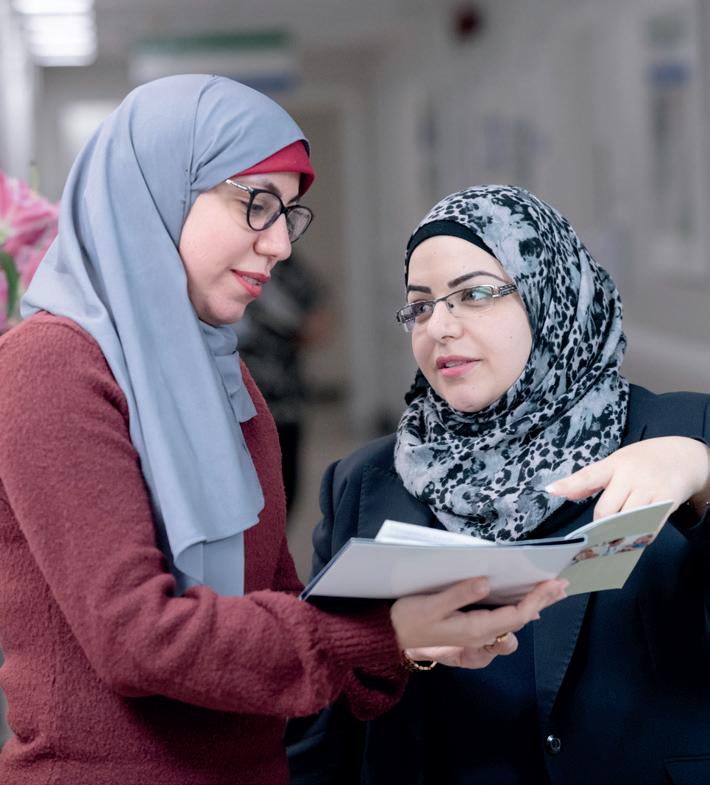
comprehensive clinical support
As a large post-graduate teaching centre, Royal Brompton & Harefield hospitals can offer the very best care, 24 hours a day, with the benefit of onsite support services. Every patient can be confident that each decision made for them is founded on the most cuttingedge research available. We provide access to the most comprehensive range of advanced surgical, medical and diagnostic facilities. No matter where a patient’s treatment journey takes them, our world-leading experts and multidisciplinary team remain close by their side, reassuring and guiding their complete journey of care – as we have been for over 100 years.
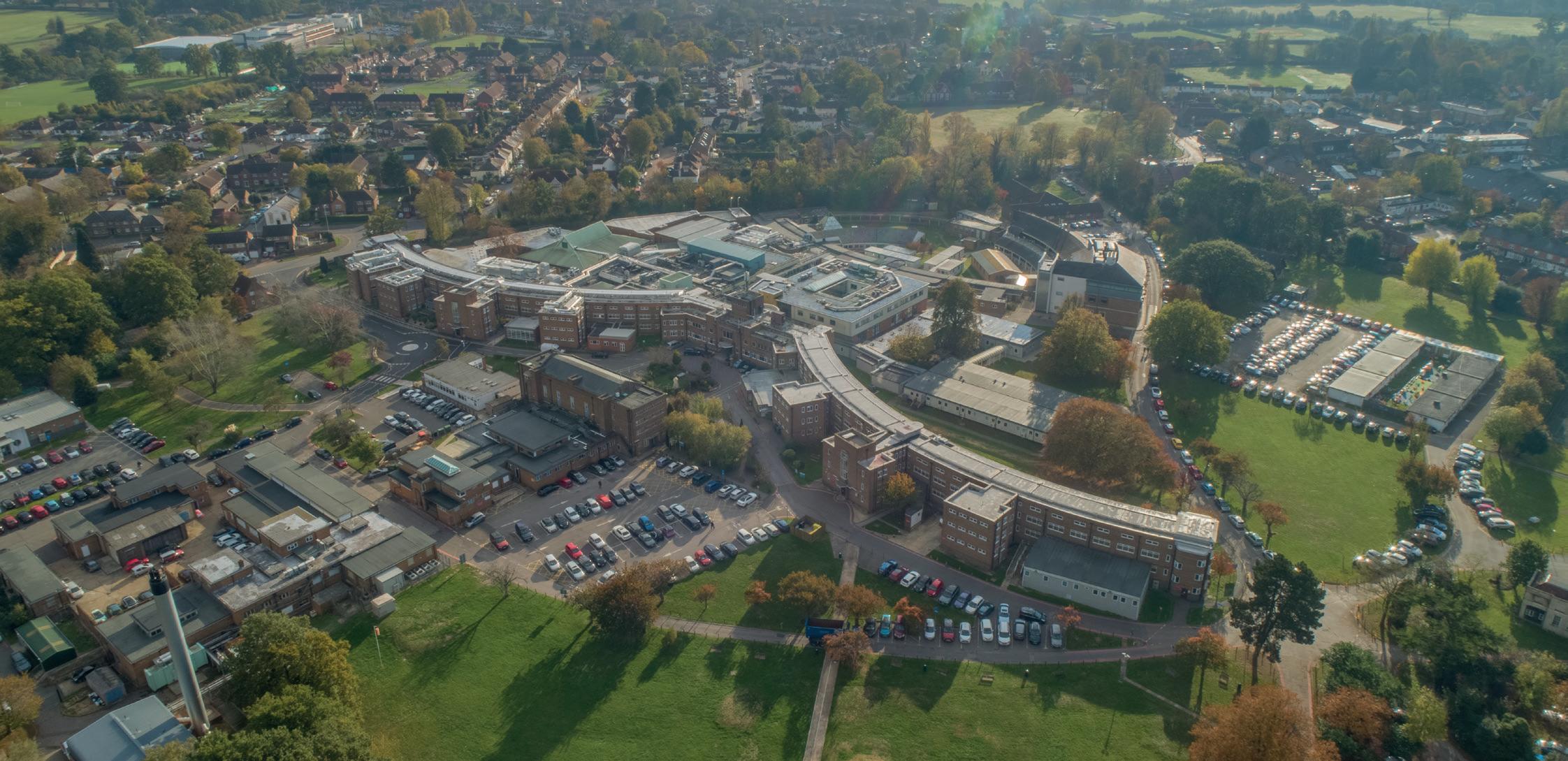
Nestled in the heart of Chelsea, Royal Brompton Hospital was founded in the 1840s and is at the forefront of advancing heart and lung care. In its first decades, the hospital was supported by kind benefactors, including the Royal Family and the author Charles Dickens. Royal patronage has continued and the main building, Sydney Wing, was opened in 1991 by Her late Majesty the Queen. In the same year, the hospital was granted a Royal Charter.
The hospital has an international reputation for the treatment of lung disease – the result of over 170 years’ experience. It is also an international leader in the treatment of heart conditions, with large research trials leading to significant developments. In May 2022 The Princess Royal officially opened the brand-new, £50m stateof-the-art diagnostic centre, providing the very latest imaging technology services to patients under one roof.
On Royal Brompton Hospital’s private Sir Reginald Wilson Ward, dedicated staff care for cardiothoracic surgery patients, cardiology and respiratory patients in 28 spacious single-occupancy, en-suite rooms. “We have access to some of the most advanced diagnostic equipment and medical devices in the world,” explains general manager Fred Sendaula.
As a centre of excellence, Harefield Hospital has offered expert heart and lung care for many years. It has a long history of treating international patients. In fact, it was originally established in 1915 to treat injured soldiers from Australia and New Zealand.
Professor Sir Magdi Yacoub established the largest heart and lung transplantation programme in the world at Harefield Hospital. The current hospital building is a late Art Deco design, opened in 1937 by the Duke of Gloucester. Over the years, the hospital has increased in size and been completely refurbished with state-of-the-art facilities.
Harefield Hospital boasts modern private inpatient and outpatient areas with diagnostic suites. Juniper Ward is the dedicated private inpatient ward, offering 16 modern rooms with en-suite bathrooms. “We can arrange same-day or short-notice appointments with our respiratory and cardiac consultants. Our rapid diagnostics service offers MRI, echocardiography, CT, lung function and non-invasive tests,” explains Gerri Hamer, general manager for private patients.
Based in the renowned Harley Street Medical Area, the recently expanded Wimpole Street facility is Royal Brompton & Harefield Hospitals Specialist Care's central hub, offering outpatient and diagnostic care for patients with heart and lung conditions. In addition, practicing privileges are offered to other physicians and physiotherapists, who are not normally based at Royal Brompton and Harefield hospitals.
At 77 Wimpole Street, private patients are offered a range of advanced diagnostic tests on the same day as their appointment with our experts, ensuring maximum convenience in their care. Zohreh Palmer, general manager, ensures 77 Wimpole Street is a top location for patients: “We have the leading cardiac and respiratory specialists working here, and we recently welcomed colleagues from Guy’s and St Thomas’ to provide comprehensive women’s health services at the centre.”
Services offered include: same-day consultations for respiratory and cardiac conditions; the latest imaging scans, MRI, CT and PET-CT, including Rubidium cardiac imaging; non-invasive cardiology, including cardiac monitoring, exercise tolerance tests and ECG; other diagnostic tests, such as echocardiography, lung function, chest x-ray, and sleep studies.
Across our hospitals, dedicated international patient teams are available to help by providing tailored support for each patient.
The team of international patient coordinators are fluent in Arabic, and help ensure that the patient’s cultural, religious and language needs are met. If other languages are required, a professional interpreter is present; if there are any queries, international patients can depend on the team for support.
The teams regularly liaise with embassies and international contacts and advises on referrals – such as which consultant is most appropriate for a patient’s needs – and also provide support with arranging appointments and admission to the hospital.
Each hospital also offers support for the religious and spiritual needs of patients, their relatives and friends. A multifaith prayer room offers quiet spaces to pray or reflect, with prayer mats and a male/female divider available.
We want every patient to access the latest heart and lung care available, wherever they are in the world, and we believe the key to achieving this is professional development. That’s why we have created our new website –rbhh-education.co.uk – a one-stop resource with all our educational content and training opportunities.
Healthcare providers across the globe can access:
Events: run by Royal Brompton and Harefield hospitals, as well as all external events that relate to heart and lung care, such as virtual study days and conferences;
Expert Talks: online webinars delivered by our world-leading specialists on the latest treatments, innovations, surgical techniques and treatment guidelines;
Courses: a range of in-depth online courses developed by our experts, from cardiac imaging to surgery and medico-legal training; Bespoke training opportunities: including our clinical fellowships, clinical observerships, consultancy and collaboration opportunities, visiting doctor programme and mentoring programme.
Our overseas partners can access intensive clinical education programmes to further develop their expertise in certain interventional specialities. Programmes are designed to help training clinicians integrate into the team so they can maximise their learning outcomes and meet development needs.
To find out more about our specialist services, contact us:
Guy’s and St Thomas’ Private Healthcare
T: +44 (0)20 7188 5197
E: privatepatientenquiries@gstt.nhs.uk www.guysandstthomasprivatehealthcare.co.uk
Royal Brompton & Harefield Hospitals Specialist Care
T: +44 (0)20 3553 3180
E: privatepatients@rbht.nhs.uk www.rbhh-specialistcare.co.uk
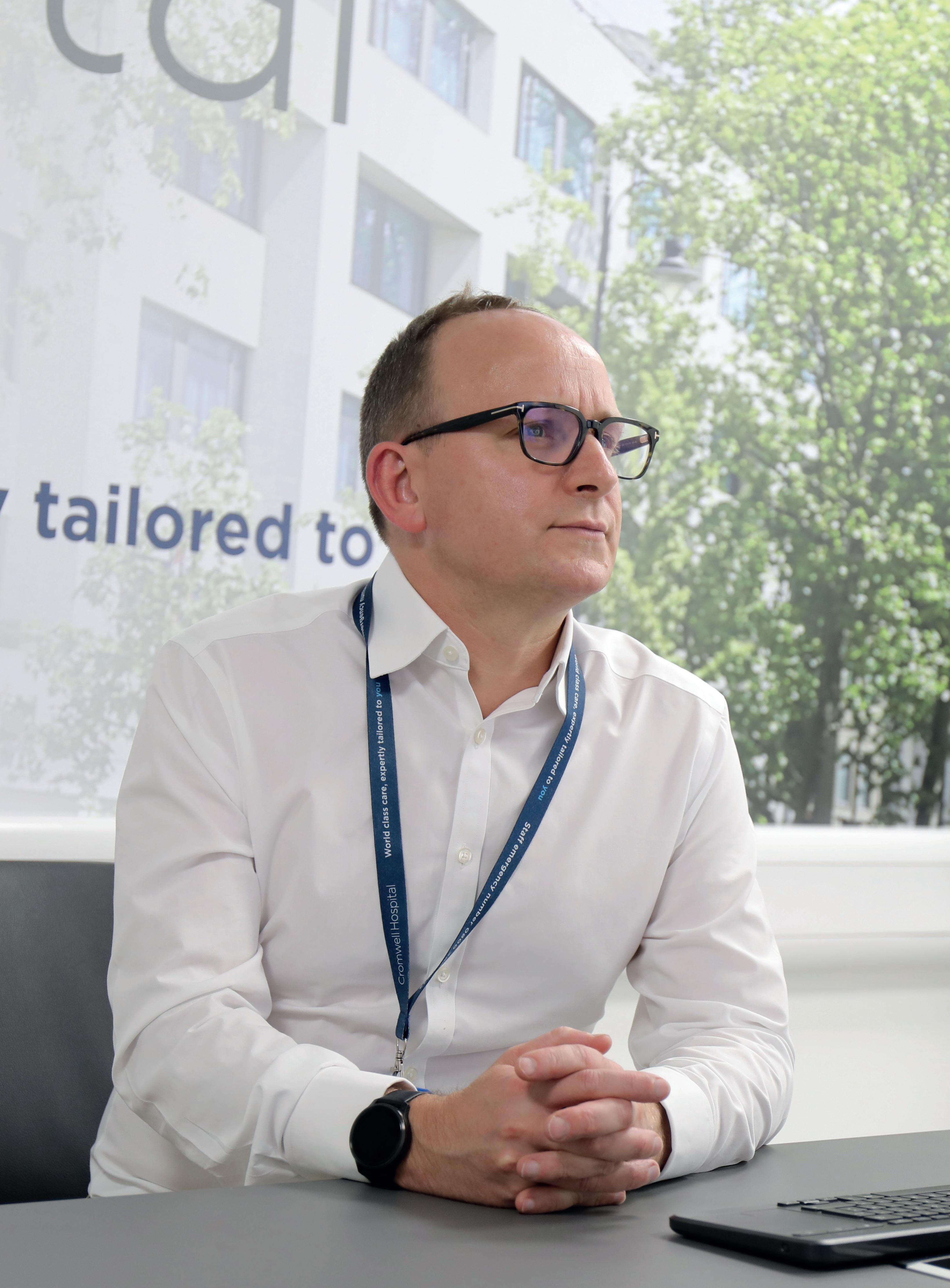
Consultant Oncoplastic Breast Surgeon
Giles Davies discusses Cromwell Hospital's leading-edge services for breast cancer patients
What is your role and speciality at the Cromwell Hospital?
I am a Consultant Oncoplastic Breast Surgeon, offering patients breast cancer surgery and reconstruction. I’m the director of breast surgery at the Cromwell, so I sit on the hospital’s medical advisory board and run the surgery side of the unit, and I am also chair of the cancer board.
How is the Cromwell Hospital leading innovation in cancer treatment, and what new technologies and developments can you tell us about?
In particular, there have been two or three main developments over the past couple of years. One has been our partnership with GenesisCare, a US-based radiotherapy organisation, which has brought us innovative
precision radiotherapy services. These include stereotactic radiotherapy, which is a guided radiotherapy for hard-to-reach areas, and MRI-guided radiotherapy services. Our precision radiotherapy involves using novel coils, which are little markers that can show the site of a tumour, allow us to remove them within one-millimetre accuracy. We are the biggest unit in London for this kind of surgery.
We also have one of the biggest cancer multidisciplinary units in London’s independent sector, enabling us to oversee and review the quality of the cancer treatments we provide. The membership of that team includes not just doctors, but also specialists, palliative care nurses, clinical nurse specialists, holistic practitioners, pharmacists – a wide spectrum of people that all provide valuable input into a patient's care.
We are also piloting an innovative symptom-tracking app, which monitors patients continuously, allowing us to have remote oversight of a patient’s symptoms during and after treatment. For example, I recently performed a mastectomy and reconstruction on a 38-year-old and, using the app, I can see how well she is sleeping. I can also stay informed that her pain levels are going down or if she registers a high temperature. If there are any changes then I am alerted by the app, which is very comforting for patients to know during their recovery and boosts their confidence.
I am currently leading a telemedicine suite as well, which is a development from our remote patient interactions during the Covid lockdowns. The Cromwell already has a large international patient base, and video consultations allow us to meet these patients before they travel to London, to understand their needs, and perhaps to arrange for initial tests to be carried out locally. I have carried out telemedicine consultations with patients in Ghana and Nigeria, and I have seen a patient from India with early breast cancer. We sourced specialised chemotherapy for her in Karachi, which wasn't routinely available. Subsequently, she visited us for surgery and further radiotherapy before returning home, and we followed her up her aftercare in Karachi remotely from the Cromwell.
I have also given remote training to a breast surgeon in Ghana, based on a patient she referred to me, because we also have the ability to communicate and train through the telemedicine suite. I think this model is going to only continue, with collaborative networking for professionals and remote care for patients before and after they come to the Cromwell, allowing us to share our expertise and enhance the overall quality of care.
Can you explain the typical patient journey and treatment steps – such as making their first appointment, testing, diagnosis, treatment and aftercare?
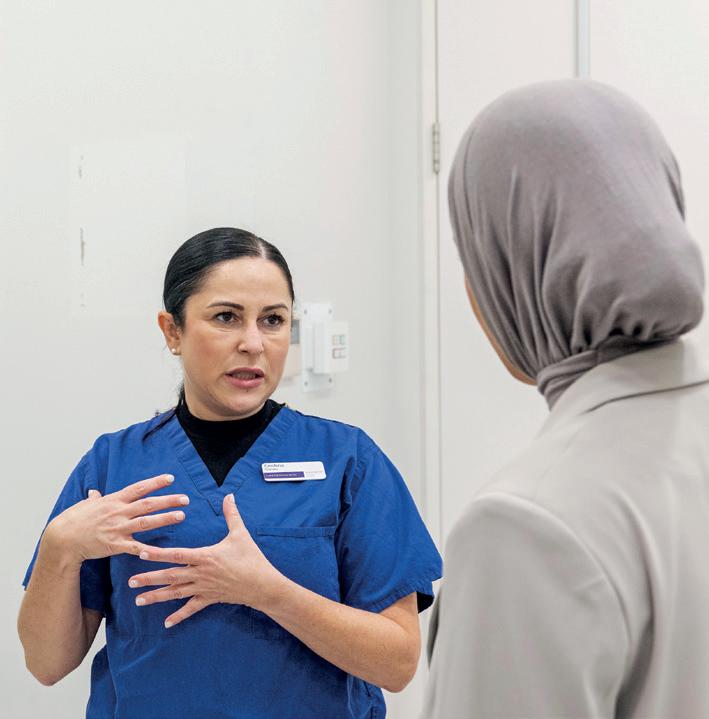
We are very fortunate at the Cromwell in that we have all our services on one site. Many other hospitals have fragmented services, where patients might receive surgery in one place, radiotherapy in another and reconstruction elsewhere, for example. We offer everything under one roof and are able to provide continuity of care from our multidisciplinary team. Our patient feedback indicates that this is an important factor in the treatment journey.
Whenever we see new patients, we always have the capacity for one-stop imaging and biopsy, so if a patient arrives with breast lump, for example, we can offer them imaging and biopsy
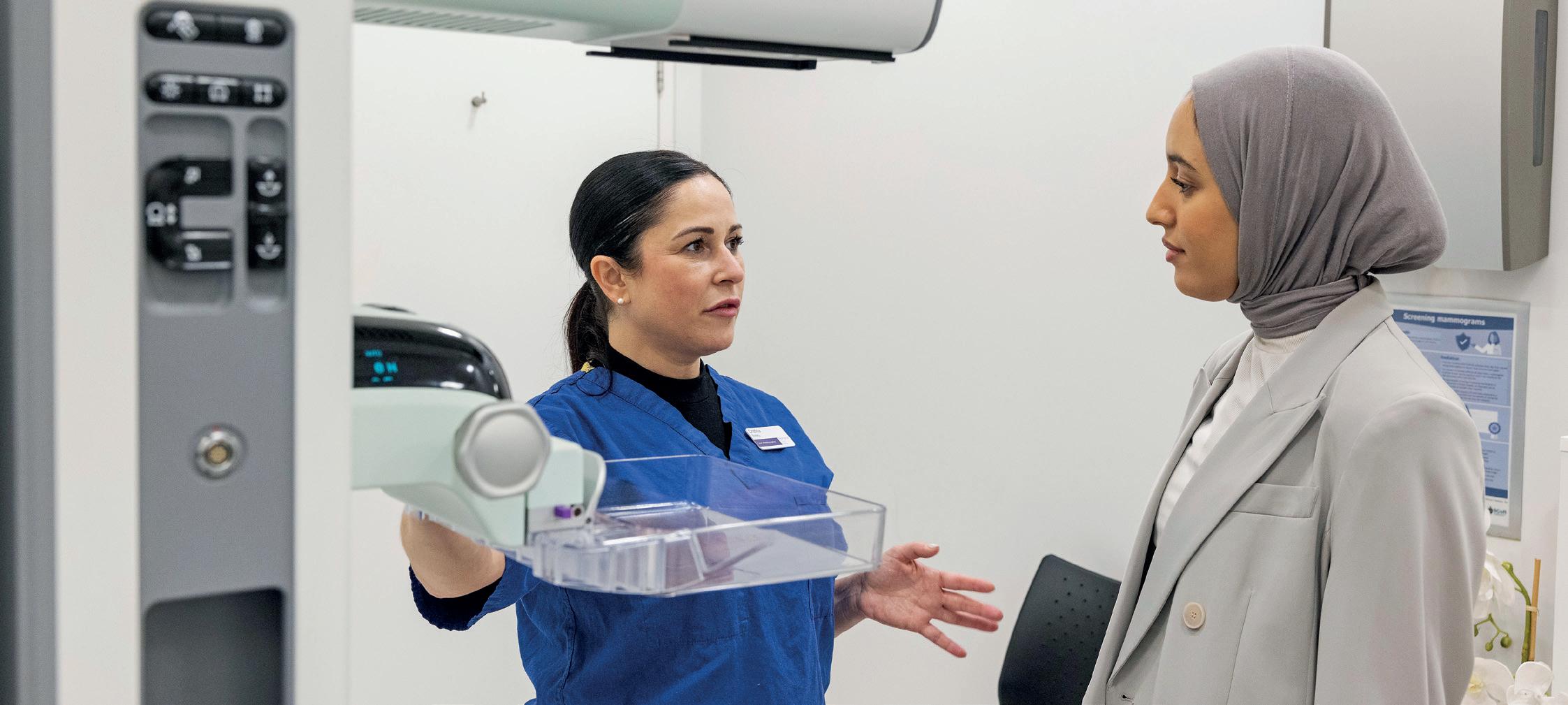
immediately. Rapid diagnostic services are the key, particularly for breast cancer. Imaging results are usually received within hours, so patients will have a good idea of what's going on almost immediately. Tissue biopsies are sent to a laboratory, and we communicate those to patients within 48 hours, often sooner. This fast turnaround leads to treatment starting quickly too.
Following treatment we provide extensive aftercare to support patient recovery.
We have a holistic care team that includes physiotherapists, nutritionists and psychotherapists, all of which are very important in breast cancer care. The counselling services are pivotal, because when you see a consultant and receive a diagnosis of cancer, you may have questions that don't arise immediately or a patient may not have their own support around them. Our counselling services are housed in the mews section of the Cromwell – with traditional coach houses and a cobbled street – which provides quiet and reflective surroundings.
The average age of our breast cancer patients is 48, so we are treating people who are still young, who want to return to work, to their families and the things
they enjoy. To help with this, we also offer a Pilates-based clinical exercise programme following surgery, which is important for the psychological benefits of exercise and reducing the side effects of treatment, as well as focusing on general health and fitness.
Can patients come to you at any point in their journey, such as for cancer recovery support?
Very much so. Not only do we see patients at the start of their journey, we also welcome those who may be seeking a second opinion, right through to people who are literally finishing their treatment elsewhere and requiring aftercare.
Patients that haven’t been treated at the Cromwell can access our rehabilitation services, such as physiotherapy and counselling, and our clinical exercise programme is also available to all, wherever they are being treated. For example, our GenesisCare radiotherapy unit has its own holistic package, with a gym and supportive therapies, including reflexology and acupuncture, that they might not have tried before and that could work for them as part of their rehabilitation.
If you are concerned about your health, or have received a cancer diagnosis and are considering private treatment, contact Cromwell Hospital to learn more about your options: call +44 (0)20 7460 5700 or visit www.cromwellhospital.com/ oncology
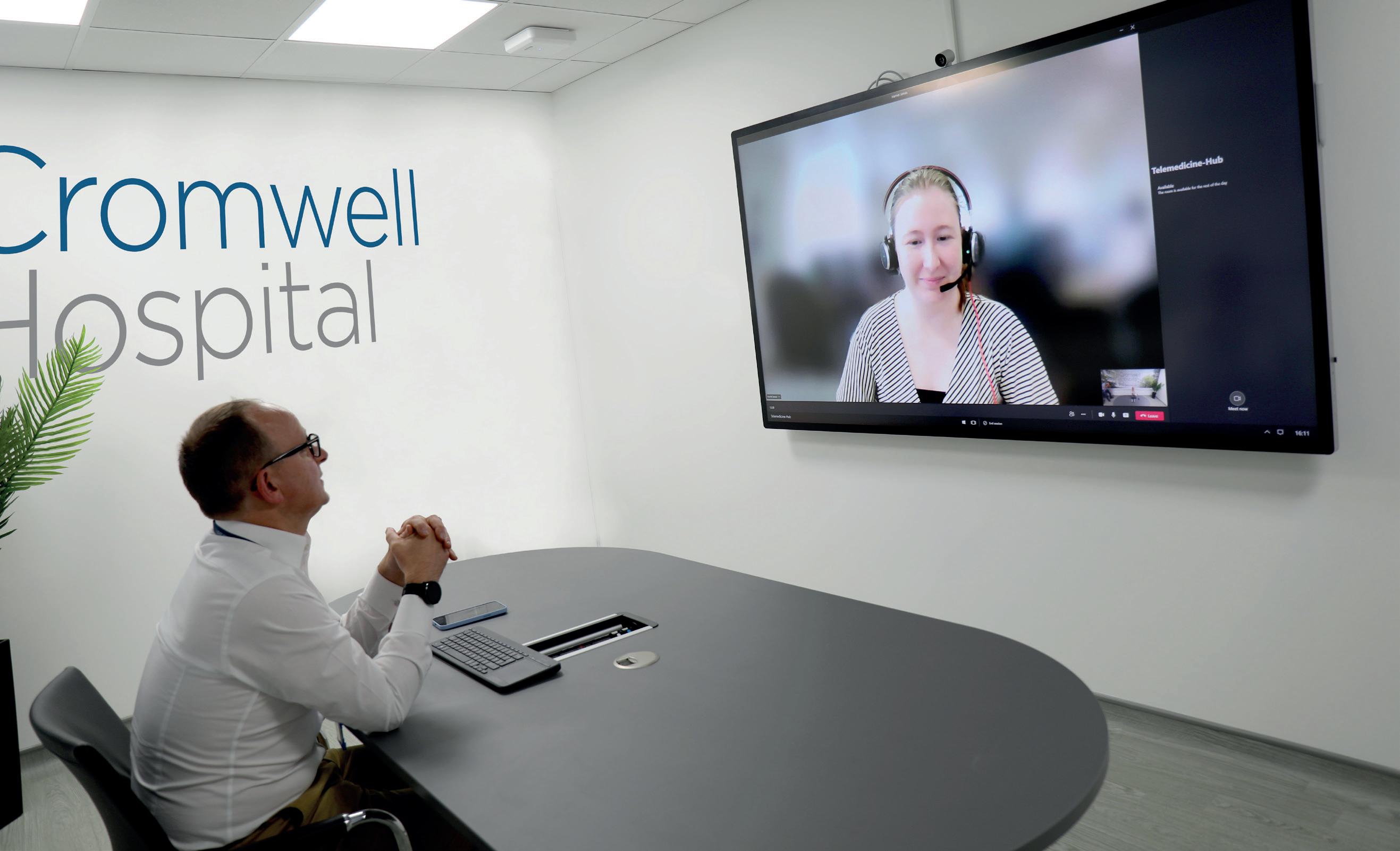
A reluctance to talk about women’s health has meant many women have suffered in silence with sometimes debilitating conditions, rather than seeking help. Thankfully, recent mainstream media coverage of such issues has led to greater openness, not least about the topic of endometriosis.
Prominent women that have spoken about their experiences of endometriosis include music legend Dolly Parton, comedian Amy Schumer and movie actors Susan Sarandon, Whoopi Goldberg and Daisy Ridley. The subject has also been highlighted on screen in the BBC drama Conversations with Friends and in a recent documentary, Below the Belt. The latter, directed by Shannon Cohn, includes among its executive producers former US Secretary of State and presidential candidate Hillary Clinton, who has also suffered from endometriosis.
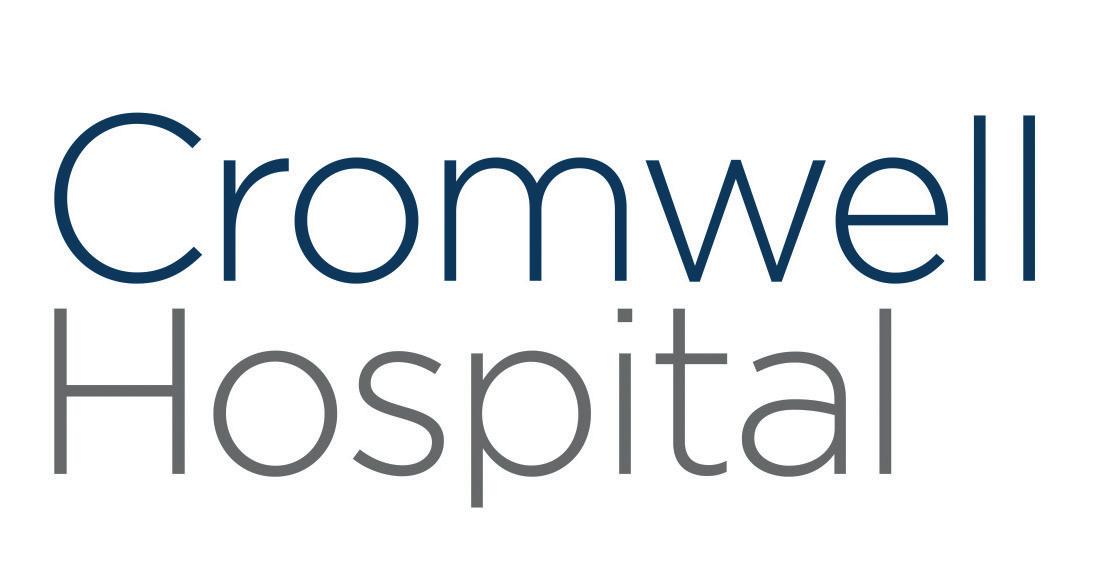
“Young women are becoming more educated about endometriosis due to the welcome increase in media coverage about the condition over the past couple of years, which has been very important,” says Mr Amer Raza, consultant gynaecologist leading the team at the International Centre for Endometriosis at London’s Cromwell Hospital. “Endometriosis wasn’t talked about before and was considered a taboo subject, but high-profile women sharing their experiences publicly has helped to bring about a huge change in awareness. Charities are becoming very active as well. As a result, women are visiting doctors with their symptoms much earlier than previously.”
Endometriosis is a condition where tissue, similar to the lining of your womb, starts to grow in other places, such
Women with endometriosis have often suffered in silence, but increasing openness about the condition has raised awareness and seen more patients coming forward
as the ovaries, fallopian tubes, bowel, bladder and, sometimes, lungs. It can cause significant problems, including pain, problems with your bowels, feeling sick and difficulty getting pregnant. “In some women, endometriosis starts to grow inside the ovaries, which can then start to swell,” says Mr Raza. “This is known as ovarian endometrioma, or a cyst with an endometriosis, which can have an impact on fertility. About 20% of women with endometriosis experience fertility issues.”
There are a range of treatments for endometriosis. Depending on your symptoms, your consultant gynaecologist may recommend a laparoscopy (keyhole surgery) to cut away endometrial tissue.
At Cromwell Hospital, we offer robotic surgery for endometriosis. The da Vinci Xi is used for keyhole surgery and
provides greater precision, control and flexibility when using surgical instruments. Mr Raza says, “the accuracy and precision of the da Vinci system works well for keyhole procedures, such as hysterectomies and complex endometriosis. Using the da Vinci Xi means our patients can leave hospital and recover more quickly.”
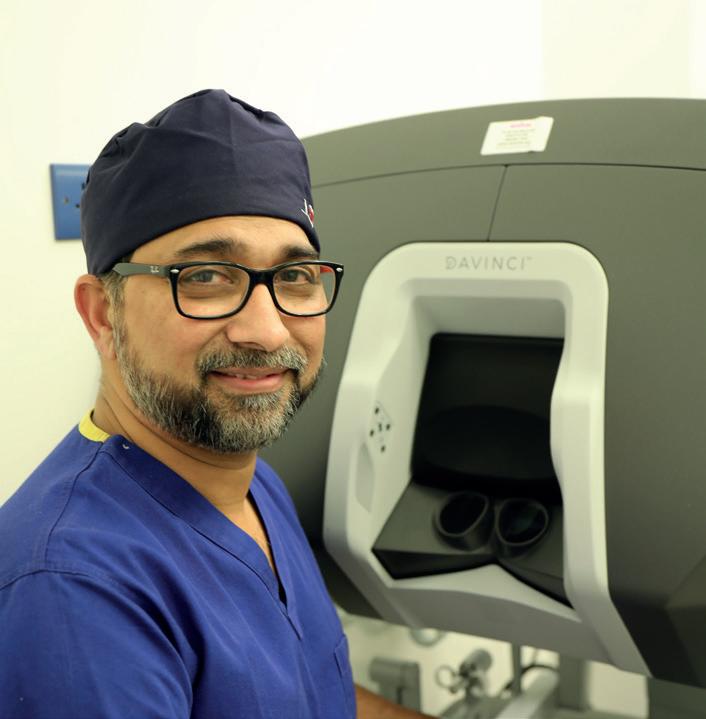
“When a new patient arrives at our clinic, it is most important to gather a detailed history to determine whether they have endometriosis,” explains Mr Raza. “The symptoms can overlap with other conditions that may not be endometriosis – for example, irritable bowel syndrome, which involves bloating and constipation, or bladder conditions. Once we’ve established a history, then examination is the key. A thorough
1 Many women are living with the pain of endometriosis, but a range of treatments are available (PHOTO: SHUTTERSTOCK) / 2 Consultant Gynaecologist Mr Amer Raza leads the team at the International Centre for Endometriosis at Cromwell Hospital (PHOTO: CROMWELL HOSPITAL)

3 Mr Raza and his team use robotic surgery techniques to work with high precision / 4 When a new patient arrives, the first step is to gather a detailed history of their symptoms / 5 Greater awareness of endometriosis means that women are being referred for examination much earlier than before / 6 Treatment plans for international patients can be arranged before their visit (PHOTOS: CROMWELL HOSPITAL)
vaginal examination helps us to feel the nodules of endometriosis in moderate to severe cases.”
In milder cases, examination may not be as effective in making a diagnosis, so the patient will have scans to determine the extent of their endometriosis. “The other main step in our investigation is the transvaginal ultrasound scan, from which we can detect endometriosis in the ovaries. It can also help us to see endometriosis in the back of the uterus, involving the bowel,” says Mr Raza.
“Some patients will also need a pelvic MRI [magnetic resonance imaging] scan, which is a very sensitive and detailed assessment of the pelvis that helps us understand not only the quantity or amount of endometriosis in the pelvis, but also the other organs that are involved.” Where examination and scanning cannot fully diagnose the disease, patients will then require laparoscopy – an operation under general anaesthesia to simultaneously diagnose and treat the problem.
As endometriosis is a hormonal disease, where oestrogen increases the
severity of the condition, most medical treatments are based on hormonal therapies that suppress or reduce the oestrogen. “If mild endometriosis is causing pelvic pain, then treatment with hormones will suffice,” says Mr Raza. “This will include combined oral contraceptive pills, progesterone pills, and even a Mirena IUS (intrauterine system) coil – a hormonal contraceptive inserted into the uterus.”
In moderate to severe cases, where the condition is causing an impact on quality of life, a patient would proceed to laparoscopic surgery, for which robotic surgery techniques are used. Where endometriosis is present around the uterus, around the ovaries or on the pelvic side walls, laser or electrical energy is used to remove the scarring and adhesions inside the abdomen, relieving pain. Mr Raza is highly skilled with robotic surgery, having completed over 100 gynaecological surgeries with the da Vinci Xi at Cromwell Hospital.
“We felt there was a great need for a specialised centre at Cromwell, bringing together under one roof all the endometriosis expertise, such as colorectal surgery, fertility,

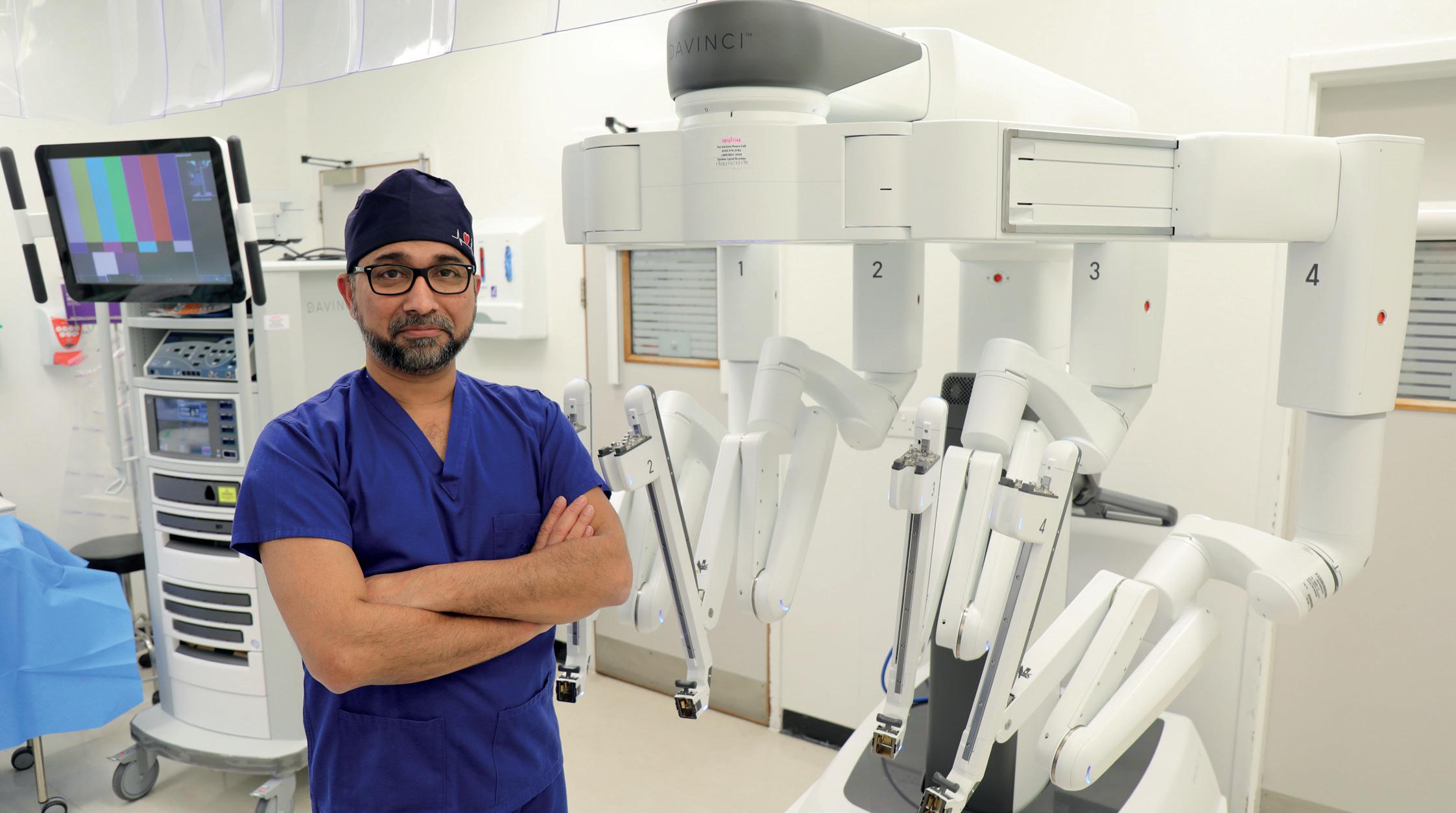
physiotherapy, psychological support and chronic pelvic pain support,” he says. “We provide a one-stop service where a patient can come in, be seen, have their ultrasound scan on the same day and walk away with a provisional diagnosis either confirming endometriosis or excluding it.”
Rico Hayer was diagnosed with endometriosis in 2019, after having suffered with painful periods since she was young. Mr Raza was recommended to Ms Hayer by a friend. Mr Raza was able to explain to her the challenges of endometriosis and, together, they reviewed the best options for her care.
Ms Hayer decided that a laparoscopic surgery would be the best option. Twoand-a-half months after surgery she has found that her periods were now pain-free, thanks to the help of Mr Raza.
“I couldn’t thank the hospital and Mr Raza enough,” says Ms Hayer. “It was just a delight. It was almost like going to a spa. I’m happy to say to all women, my fellow ‘endo warriors’, you don’t have to suffer in silence. You don’t have to be embarrassed of having this condition. Treatment options are available.”
The International Centre for Endometriosis is well suited for overseas patients, whose treatment and recovery plans can be arranged even before they set foot in London.
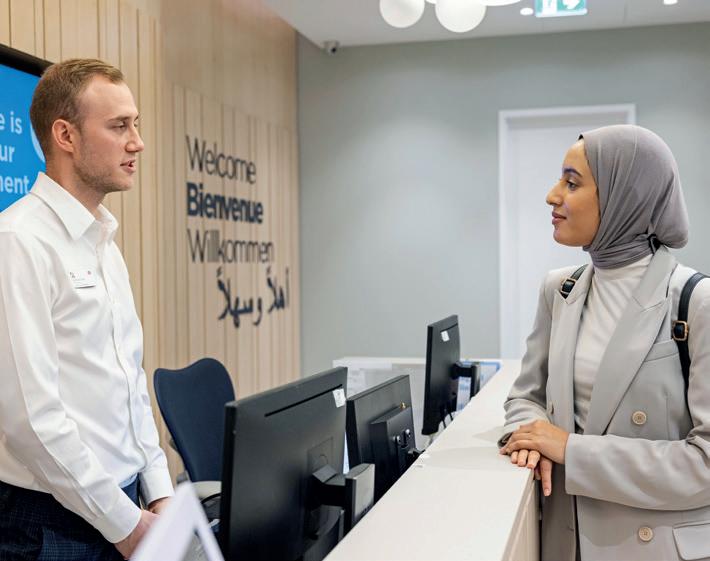
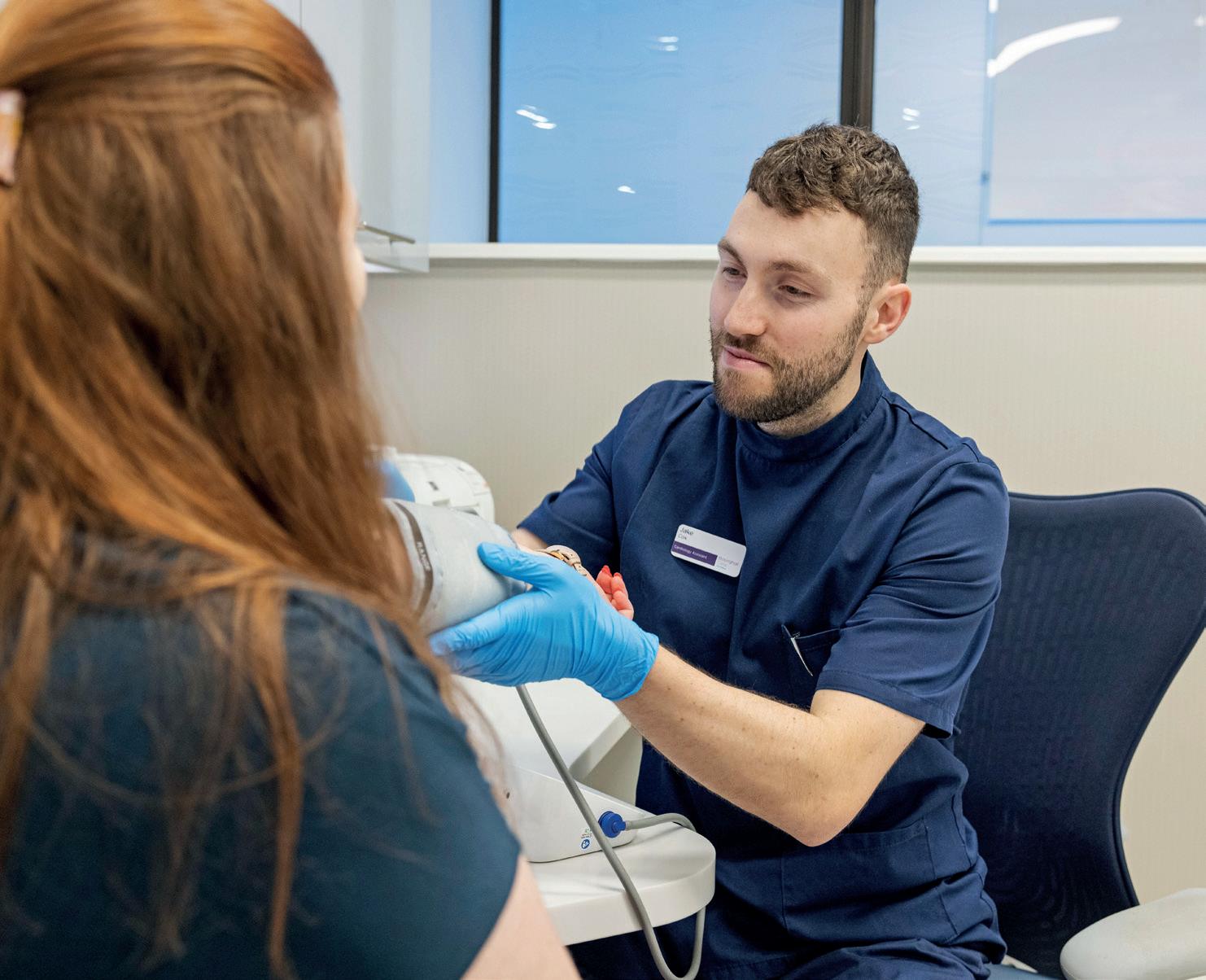
“The patient journey usually begins with an online video consultation, before MRI scans are carried out at their local hospital,” Mr Raza explains. “The images are then transferred to the radiology system at Cromwell and analysed by our endometriosis experts.”
A further video consultation will then take place, during which the scan images can be displayed and discussed, before a decision on surgery is made. If surgery is required then the patient will travel to Cromwell for their operation, for which they can expect to stay in hospital for only one or two nights.
“About 60% of post-surgery recovery happens within the first week, and patients are 80% to 90% recovered after two weeks,” says Mr Raza. “At this point, most patients are able to fly home, where they will receive followups via further video consultations.”
We offer next-day appointments at Basinghall Clinic, our outpatient diagnostic centre in the City, and Cromwell Hospital with our expert gynaecologists to give you peace of mind and rapid access to onward treatment. Along with our endometriosis and menopause management, our services include health-screening programmes for women, fertility treatment, surgical treatment of incontinence and pelvic prolapse and family planning.
We provide a comprehensive diagnostic service for all gynaecological conditions. In most cases we can offer same-day diagnostic tests, including ultrasound. If you receive a diagnosis for a gynaecological cancer, you will be supported every step of the way by your consultant and members of your healthcare team.
For more information about gynaecology services and the International Centre for Endometriosis, contact Cromwell Hospital: call +44 (0)20 7460 5700 or visit cromwellhospital.com/ gynaeclinic
Rated ‘outstanding’ by the Care Quality Commission (CQC), The Royal Marsden is ranked as one of the leading cancer centres in the world. It operates from two centres – in Chelsea, London, and in Sutton, Surrey – as well as its treatment and diagnostic facility The Royal Marsden Private Care at Cavendish Square, situated in the capital’s world-renowned healthcare district. The Royal Marsden is a centre of excellence, with an international reputation for ground-breaking research and pioneering the very latest in cancer treatments and technologies.
Together with its academic partner, The Institute of Cancer Research, London, The Royal Marsden is Europe’s
largest comprehensive cancer centre, with unrivalled cancer expertise and over 2,500 consultants who cover the rarest and most complex cases. Surgical teams at The Royal Marsden are innovators in their field, and the hospital’s radiotherapy department is one of the largest in the UK, delivering more than 75,000 treatments every year.
The Royal Marsden Private Care offers an award-winning service, having won the LaingBuisson Best Hospital Award three times. Private patients are offered additional benefits, including a hotelstyle service, single ensuite rooms and direct access to their treating consultant. A specialist International Advocate Service ensures that all the
The Royal Marsden NHS Foundation Trust, ranked among the world's leading centres for cancer research, offers unrivalled expertise and standards of care
needs of overseas patients are met, both from a cultural perspective and in terms of treatment and care. They work closely with a multinational team of interpreters, including a dedicated Arabic Advocate Service, which can offer one-to-one translations.
HRH The Prince of Wales has been President of The Royal Marsden NHS Foundation Trust for 15 years and regularly visits the hospital to meet with staff and patients. Earlier this year, he returned to the hospital, where he met with patients and observed a type of interventional radiology procedure available only at The Royal Marsden.
The hospital has an international research reputation, with experts revolutionising the way cancer treatment and care is provided, to help extend and improve the lives of people with cancer in the UK and across the world. Experts regularly present at international conferences and are representatives

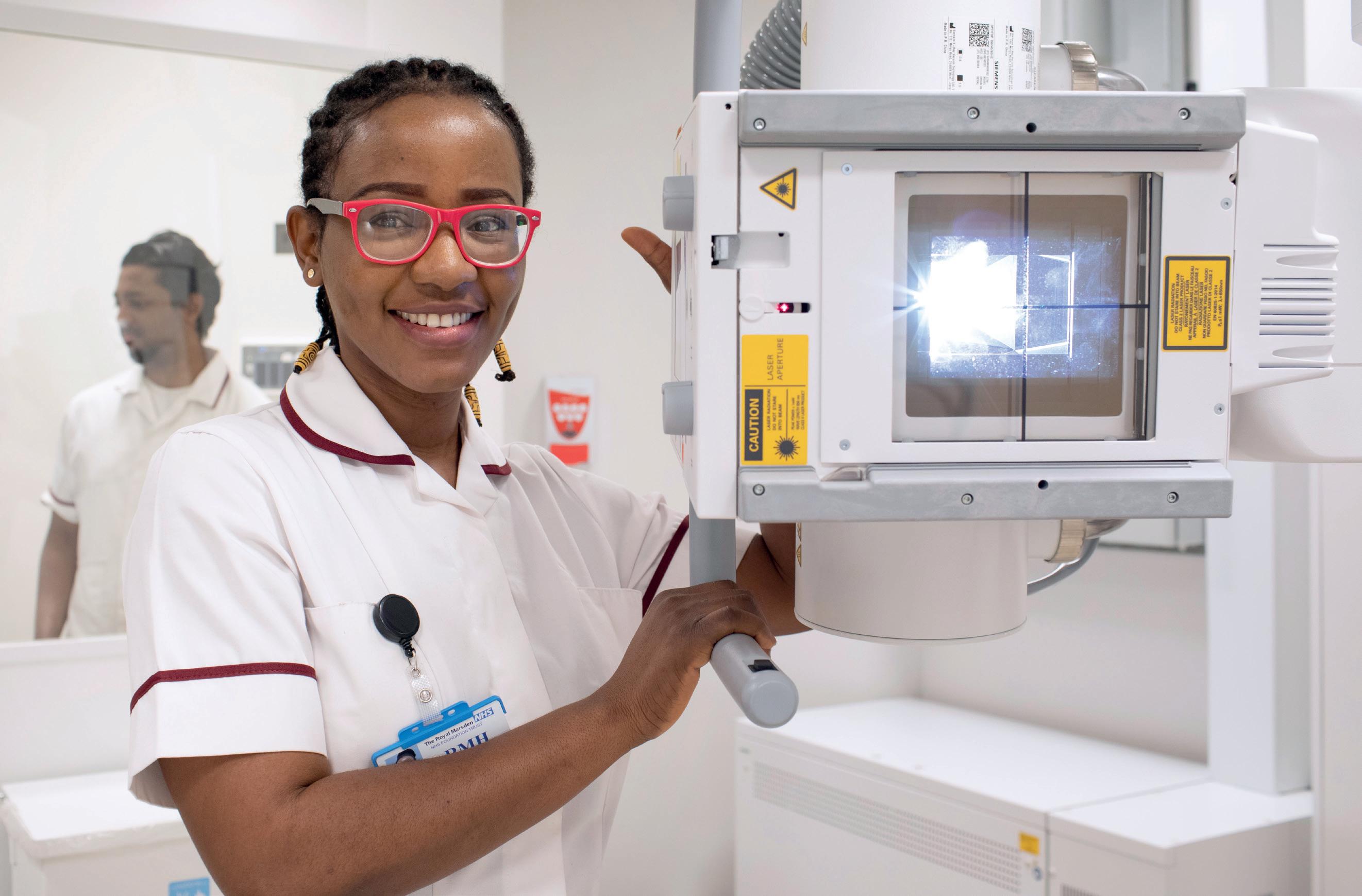
on committees such as the European Society of Medical Oncology and the American Society of Clinical Oncology.
Professor James Larkin is a Consultant Medical Oncologist at The Royal Marsden and lead investigator of several translational studies into melanoma and kidney cancer. His research has been key in the field of immunotherapies, heralding new hope for patients. Thanks to his immunotherapy research, one in two patients with advanced melanoma will now survive for five years or more, with many continuing to live normal lives, cancer-free, for 10 or more years. A decade ago, people with advanced melanoma would have a life expectancy of less than a year.
Professor Larkin and his colleagues are now looking into why immunotherapy works for some, but not all, patients, and are researching emerging types of immunotherapy. For example, the Phase 2 C-144-01 trial recently showed that lifileucel, a tumourinfiltrating lymphocyte (TIL) therapy, could stop or reverse the progression
of advanced melanoma. More than a third of patients on the trial responded well to this innovative type of cellular immunotherapy, which uses the patient’s own T cells to fight cancer.
“These results show that TIL therapy could offer sustained benefits to some patients with advanced melanoma that can improve over time," says Professor Larkin, "which could provide a new treatment for people who currently have no other options.”
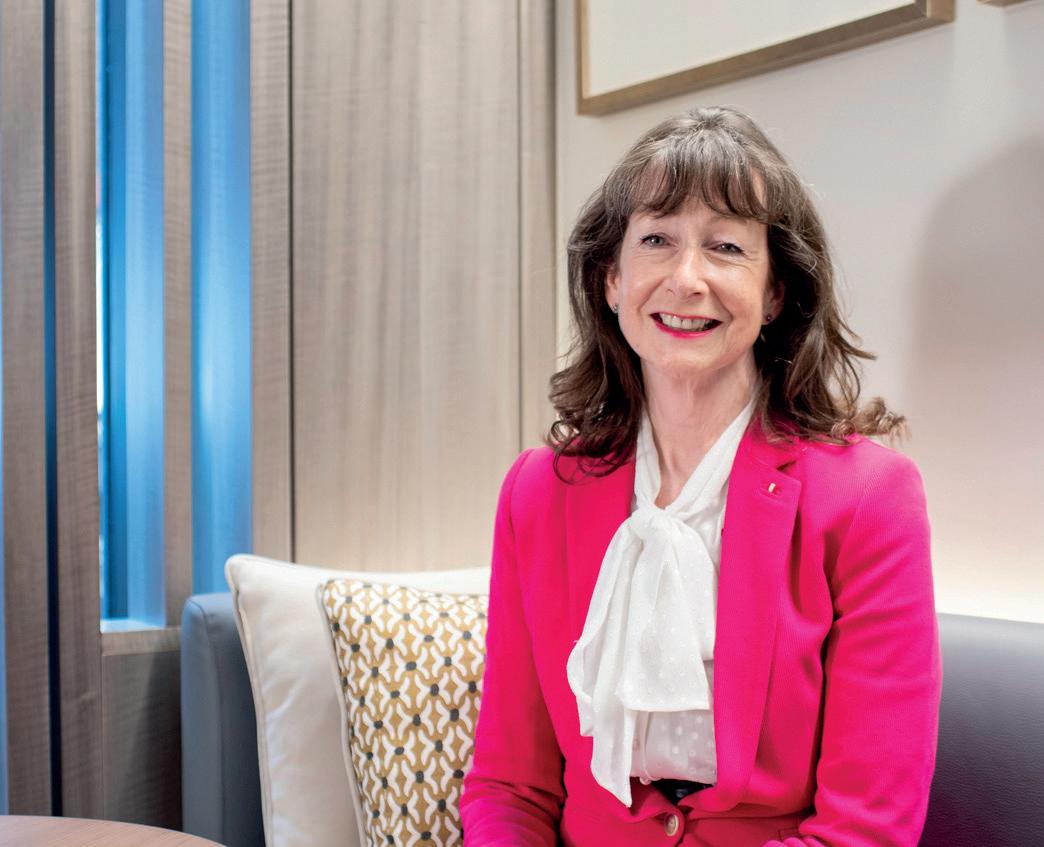
Dr Susana Banerjee, Consultant Medical Oncologist and Research
Lead for The Royal Marsden NHS Foundation Trust Gynaecology Unit, specialises in ovarian cancer and the systemic treatment of endometrial and cervical cancers. Results from the recent phase I FRAME trial, which was led by a team at The Royal Marsden and the Institute of Cancer Research, London, demonstrated that a new combination of targeted drugs for an uncommon type of ovarian cancer has shown promising results in an early clinical trial – shrinking tumours in half of patients.
Speaking about the trial results, Dr Banerjee says: “If these findings are confirmed in larger trials, they’ll represent a significant advance in
low-grade serous ovarian cancer treatment. I am delighted that this drug combination has worked so well in a group of patients who are in urgent need of new treatments, including those who have previously been treated with a MEK inhibitor. We’re very hopeful that this could become the standard of care for women with low-grade serous ovarian cancer.”
A multidisciplinary team like no other
Personalised care is at the heart of The Royal Marsden’s approach, and its unique multidisciplinary model ensures that cancer patients receive the highest standards of care. Up to 35 specialists – including surgeons, medical oncologists, radiotherapists, pathologists, nurses, and radiologists – attend weekly multidisciplinary team meetings (MDTs) to develop personalised treatment plans for each patient.
The Royal Marsden is continually working to improve early diagnosis for patients to help save more lives. From carrying out pioneering genetic sequencing to identifying mutations that mean an individual has a higher risk of developing cancer, through to regular
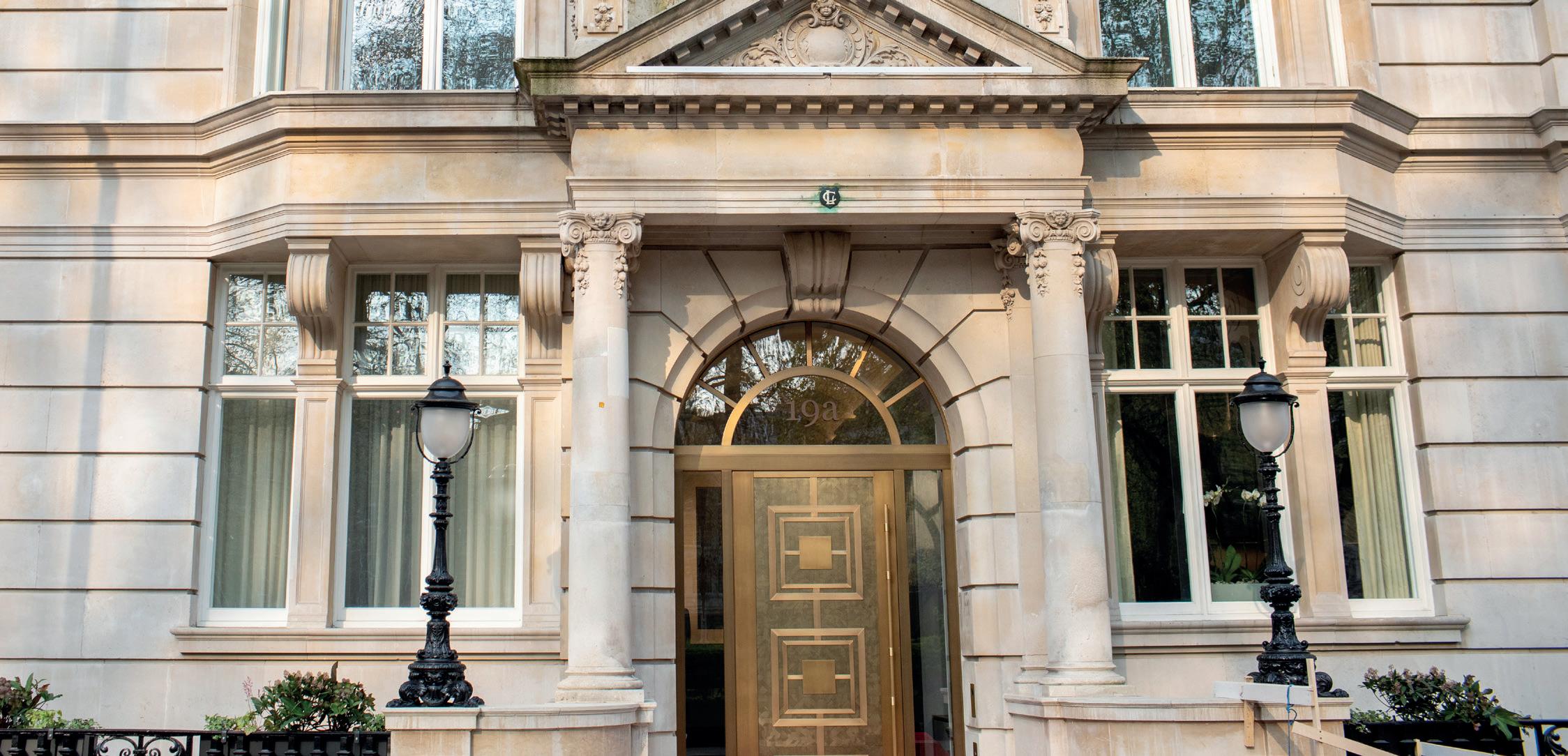
“Walking into Cavendish Square was reassuring and calming. I immediately felt more at ease”
Clare Kalis (below), one of the first patients to be seen at The Royal Marsden Private Care at Cavendish Square
screenings of those with a genetic predisposition to certain cancers.
Dr Richard Lee, Consultant Respiratory Physician and Champion for Early Diagnosis at The Royal Marsden, worked with colleagues Professor Ros Eeles and Professor Stanley Kaye to open a virtual Early Diagnosis and Detection Centre last year, which aims to accelerate early diagnosis and improve outcomes for patients. In a world-first, the OCTAPUS-AI study, led by Dr Lee and supported by the Early Diagnosis and Detection Centre, compared different machine learning models – a type of artificial intelligence (AI) – to determine which could most accurately identify non-small cell lung cancer patients (NSCLC) patients at risk of recurrence following curative radiotherapy.
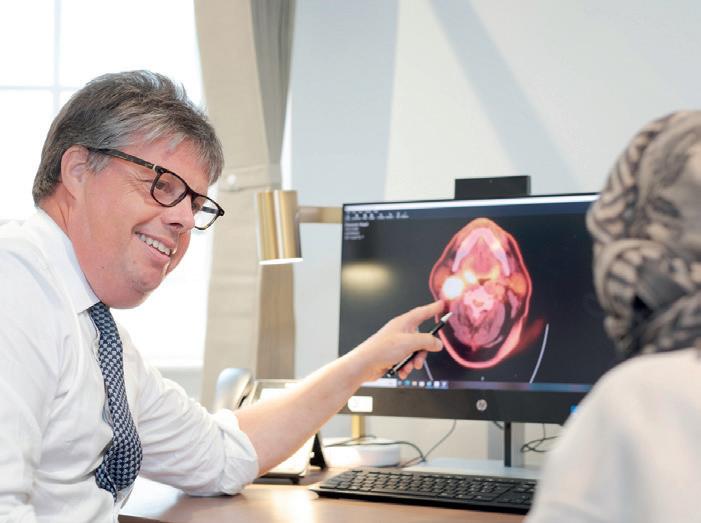
Results from the study suggest that AI technology could be used to help personalise and, therefore, improve the surveillance of patients following treatment based on their risk. This could lead to recurrence being detected earlier in high-risk patients, ensuring that they receive urgent treatment that could potentially improve their outcomes.
“This is an important step forward in being able to use AI to understand which patients are at highest risk of cancer recurrence, and to detect this relapse sooner so that re-treatment can be more effective," explains Dr Lee. “This study is an example of the vital scientific clinical research we’re undertaking in the Early Diagnosis and Detection Centre at The Royal Marsden. Through this work, we hope to push boundaries to improve the care of cancer patients, to help them live longer, and reduce the impact that the disease has on their lives.”
Bringing personalised care to central London, The Royal Marsden Private Care at Cavendish Square offers private patients outstanding facilities, worldclass expertise and a rapid diagnostic service. Housed within an Edwardian listed building, this research-led, diagnostic, outpatient and treatment facility is part of The Royal Marsden Private Care’s service provision.
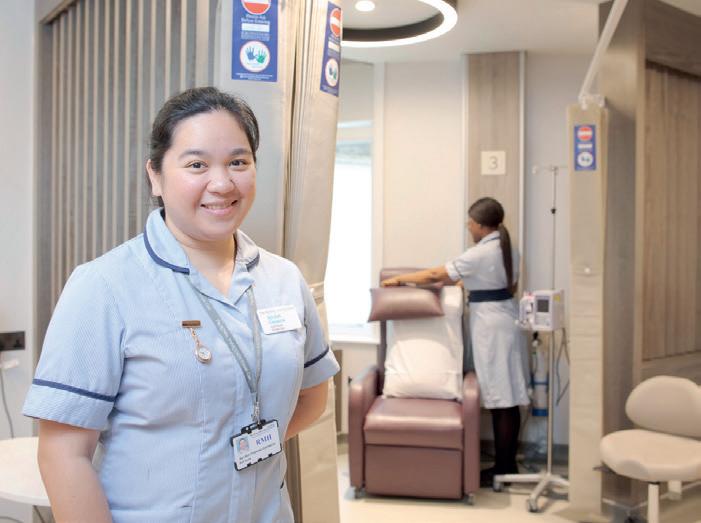
Cavendish Square opened its doors in April 2021 and, in its first year, welcomed 1,378 new outpatients from 35 countries, providing them with world-class cancer treatment and care. Ninety-eight per cent of patients recently rated the centre as excellent or very good, and 100 per cent said they would recommend the hospital to friends and family.
Patients have fast and direct access to world-leading diagnostic and researchactive consultants, who will personally oversee every aspect of their treatment plan. Experts at Cavendish Square specialise in a full range of cancer services across all the main tumour groups, with other clinical specialties offered including genetics, plastic surgery and reconstruction and pain management. The centre is also home to a minor procedure suite and a medical day unit with bespoke treatment bays, which will provide the highest level of patient-focused care for UK and overseas patients who are receiving some of the most advanced cancer treatments.
“Since Cavendish Square opened, patients from around the world have benefited from the brand-new facilities, safe in the knowledge that everything in the centre is underpinned by The Royal Marsden’s world-leading standards of cancer care,” says Shams Maladwala, Managing Director of The Royal Marsden Private Care. “Patients seeking the very best private cancer diagnostics and treatment know that we operate to the strictest safety standards and governance usually only seen in the NHS.”
Clare Kalis, 65, was one of the first patients to be seen at Cavendish Square. She has been under the care of Professor Chris Nutting, Clinical Director, The Royal Marsden Private Care at Cavendish Square, and the Head and Neck team since 2015, after she found a lump in her neck. “Checkups are always an anxious time, but walking into Cavendish Square was reassuring and calming,” she says. “I immediately felt more at ease. It is a beautiful facility in a great location which doesn’t feel like a cancer centre at all. It is a pleasure to be under the care of Professor Nutting, as he is such a specialist in his field, and I feel very privileged to be one of his patients.”
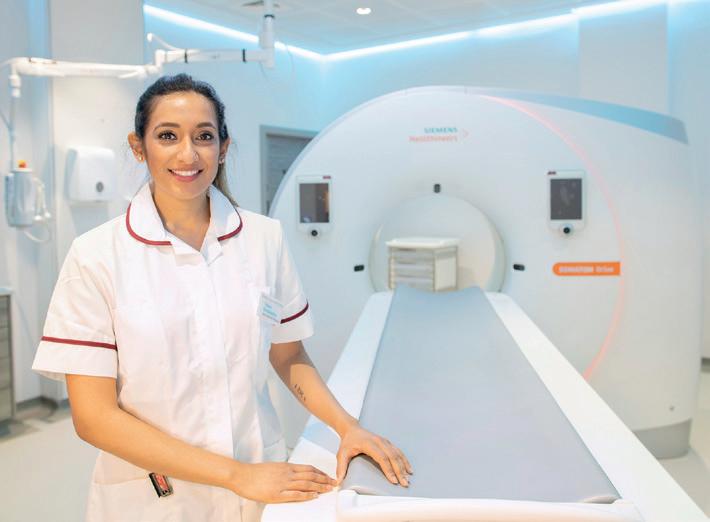
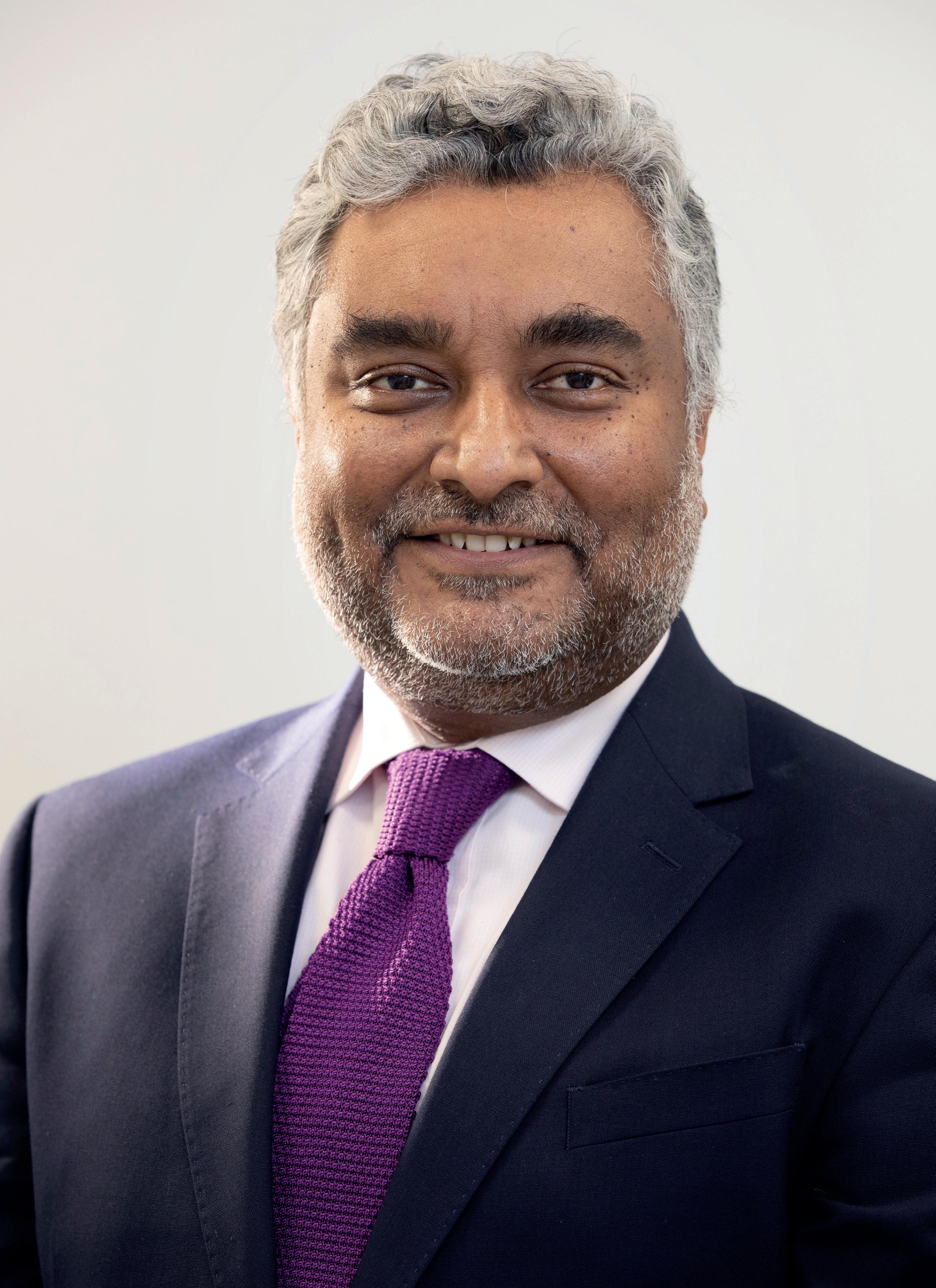
What is your medical specialty and area of expertise at The Royal Marsden?
I am a Consultant Medical Oncologist and Professor of Thoracic Oncology, which means I'm an expert in the treatment of cancers that arise within the chest. Fundamentally, that means three types of cancers: lung cancer, which is actually a group of many, many different types of diseases; mesothelioma, a less common cancer of the lining of the lung; and a rare tumour called thymoma or thymic carcinoma, which is an unusual tumour of the thymus gland in the chest. Specifically, I focus on the drug treatment of these cancers and work out how best these should be treated. For example, should the patient undergo surgery, radiation or drug treatment, and in which order?
There are various types of drug treatments that we can give. Traditionally, one might have thought that an oncologist would only be giving chemotherapy, but nothing can be further from the truth for the typical patient I see with lung cancer. Although chemotherapy is useful for many patients, we often use immunotherapy either by itself or in combination with chemotherapy. Immunotherapy is a newer treatment that harnesses the patient's own immune system so that it attacks the underlying cancer.
Another group of drug treatments we give are molecular targeted therapies. In this scenario, we perform comprehensive molecular analysis on a sample taken from a patient and work out whether they are best treated
Professor Sanjay Popat , a specialist in cancers of the chest, discusses the treatment and research that he and his colleagues provide at The Royal Marsden Private Care1 Consultant Medical Oncologist and Professor of Thoracic Oncology Sanjay Popat (PHOTO: THE ROYAL MARSDEN)
2 A patient's treatment journey begins with a comprehensive evaluation of their cancer / 3 Each patient is allocated a Clinical Nurse Specialist, who is their key worker throughout their treatment / 4
with chemotherapy, immunotherapy, a combination of the two, or a molecular targeted therapy in tablet form. The latter matches a molecular or genetic signature within the cancer to a particular drug, meaning that the treatment is personalised to the individual.
Working out the right treatment for a patient is dependent on a number of factors, including how much cancer they have, the particular molecular fingerprint of their cancer, their general health and fitness, and how strong their lungs are. The treatment strategy is decided in conjunction with other colleagues in the multidisciplinary team (MDT), and we're very fortunate to work here at The Royal Marsden with global leaders in their field.
I am very proud that our team at The Royal Marsden won the International Association for the Study of Lung Cancer’s Cancer Care Team Award for the Europe region in 2021, which was especially pleasing because this is a patient-nominated award.
If a patient is referred to you at The Royal Marsden Private Care, what would be their typical patient journey?
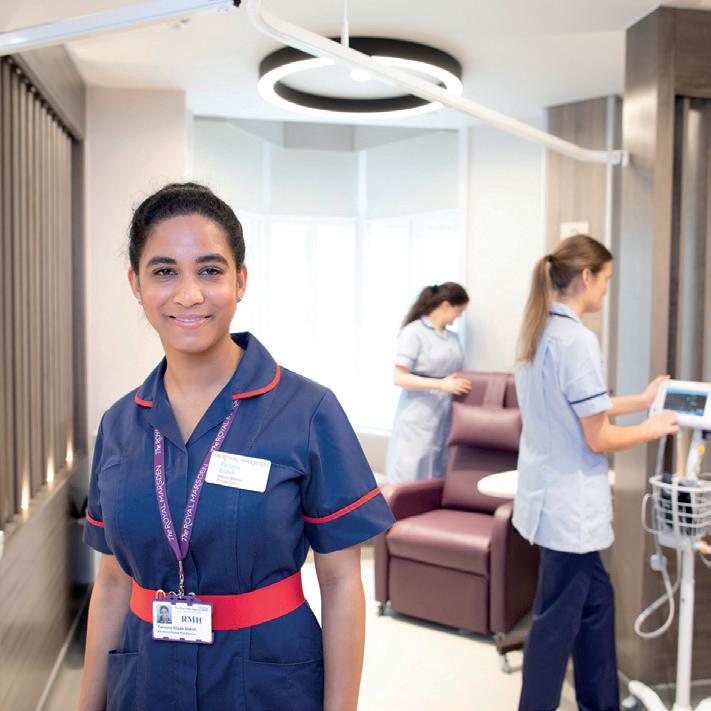
We have a research-led diagnostic and treatment private care facility based at Cavendish Square in London’s
Harley Street district, as well as our private care facilities at our hospitals in Sutton and Chelsea. I am based at both Chelsea and Cavendish Square.
Patients would see me and, also, a Clinical Nurse Specialist (CNS), who would be their key worker through their cancer journey. We would undertake a comprehensive evaluation of their cancer and review any previous scans or tests that have been provided. We would also review any specimens they may have brought to be confident of the patient’s original diagnosis. If not, we will assess the status of the cancer and, if required, carry out additional tests, such as a biopsy – removing a small tissue sample for further examination under the microscope.
We are very fortunate to work with some of the world's leading pathologists. In fact, one of our pathologists has recently co-authored with the World Health Organization (WHO) the current textbook of how we should be classifying our tumours – we really are working with experts at the top of their field.
More often than not, we would want a specimen to undergo comprehensive molecular analysis in our genomics laboratory at The Royal Marsden, which is one of the UK’s leading genomics laboratories. The important thing
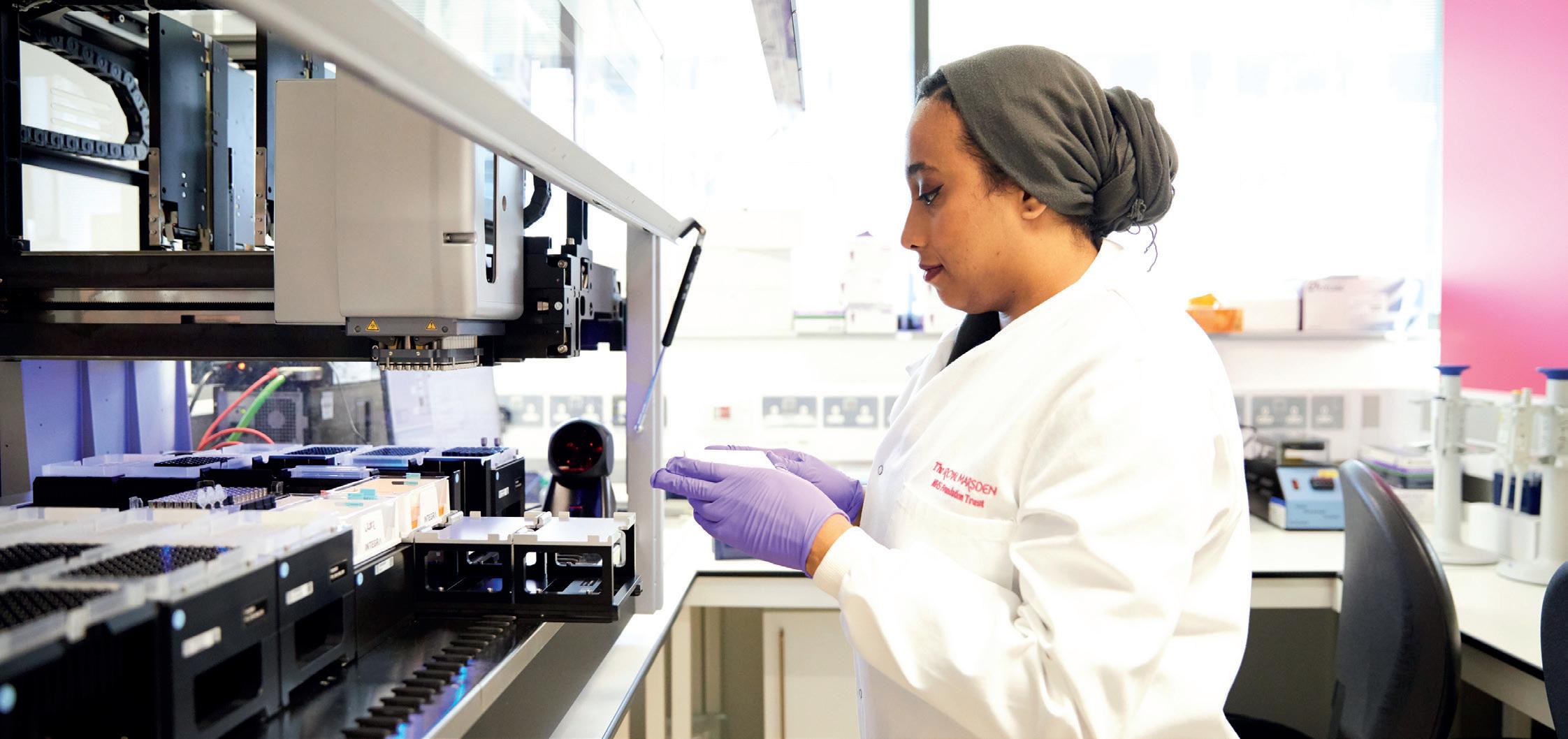
here is how that molecular analysis is interpreted in order to decide the optimal treatment for patients. We have a history of expert genomics here at The Royal Marsden and I am a professor of thoracic oncology at The Institute of Cancer Research, London, focusing on the genomics of lung cancer to best determine and decode the genetic signatures that we see in our patients.
Regarding patients visiting from abroad, can their personalised treatment plan be continued and monitored when they are able to return home?
For our international patients, we establish and enact a treatment plan and monitor each individual to ensure they are tolerating the treatment and that no side effects are occurring –whether this involves chemotherapy, immunotherapy, or a tablet of molecular targeted therapy – and that their cancer is on the right trajectory before they are in a position to return home. Treatment may then be continued in conjunction with their local oncologist.
Some patients may require a brief period of drug treatment before being considered suitable for surgery, in which case we would recommend they have their surgery with us. If a patient needs surgery, we would be able to arrange that in the right timeframe, after confirming the diagnosis and that surgery was the best way forward. In terms of thoracic malignancies, we work with our partners at Royal Brompton Hospital – a worldleading thoracic surgical centre, where we have a shared practice for surgery.
Can you tell us about the cancer research projects that you and your colleagues are involved with?
Research is critical to improve our knowledge and expertise in determining the right treatment for each individual. Such research takes place at a global level and I am leading several clinical trials in which we are evaluating new drugs to be used in patients with a variety of lung cancers. It's important that we have these trials in our portfolio because our patients may be eligible. But, more importantly, we will also have advance
understanding of how such drugs work when they are approved, which can be approximately two years later.
My colleague Dr Fiona McDonald, Consultant Clinical Oncologist, is also leading the way in advanced radiotherapy with several studies using advanced radiation technologies in patients with very specific types of lung cancer to improve their outcomes, looking specifically at the role of stereotactic radiotherapy, which is delivered from various angles around the body. These research projects are important for The Royal Marsden because, when such treatments become the standard of care, we are already experts in their delivery.
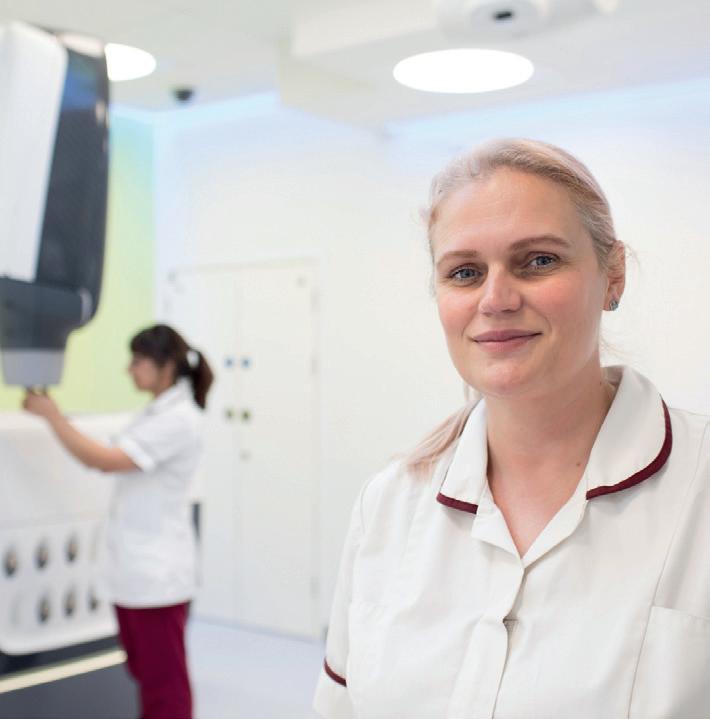
Looking to the future, what developments are on the horizon to further enhance the treatment of lung cancer patients?
I am really interested in the molecular profiling of cancer, which continues to transform the face of lung cancer treatment. As little as 15 years ago, lung cancer was considered a death sentence, with the average survival time of less than a year for patients with metastatic or widespread lung cancer, which form the majority of cases. Through genomic screening and molecular profiling of patients and the implementation of immunotherapy and molecular targeted therapy, some patients are now living for years. We are seeing a much improved survival rate for patients due to these breakthrough treatments.
What really excites me for the future is how we will implement the new drugs that are coming through and how new genomic technologies will enable us to do this at the right time for each patient. In diagnostics, one of the novel technologies coming through is something called liquid biopsies, in which we are taking a blood sample and are able to detect at extremely low levels parts of the tumour’s genes or the tumour’s DNA, which are shed into the blood. Understanding that blood test is a key skill and art, and this is an area in which The Royal Marsden team has great expertise. It is an evolving field that, I think, will revolutionise how we manage cancer over the next five years.
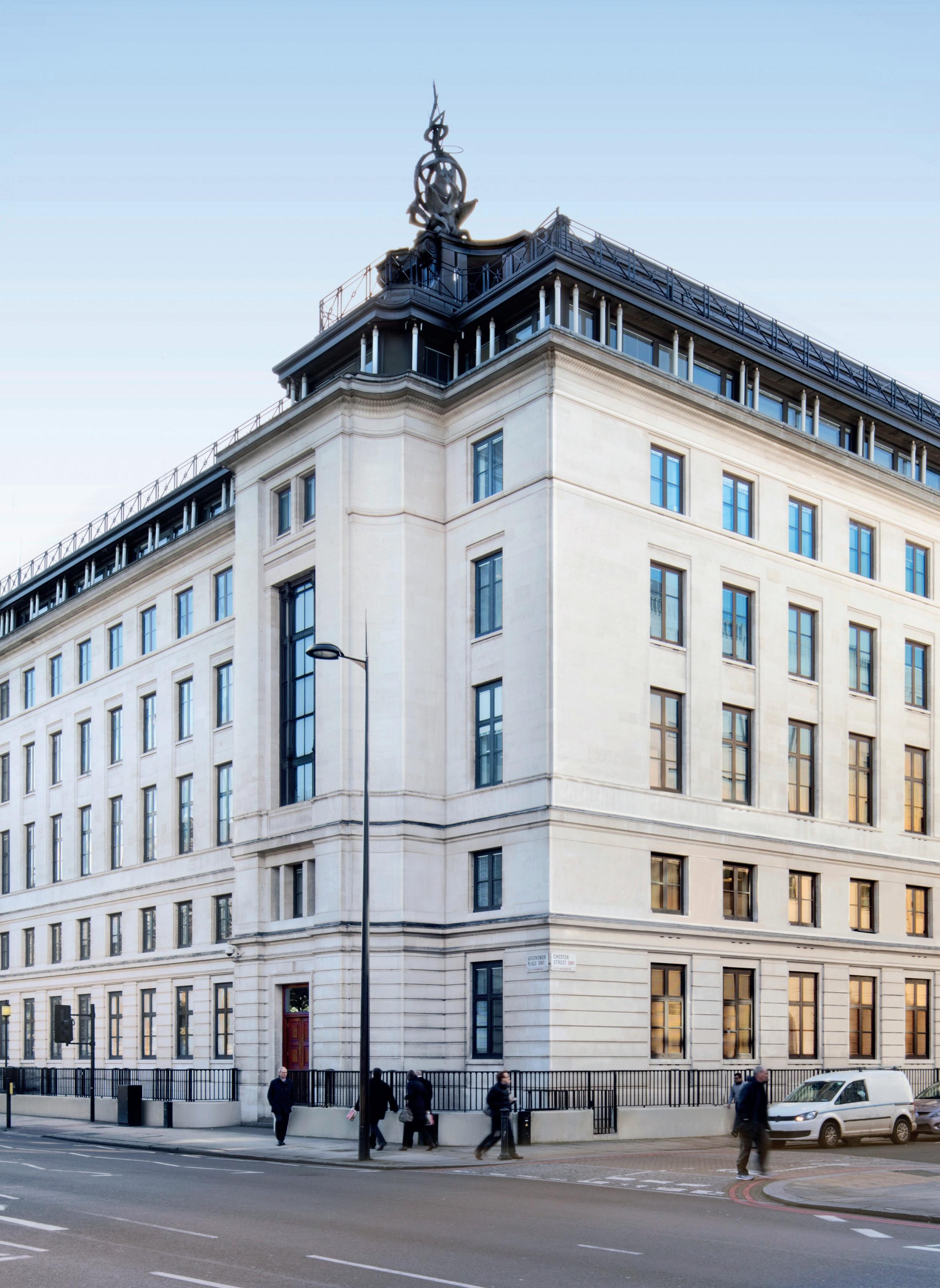
With access to a wealth of local and global expertise, Cleveland Clinic London balances cutting-edge technology and research with empathetic treatment in a healing environment
Set in the heart of London’s Belgravia, the 184-bed Cleveland Clinic London Hospital delivers cutting-edge healthcare in a calming, healing environment. Visitors are first struck by the abundance of natural light, and more than 100 pieces of fine art and 700 prints adorning the eight floors of the hospital, but the facility also houses the very latest technology to treat the most complex of conditions.
Opened in Spring 2022, this is the second London-based facility established by the global non-profit health provider, delivering comprehensive inpatient medical and surgical services with a
special focus on cardiovascular, digestive, neurological and orthopaedic care. The hospital was preceded by the six-storey Portland Place Outpatient Centre, opened in 2021, which welcomes patients for GP and specialist appointments, diagnostics and wellness check-ups.
With the opening of the London facilities, Cleveland Clinic introduced a new model of healthcare to the UK. Under a doctor-led model developed over more than 100 years, patients are always at the centre of care decisions, and medical experts operate as ‘teams of teams’, with patients benefiting from multidisciplinary collaboration.
Much of the strength of Cleveland Clinic's UK facilities stems from being part of a global network, which spans cities across the United States as well as Toronto and Abu Dhabi. This enables the world’s foremost experts in their fields to share knowledge and collaborate on patient cases and best practices, with unique insights driven by innovation, research and education. Moreover, the integrated nature of Cleveland Clinic’s facilities and instant access to electronic patient records mean patients receive seamless and consistent care, wherever they are in the world.
The dedicated Global Patient Services team supports patients through their entire treatment journey, and provides peace of mind when travelling for medical care. At Cleveland Clinic London, patients will always have a point of contact before, during and after their treatment to help make the necessary arrangements and address any concerns. Post-treatment followups can take place virtually from
patients’ home countries where feasible, or at the Cleveland Clinic location that is most convenient for them.
Professor Olaf Wendler, Chair of Cleveland Clinic London’s Heart, Vascular and Thoracic Institute, believes this international expertise is a key differentiator in the London private health market. He says, “We have appointed the most comprehensive group of London’s leading heart experts, who work together as one seamless multidisciplinary team to provide 24/7 patient care. They also leverage the expertise of our US colleagues at Cleveland Clinic Main Campus, which for 28 consecutive years has been named the number one hospital for cardiology and heart surgery1
“The majority of our doctors are employed by Cleveland Clinic London for their private work, but continue to work in the National Health Service (NHS), meaning there is an ongoing exchange of clinical and academic knowledge with London’s top teaching hospitals and universities.”
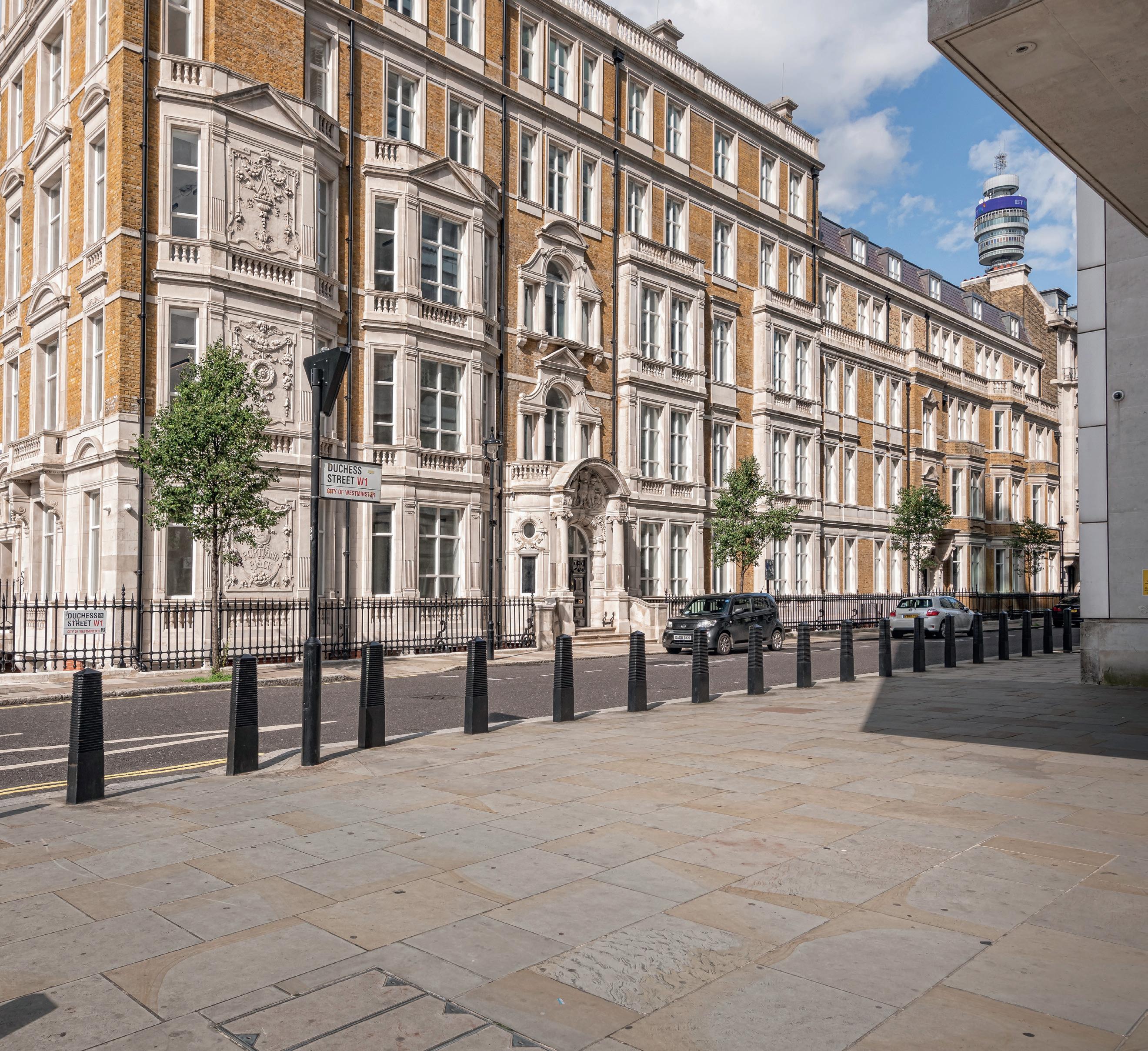
“We have appointed the most comprehensive group of London’s leading heart experts”
Professor Olaf Wendler, Chair of Cleveland Clinic London’s Heart, Vascular and Thoracic Institute2 Cleveland Clinic's Outpatient Centre in Portland Place (PHOTO: CLEVELAND CLINIC)
Professor Wendler adds that Cleveland Clinic London also collaborates with the UK health and life sciences sector to share knowledge and improve patient care – for example, by developing a medical research data repository and spearheading initiatives for training and development of nurses and medical students.
There are several factors that distinguish Cleveland Clinic London from other private healthcare providers in the UK, which make it a popular choice for local and overseas patients. A comprehensive range of healthcare services is delivered with an innovative, empathetic approach that builds on Cleveland Clinic’s more
than 100-year heritage. With Cleveland Clinic ranked among the world’s top hospitals 2, doctors at the London facilities have access to a network of global experts, as well as the latest clinical equipment, including advanced laser and robotic surgery capabilities.
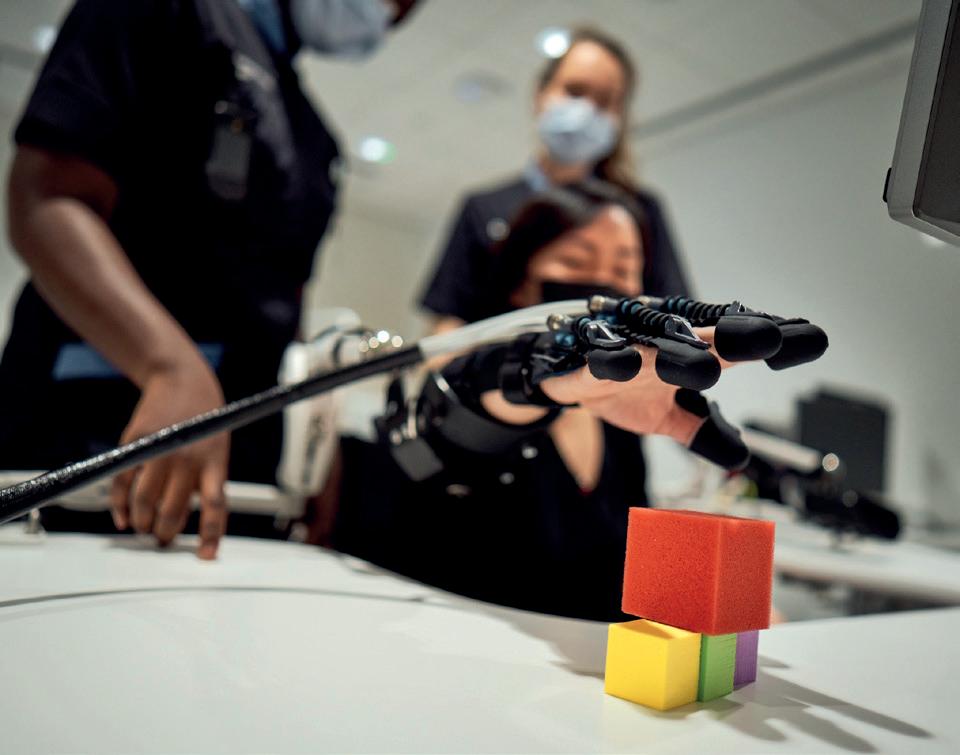
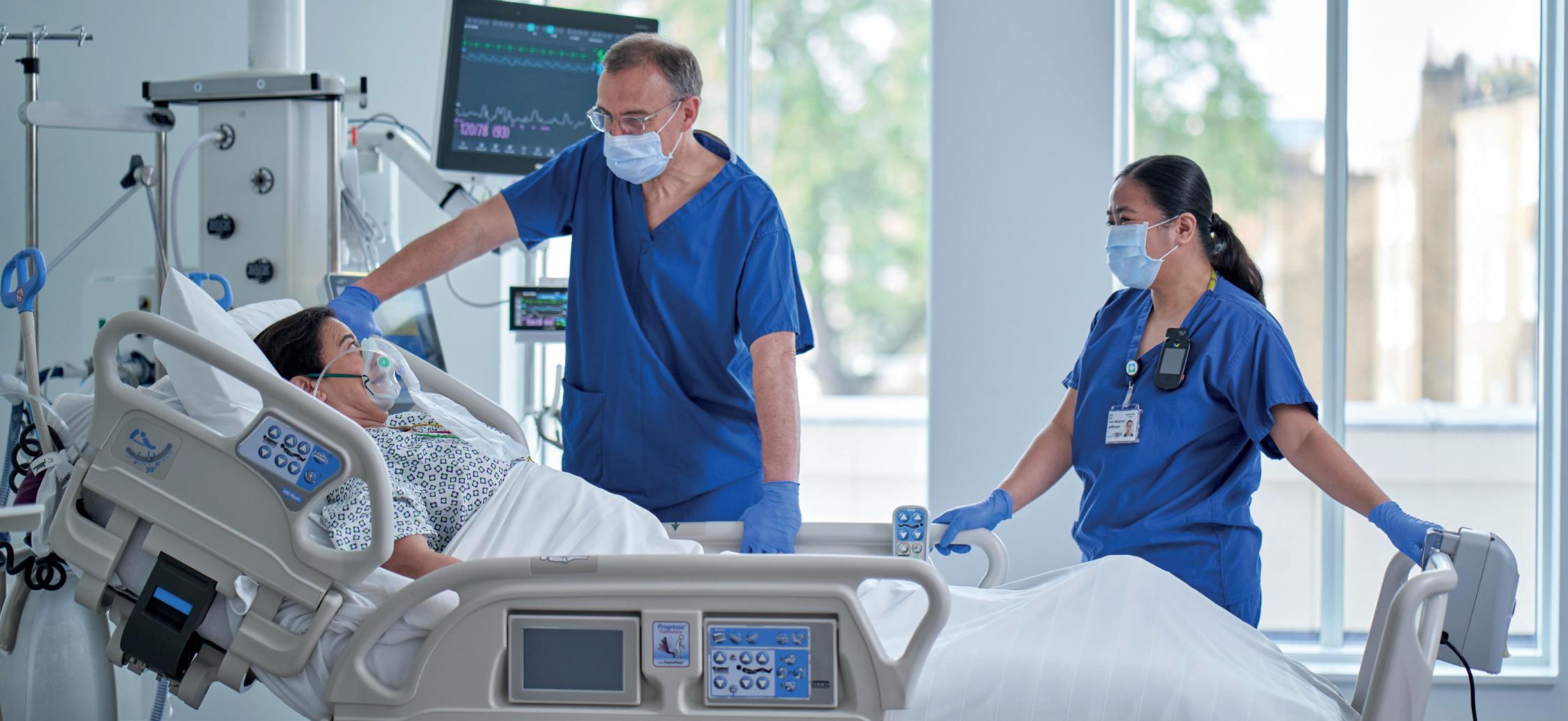
Cleveland Clinic London uses the most advanced and integrated medical record technology, using mobile devices and patient apps to ensure patients are active participants in their care. In addition, patients needing to travel are assured of continuity of care across a global network, with concierge-style services to ensure a seamless patient journey.
FURTHER
Contact Cleveland Clinic London to find out more about accessing its range of healthcare services: call +44 (0)20 3423 7500 or visit www.clevelandcliniclondon.uk
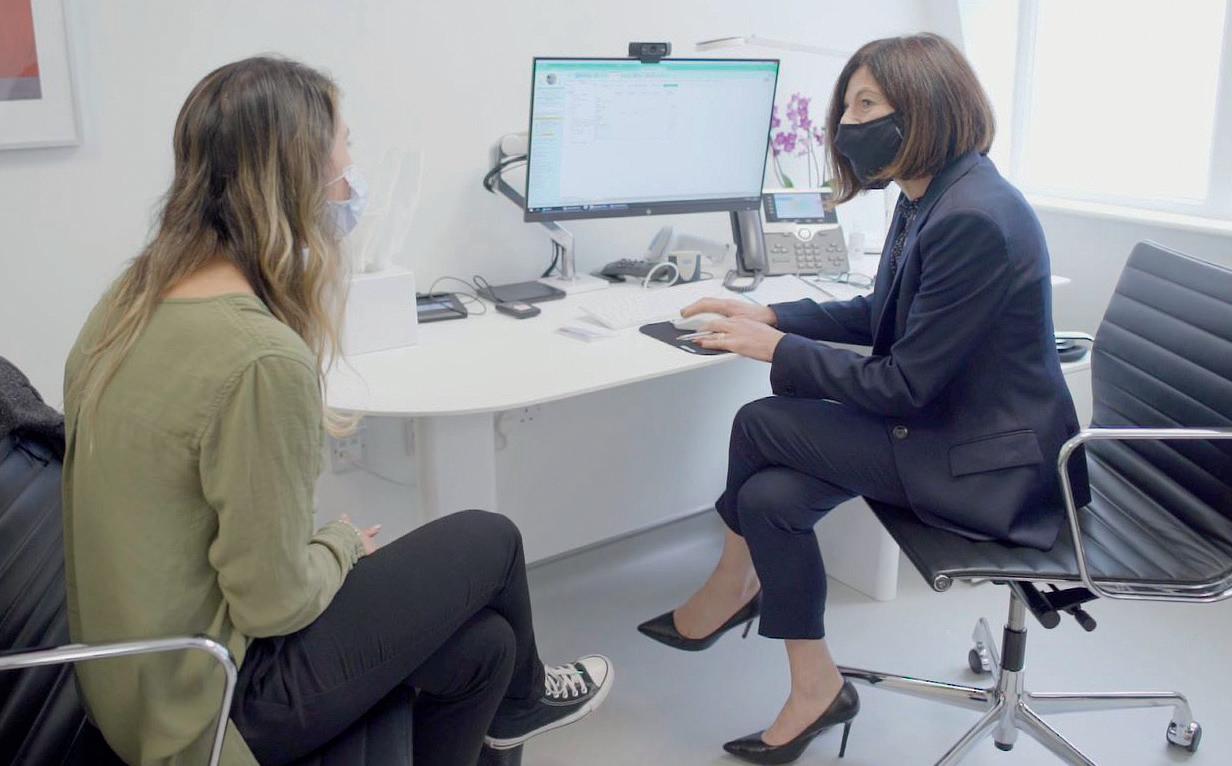
The Breast Health Centre at King Edward VII’s Hospital has evolved to become a world-leading centre for breast cancer. The state-of-the-art facility offers rapid screening and one-stop assessment, with access to specialist consultants who are leading the field in advanced surgical techniques and treatments.
But something else that sets the Centre apart is its focus on highly personalised, integrated care. Evidence demonstrates that a holistic approach to breast health has numerous benefits for patients, from reducing the stress of initial investigations right through to better adherence to treatment plans and improved emotional and physical wellbeing during their cancer journey and beyond.
Located in London’s Harley Street Medical District, King Edward’s VII’s Hospital’s Breast Health Centre has taken patient-centred care to a whole new level. Care is delivered by an expert multidisciplinary team that not only includes cancer surgeons, microsurgeons, radiologists and clinical nurse specialists, but also extends to physiotherapists, pain-management experts and clinical geneticists.
Breast Health Centre manager and clinical nurse specialist Amelia Cook explains that the team has raised the bar on personalised care: “Everything is tailor-made for each individual and our ethos is to work with the patient as a team,” she says.
One of London's oldest independent hospitals offers cutting-edge facilities and a highly personalised approach to breast cancer treatment
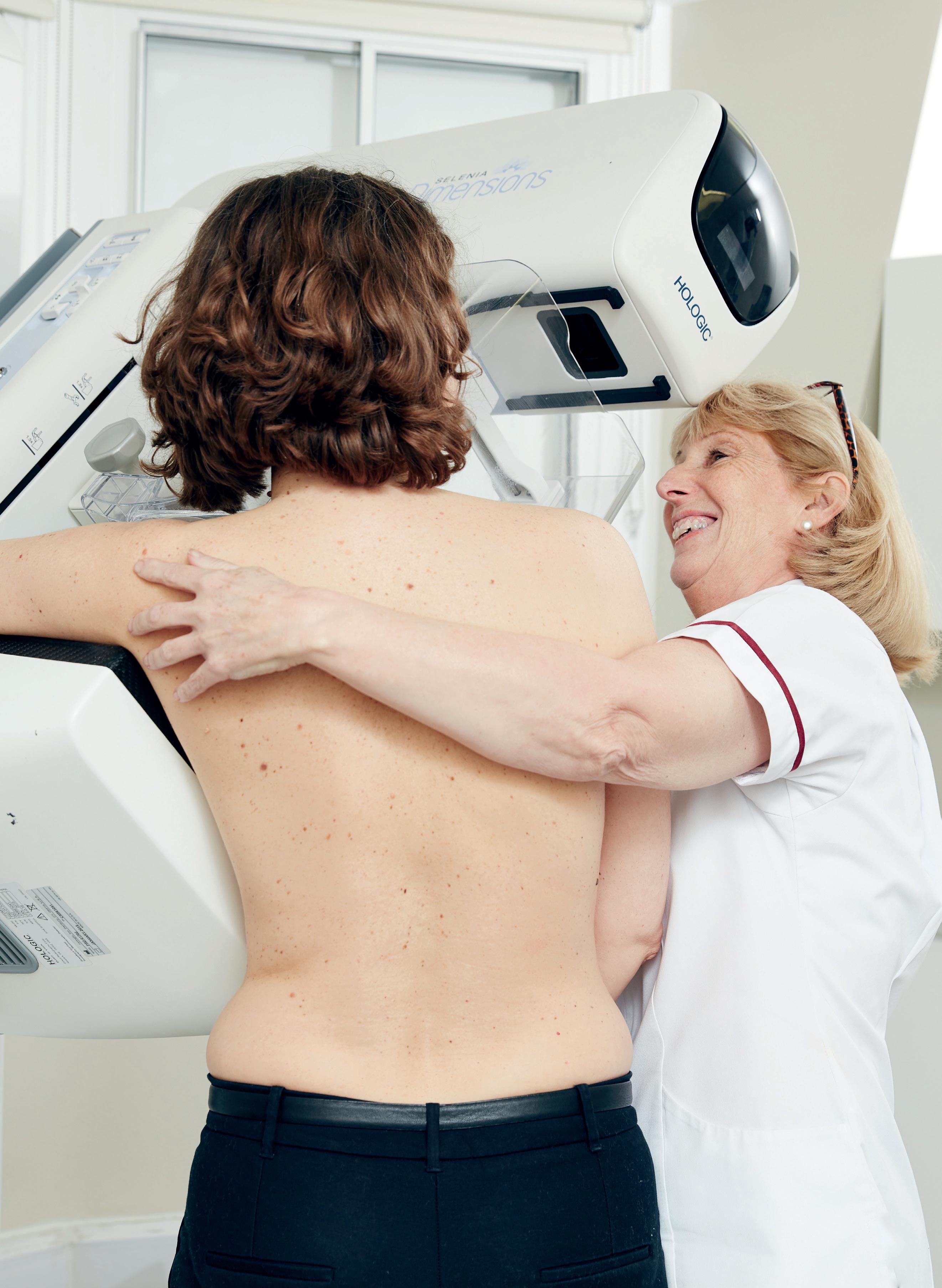
Opened in 1899, King Edward VII’s is one of London’s oldest independent hospitals and, with just 56 beds, also one of the smallest. Along with its royal patronage and charitable status, this has helped it create a discreet and highly personalised approach to patient care.
Lead consultant surgeon at the Breast Health Centre, Mr Paul Thiruchelvam, highlights that this focus on bespoke treatment – together with a tightknit group of physicians drawn from across London’s teaching hospitals, who work alongside specialist nursing staff – has enabled the centre to develop a shared vision.
“We put the patient very much at the centre of treatment,” he explains. “That involves delivering world-class cancer care, but also looking more widely at the patient as a whole. We not only look at the patient’s cancer needs, but also their emotional, social and spiritual wellbeing through their cancer journey.”
That personalised journey begins right from first contact with the patient.
Anyone over the age of 40 who simply wants a breast check-up and is not experiencing any symptoms can access the Centre’s mammogram screening service, provided they are registered with a GP in the UK. If they don’t have a UK GP, King Edward VII’s Hospital can connect them with one from its own team or a local practice.
“This ensures that, when the results go back to patients, they've got somebody overseeing their care. Even if they are absolutely fine, we always ensure the GP gets the results so that they can be discussed properly with the patient,” says Amelia.

Results are usually available on the same day, but, if there are concerns, patients will be invited back for a consultation with one of the Centre’s team of top radiologists. No two women are the same, and additional assessments might include 3D mammography or ultrasound, which can be used to get different images of the breast, and/or MRI or stereotactic biopsy. Crucially, says Amelia, the results are relayed back quickly and next steps discussed in detail with the consultant and clinical nurse specialist.
Speedy access and results can be even more important if patients are experiencing symptoms of breast cancer, such as a lump or discolouration – and the accompanying anxiety this can cause. Women – or, indeed, men – of any age who have worrying symptoms can self-refer to the Centre’s one-stop-shop “triple assessment”.
Regarded as the gold standard for diagnosis, triple assessment includes a physical examination, mammogram or ultrasound scan and, if needed, a biopsy. The whole procedure can be completed in as little as an hour. Most people can be reassured, but for those with a cancer diagnosis, the
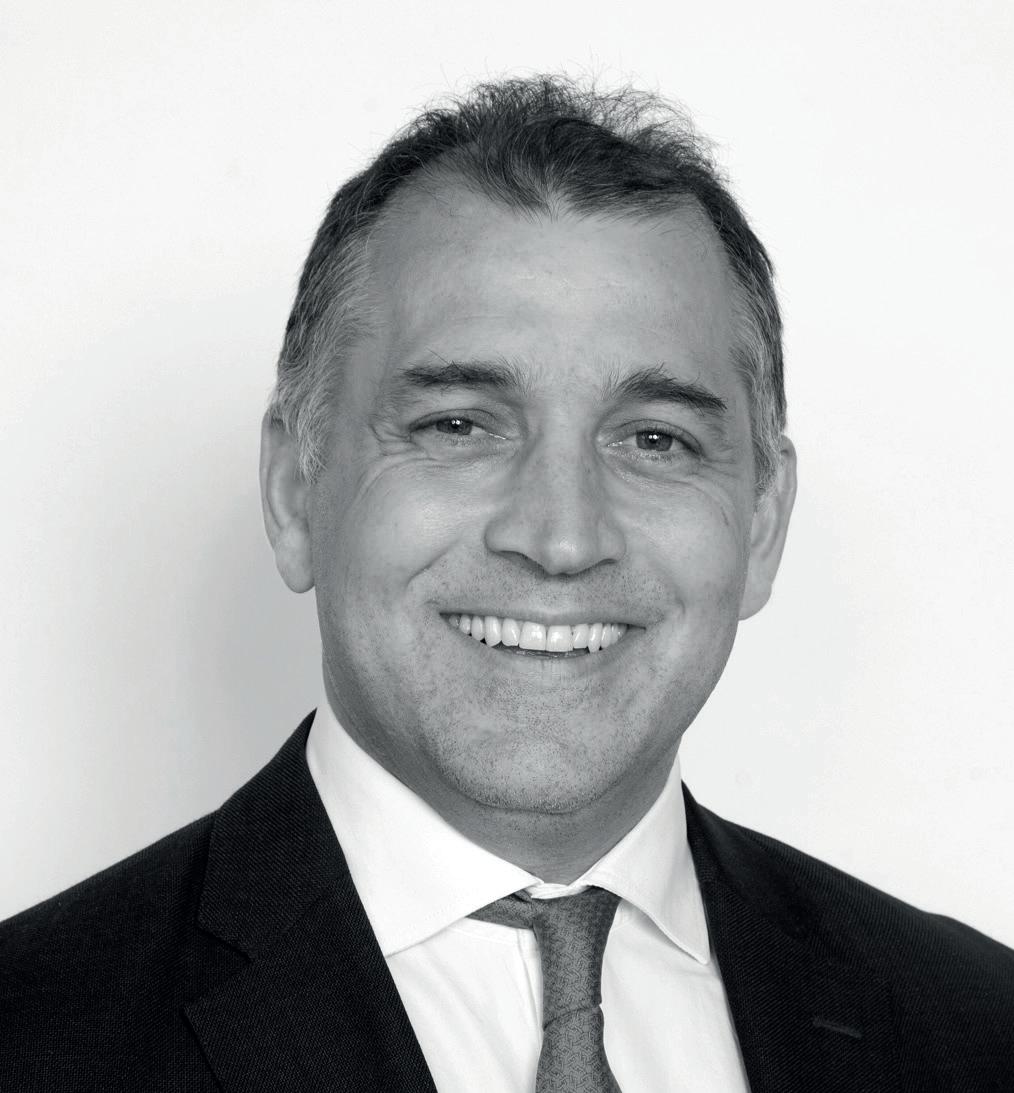
“Everything is tailor-made for each individual and our ethos is to work with the patient as a team”
Amelia Cook,Breast Health Centre manager and clinical nurse specialist 1 Amelia Cook, Breast Health Centre manager and clinical nurse specialist / 2 Lead consultant surgeon Mr Paul Thiruchelvam (PHOTOS: KING EDWARD VII'S HOSPITAL)
fact that the service is consultant-led means they can begin discussing treatment options straight away.
“Having a cancer diagnosis is extremely complex. There is a lot of information to take on board at a very difficult time, so it is really important that we tailor the care and the information we provide,” says Paul.
Ultimately, Paul explains, patients need to be empowered to make decisions about their personal treatment. “We have to make sure we talk about all treatment options, along with the particular advantages and disadvantages,” he says. “This is extremely important because we know that patients who are involved actively in their decision-making process have a much better cancer experience.”
Treatment options discussed might include surgical and non-surgical
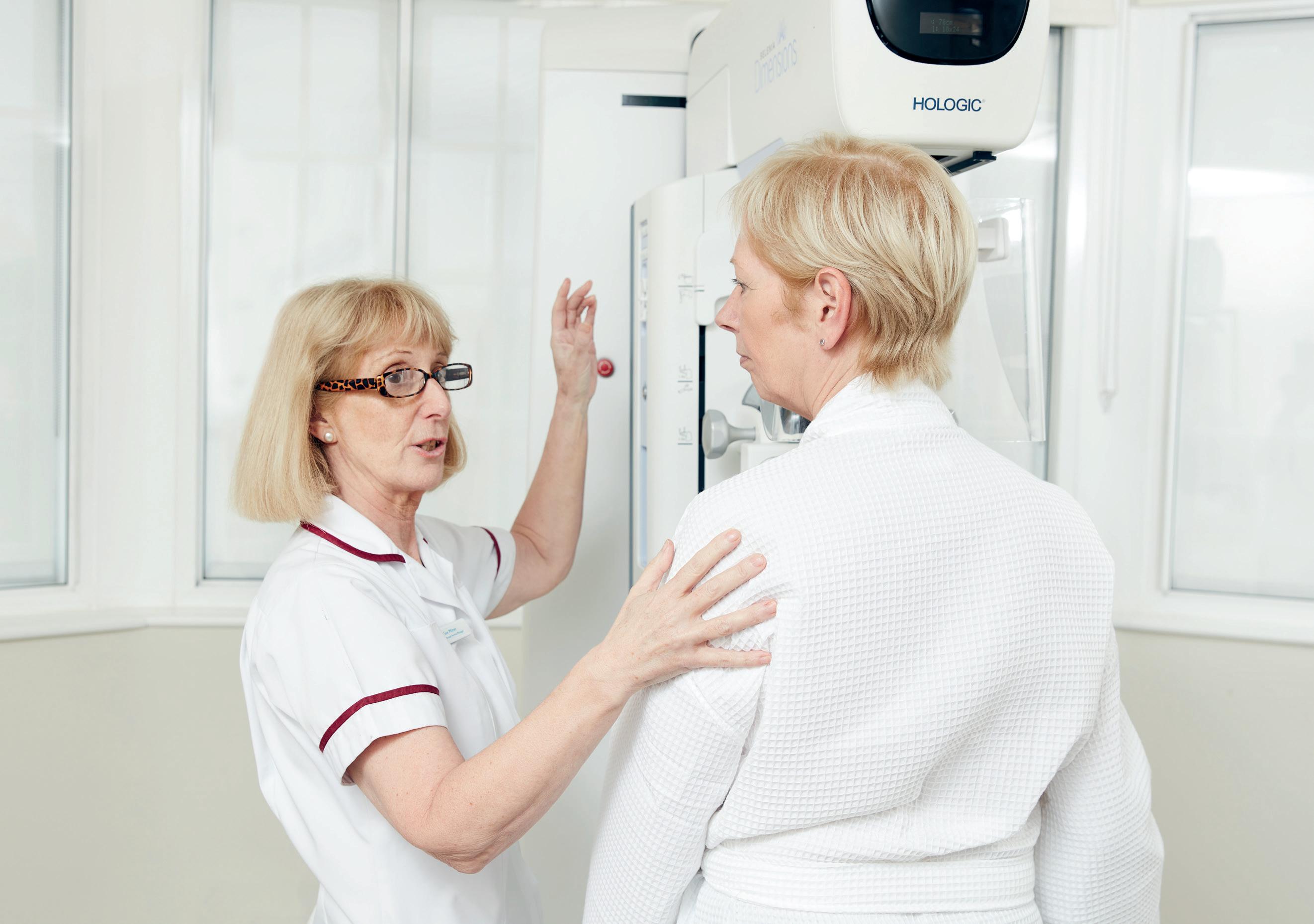
management, but much cancer care is multimodal and may include surgery alongside chemotherapy, radiotherapy and endocrine therapy.
King Edward VII’s Hospital is at the cutting edge of some of the most complex surgical procedures. Paul and his colleagues not only work closely as multidisciplinary teams, but are increasingly sharing the operating theatre to perform cancer surgery alongside advanced microsurgical techniques for breast reconstruction and lymphedema prevention. “Working with fellow consultants means you can undertake complex surgeries more expediently and safely,” explains Paul.
The team has been at the forefront of deep inferior epigastric artery perforator (DIEP) flap reconstruction – a highly complex autologous breast reconstruction procedure that uses the patient’s own abdominal tissue to recreate the breast mound. “It is an extremely
complex procedure, but we have highly skilled microsurgical colleagues who are able to deliver outstanding outcomes and with extremely low rates of complications,” says Paul.
However, he adds, undertaking an immediate breast reconstruction may not be right for all women at the same time as cancer surgery. “For some patients, reconstruction may not be at the forefront of their minds, so they may opt to delay the procedure. It’s a very personal decision, but the important thing is that patients are offered a choice.”
Alongside advanced reconstruction techniques, King Edward VII’s Hospital is at the forefront of an innovative procedure to reduce the risk of lymphoedema – a chronic condition that causes swelling in the body’s tissues following cancer treatment.

The technique – called lymphatic microsurgical healing approach (LYMPHA) – can again be performed alongside cancer surgery. Effectively, it reconnects the lymphatic drains in the arm to the area under the shoulder
joint to allow lymphatic fluid to flow freely back into the circulation.
Paul, who is a member of the expert panel on breast cancer-related lymphoedema and was involved in drafting best-practice guidelines for the American Society of Breast Surgeons, highlights that the technique has been shown to greatly reduce lymphoedema in patients whose treatment requires the removal of a large number of lymph nodes.
“Our team travelled to Genoa to visit Professor Francesco Boccardo, who first described the LYMPHA procedure. Our technique has evolved over the past four years and I am proud to say that we are about to carry out our 40th procedure,” Paul explains. “We are extremely fortunate to be able to offer it to our patients and potentially reduce their risk of developing this extremely debilitating condition.”
International links and Paul’s work with the American Society of Breast Surgeons have also helped the Breast
“Patients who are involved actively in their decisionmaking process have a much better cancer experience”
Mr Paul Thiruchelvam, lead consultant surgeon
Health Centre to integrate a range of complementary services into its treatment pathways to provide patients with 360-degree care. Postoperative pain and discomfort can be an additional problem for women undergoing cancer treatment, particularly after a mastectomy.
“There is a tailored protocol in the US around patients having pre-operative pain assessments to ensure that they don't develop a chronic pain cycle,” explains Paul. “And this is something I have integrated into my practice.”
The team now includes a dedicated consultant pain specialist, Dr Matthew Brown, who can assess women before their operation and design a bespoke post-operative pain management plan, as well as deliver complementary therapies such as acupuncture.
The Centre has also developed a unique physiotherapy programme where patients are seen before, as well as after, surgery. This gives the specialist physiotherapists a deeper understanding of the patient’s normal function so they can produce a postoperative plan that will get them back to full mobility as quickly as possible.
And for those patients whose clinical history indicates a genetic link, such as BRCA1 and BRCA2 mutations, King Edward VII’s Hospital is the only private hospital in London with a truly comprehensive genetics service. Lead by consultant clinical geneticists Professor Marc Tischkowitz and Dr Anjana Kulkarni, the service can also be extended to family members if a cancer-related gene mutation is identified.
A multidisciplinary approach has been shown to greatly improve governance and patient safety. However, to ensure it genuinely improves patient experience, it is vital that care is coordinated, which is where Amelia and fellow clinical nurse specialist Helen Froyd play a pivotal role.
“We are very fortunate to have two outstanding and experienced breast care nurses,” says Paul. “They are
absolutely key in the patient journey. They are the first point of contact for the patient and facilitate their appointments with the various members of the cancer team.” Indeed, Amelia and Helen are there to help patients navigate their care from that very first screening or assessment.
“That means we are there for patients right from diagnosis and often before,” says Amelia. “It’s really personalised care that we offer here. We’ll look at the whole person to see where we can target support. It’s very interactive and there are all sorts of touch points, from face-to-face clinics to text messaging. The important thing is that we are there when patients need us – even if it’s 10 o’clock at night, they can leave a message and we’ll call them back the next day.”
During treatment, Amelia and Helen carry out regular needs assessments to help identify any areas of concern for their patients – whether mental, physical, social or even financial. They can also perform micropigmentation – a tattoo-like procedure to recreate the nipple and areola following reconstruction surgery – and provide long-term support, in some cases years after treatment has finished.
“Even if patients are completely cured without any problems – and most women are – we will see them in follow-up a year later,” says Amelia. “And they will always have our contact numbers, so even if it is months or years down the line and they have a question or feel anxious about something, we are there to support and advise.”
According to Paul, it is this very high-level support that can make a real difference for patients coming to terms with a diagnosis and what can be a long road to recovery.
“What patients value most is being looked after by an experienced team guiding their care,” he says.
“Knowing that there is a group of people who want the very best outcome for them helps patients get through their cancer treatment, and it’s an honour to be part of that team delivering a world-class level of care.”
4 A range of complementary services are integrated into treatment pathways to provide patients with 360-degree care / 5 King Edward VII's Hospital is located in the Marylebone district of London's West End (PHOTOS: KING EDWARD VII'S HOSPITAL)

To book an appointment or speak to a specialist at King Edward VII's Hospital Breast Health Centre, call 020 4571 3373 Monday to Friday 9am-5pm, or visit kingedwardvii.co.uk
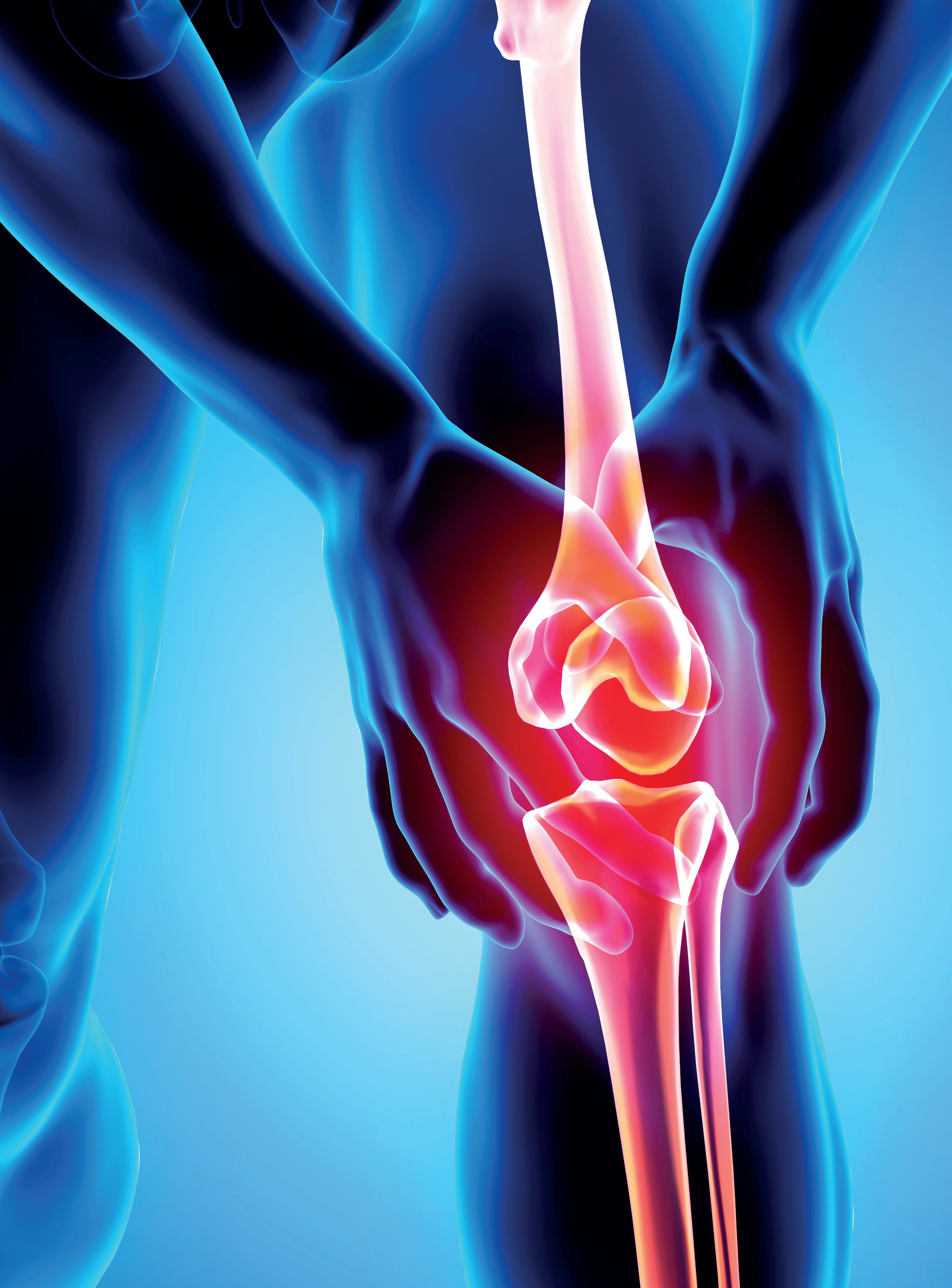
Think of ‘sports medicine’ and, for many of us, an image is conjured up of elite athletes receiving the kind of treatment reserved only for those occupying the higher echelons of the sporting world. However, the reality is quite different, with the same treatment processes also on offer to all patients visiting London, regardless of their athletic ability or lifestyle.
“The term ‘sports medicine’ is a slight misnomer, as we are not only treating athletes, but also regular people with problems such as back pain or chronic knee arthritis,” explains Dr Natasha Beach, a consultant in sports
and musculoskeletal medicine at OneWelbeck Orthopaedics. “For this reason, we are trying to change refer to ‘sports and musculoskeletal medicine’, because of the common misconception that we only treat athletes.
“I’ve heard patients say, ‘Oh, I’m not an athlete, am I in the right place?’, but yes, they are! We treat everybody in the same way as an elite athlete, using all the same principles that we use with professional sportspeople. If you’re an elite tennis player and you’ve got tennis elbow, the injury is no different to that of a new mother who is suffering elbow pain after lifting her baby up all the time.”
Whether an injury occurs on the sports field or as a result of everyday activity, the diagnosis and treatment journey for patients is identical, regardless of their athletic prowess1 Whether an injury occurs to an athlete or not, the treatment options are exactly the same (PHOTO: SHUTTERSTOCK)

Dr Beach’s patients are mostly referred by physiotherapists with some experience of sports medicine, although patients may also approach the clinic directly. “We might be the third or fourth port of call for many patients, who are visiting us with an ongoing problem that hasn’t been solved by their previous treatment. At that point, people are starting to get almost desperate.”
When patients arrive at the clinic, the focus is on finding out the cause of an injury. “We take a holistic approach in sports medicine,” says Dr Beach. “For example, if somebody is suffering from knee pain then we are not just interested in what the problem is, but also why it
has happened. Are they overtraining, are they wearing the wrong shoes, or are they running up and down a hill with an unusual camber? If we can identify and fix what caused the injury in the first place, that goes a long way towards making the patient better.”

Following an initial consultation, which will also consider any reports from previous diagnostic scans taken elsewhere, patients are provided with the appropriate imaging – which includes ultrasound, magnetic resonance imaging and X-ray – to ascertain their injury.
“We’re fortunate at OneWelbeck that we are able to perform diagnostic imaging on-site, which means that we can often
do a consultation and then carry out an MRI scan the same day,” says Dr Beach. “I can then see the results without having to call another hospital or clinic.”
After the imaging results have been received, most patients will move on to a course of physiotherapy, but others may require additional treatments, such as steroid injections or pain relief. “The time frame for rehabilitation depends on the severity of the injury,” advises Dr Beach. “For many people, rehab will take six to eight weeks, but for some it will be faster and for others it will take considerably longer. For instance, someone with a stress fracture will be on crutches or
wearing a protective boot for six weeks before they can start their rehab.”
Dr Beach’s expertise in the field of sports medicine means that she spends much of her working week with elite athletes at the Lawn Tennis Association, which oversees the sport in Great Britain, as well as working with national organisations for athletics, triathlon and hockey. Her practice at OneWelbeck also brings her into contact with non-professional sportspeople, whose training regimes are often comparable to those of the elite, as well as recreational athletes.
Dr Beach’s caseload, and many of the injuries that are presented, varies in line with the sporting seasons. “In
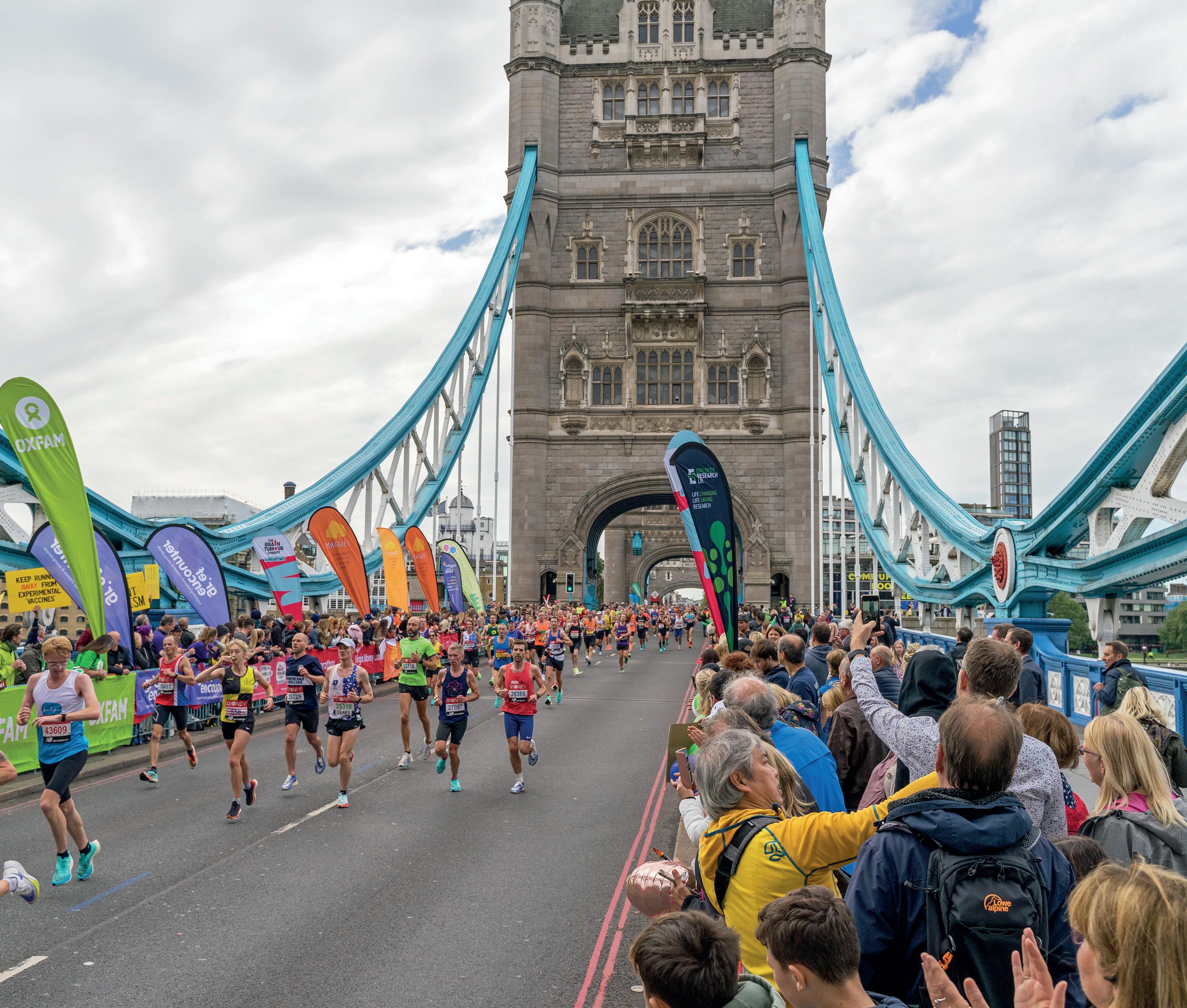
“The time frame for rehabilitation depends on the severity of the injury”
the autumn, we’ll see more traumatic injuries associated with rugby, such as fractures and concussions,” she says. “In the spring, we tend to see a variety of injuries from skiing, so anterior cruciate ligament ruptures, nasty knee injuries and problems as a result of falls on the slopes.” Mass-participation events, such as the London Marathon, also bring their fair share of complications, including stress fractures and tendon injuries.
Working in a modern facility such as OneWelbeck, where there are departments dedicated to numerous medical disciplines, can also be helpful when patients arrive with issues that are more difficult to diagnose, or which may have previously been mistaken for a different problem. “One surgeon I work with is often referred patients who potentially have a hernia, but his examination reveals that it is actually a hip problem, so he can then refer them to me,” explains Dr Beach. “Likewise, I’ve had patients referred with a potential hip injury, but I’ve then realised that
it may be a different issue and have referred them to my colleague.”
Inevitably, the pandemic brought about necessary changes to how patient appointments were carried out, with many consultations taking place online. Such innovations have continued and have been of particular benefit to those visiting London from abroad for their treatment.
“Since the start of the pandemic we’ve offered remote video consultations, which have been very popular among patients who require follow-ups and are unable to travel for an in-person appointment,” says Dr Beach. “I think these consultations work brilliantly –patients like the fact that I can follow them up with them on a Zoom call, having seen them face to face and carried out all their imaging. Pre-Covid, we’d have never thought to do that, but now around 80% of my patients choose these remote consultations, particularly my international patients.”
FURTHER INFORMATION
To find out more about sports medicine services at OneWelbeck, please call +44 (0)20 3653 2000 or visit onewelbeck.com/orthopaedics


London’s most stylish neighbourhood, Chelsea is renowned for a dazzling mix of luxury flagships, characterful independent shops, thriving arts and culture, tempting restaurants and iconic hotels, set against a backdrop of rich history, elegant architecture, and beautiful green spaces.
significant makeover since it was originally commissioned by the 1st Earl Cadogan in the 18th Century, which will reaffirm it as one of the world’s most beautiful luxury locations.
1
Here can be found Sloane Street, a world-class lifestyle destination connecting Knightsbridge through to Sloane Square that has been an acclaimed shopping location since the 18th century. Originally home to many of the ‘Court’ dressmakers, corsetiers and milliners, Sloane Street has long been recognised as a fashionable address. Today, Sloane Street is undergoing an extensive transformation, the most
Towards the late 19th Century, luxurious hotels began to appear and continue to do so to the present day. The Cadogan Hotel, at 75 Sloane Street, opened in 1887 and later expanded into the former home of famed actress, and close friend of King Edward VII, Lillie Langtry. The hotel was also the site of the iconic arrest of bohemian Irish poet and playwright Oscar Wilde, an incident immortalised in a poem by John

Sloane Street has long been recognised as one of London's most fashionable addresses (PHOTO: @sloanestreetsw1 )
At the heart of London’s stylish Chelsea and Knightsbridge districts, iconic addresses such as Sloane Street, King's Road and Duke of York Square offer a one-of-a-kind experience for visitors

Step
Our address has long been a playground for socialites and bohemians like Oscar Wilde and Lillie Langtry. Today we celebrate our past and heritage while offering modern, understated luxury. From the stylish restaurants and tranquil garden to quirky design details and in-room libraries, this is London living perfected.

With 54 rooms and suites, step into your own personal sanctuary in the heart of the world’s most exciting city. With a longstanding
CONTACT
75 Sloane St, Chelsea, London, SW1X 9SG
Telephone: +44 (0) 20 7048 7141
Email: reservations.cad@belmond.com
Belmond.com
history as the top hotel in London Knightsbridge, the rooms and suites at The Cadogan pay tribute to our past while offering every modern indulgence. Our exclusive Sleep Concierge Service is also available to help prepare you for the perfect night’s sleep.
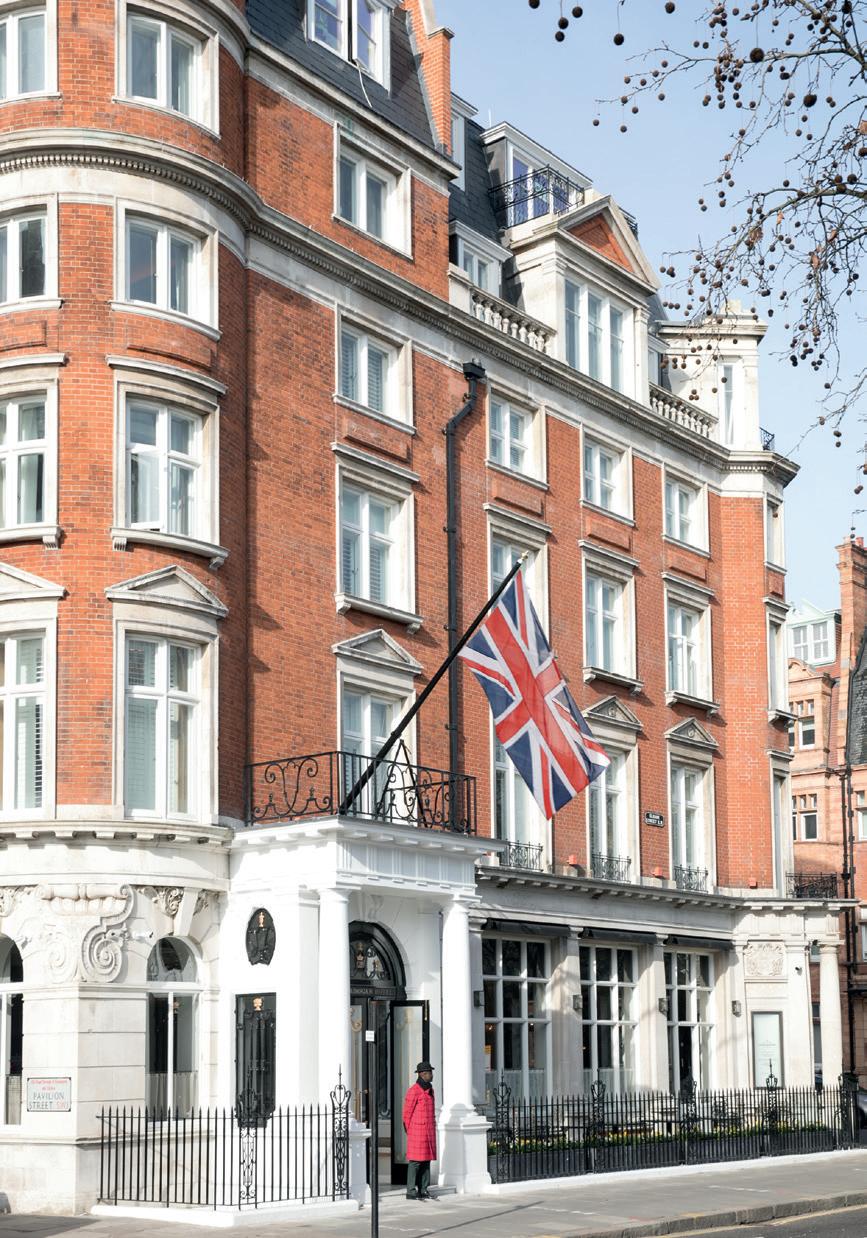
The Cadogan has something for every taste, at every time of day. Dine on sophisticated, classic European cuisine at The LaLee, or enjoy a traditional afternoon tea experience in the Maison Lounge
inside and discover an indulgent city hideaway where every detail weaves together past and present. If walls could talk, ours would have some captivating stories to tell.
Betjeman. Today, The Cadogan Hotel offers a luxurious home-from-home, a blend of its rich storied past and the present day. It is suggested that if the walls could talk, they would have some captivating stories to tell.
Further hotels include the boutique Beaverbrook Town House – the Capital’s outpost of the Surrey members' club – which occupies two beautifully restored Georgian townhouses with 14 suites, each named after celebrated London theatres. From a prime perch on Sloane Street, guests overlook the leafy-green grandeur of Cadogan Gardens, a private green space that is exclusive to local residents and hotel guests, ensuring privacy is maintained.
The Carlton Tower Jumeirah also recently reopened, following a £100 million renovation, offering citywide views, stylish suites for city
breaks and a luxurious wellness space featuring a 20-metre swimming pool.
Sloane Street is also home to luxury boutiques and flagships of various internationally acclaimed brands – from Tom Ford, Emilia Wickstead, Diptyque and Burberry, to Harvey Nichols, Prada, Hermès, Dior, Louis Vuitton and more.


For those looking for a unique and creative shopping experience, the Anya Village on adjacent Pont Street is a must-visit; this curation of six Anya Hindmarch boutiques includes a rotating concept space that has recently hosted Anya’s Ice Cream Parlour and a Grotto, as well as the newly opened world’s smallest Department Store.
In addition to the exemplary service offered in Sloane Street's boutiques –including elegant private client
“For a unique and creative shopping experience,
a must-visit”2 Streets lined with fashionable boutiques radiate a vibrant sense of style (PHOTO: @sloanestreetsw1 )
spaces, hand-delivery of purchases to hotels and one-of-a-kind pieces in store – the Street will soon be offering personal shopping services, further enhancing a truly best-inclass shopping experience.
Haute cuisine
Chelsea offers a host of exceptional bars and fine dining choices. Choose classic European cuisine at The LaLee, with a terrace overlooking the glamour of Sloane Street, whilst sophisticated Italian indulgence is on offer at Harry’s Dolce Vita, named after the famed bar in Venice. The Fuji Grill, set within Beaverbrook Town House, offers an extraordinary Omakase tasting experience of exquisite
traditional Japanese dishes, whilst Al Mare, within The Carlton Tower Jumeirah, is home to memorable Italian seafood.
Cantinetta Antinori, the London debut from the famed Venetian wine dynasty, has recently opened on Harriet Street, offering traditional Tuscan charm whilst further along towards Sloane Square, Azzurra is set to open late-2023, a new Italian and seafood concept.
Aside from world-class boutiques, hotels and restaurants, the neighbourhood is home to some of Europe’s leading cultural destinations. For example, Cadogan Hall, a 950-seat concert venue, is home to the Royal Philharmonic Orchestra and hosts an extensive

“Sloane Street offers a host of unmissable drinking and dining choices”
Our two beautifully restored Georgian townhouses are home to 14 suites, each styled and named after celebrated London theatres, a superlative Japanese restaurant and a vibrant bar. The beguiling boutique luxury hotel boasts a prime perch on stylish Sloane Street, overlooking the leafy-green grandeur of Cadogan Gardens.

We welcome walk-in guests to enjoy an elegant menu of flawless sushi, sashimi and nigiri at The Fuji Grill, and innovative cocktails in the remarkable atmosphere of Sir Frank’s Bar. Our Private Dining Room, The Butterfl y Room, o ers the perfect backdrop to meet, greet and get together for a high-grade business event, or celebratory dinner.
Beaverbrook Town House, 115 Sloane Street, Chelsea, London SW1X 9PJ
T: +44 (0)203 988 6611



E: reservations@beaverbrooktownhouse.co.uk



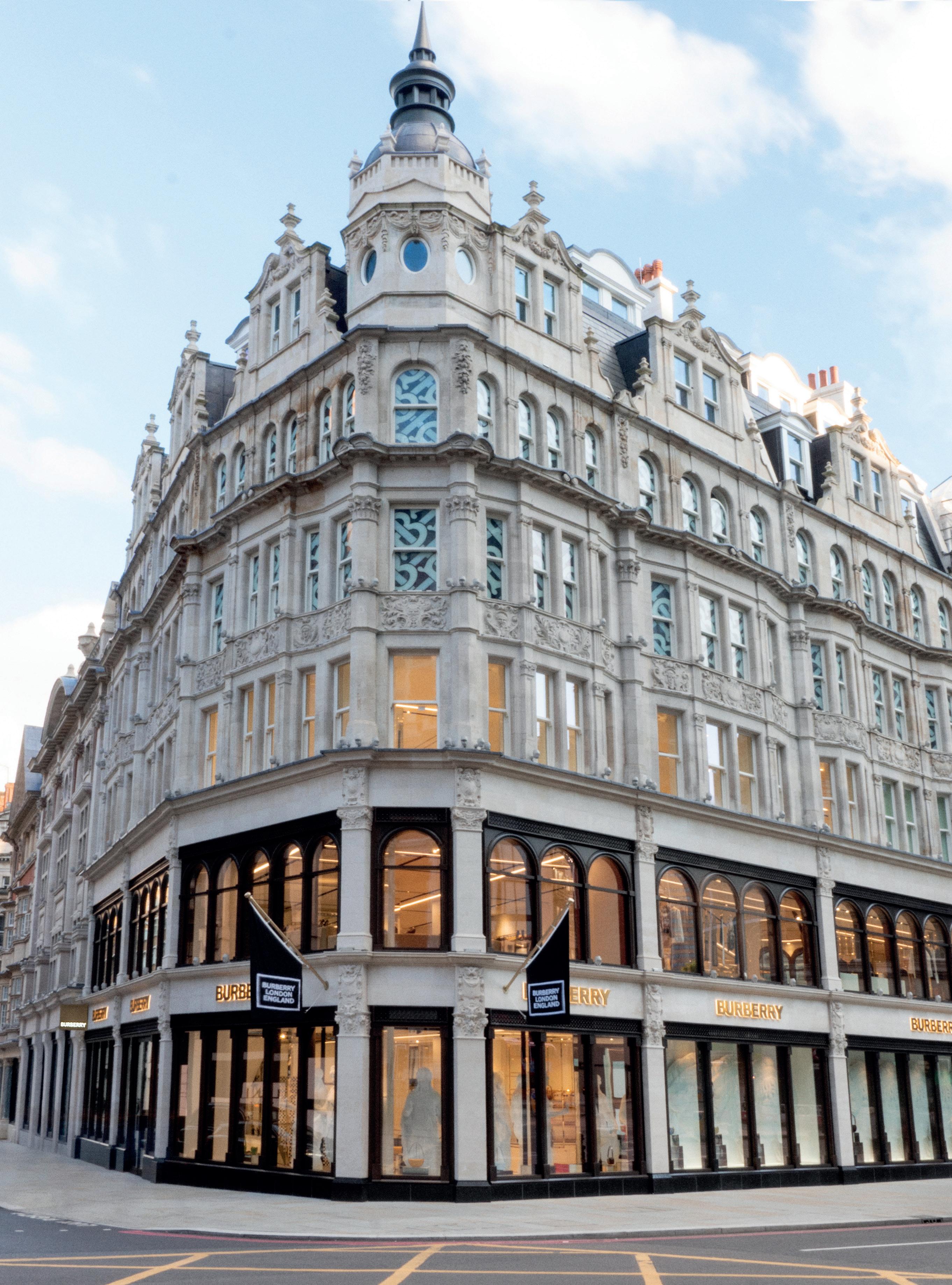
programme of internationally acclaimed performers. On Sloane Square, the Royal Court Theatre cultivates and supports emerging and undiscovered talent, while a stone’s-throw away is the Saatchi Gallery, home of contemporary art exhibitions.
It is all this that makes Sloane Street such an extraordinary place, forming a crucial piece of the wider Chelsea neighbourhood, sitting alongside three other iconic destinations: Duke of York Square, the King’s Road and Pavilion Road; together forming the ‘rich’ tapestry of the borough.
Award-winning shopping and dining
Duke of York Square, originally built as a school for military orphans in 1801, is now an award-winning shopping and dining destination, with
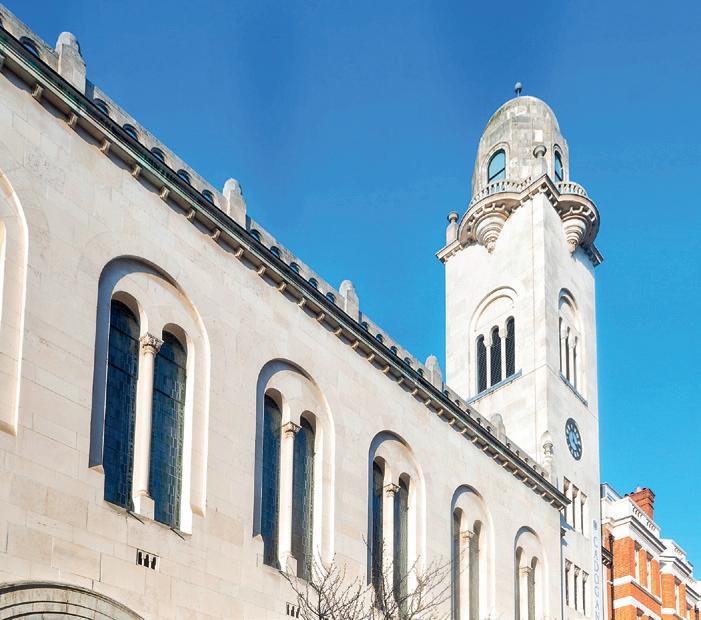
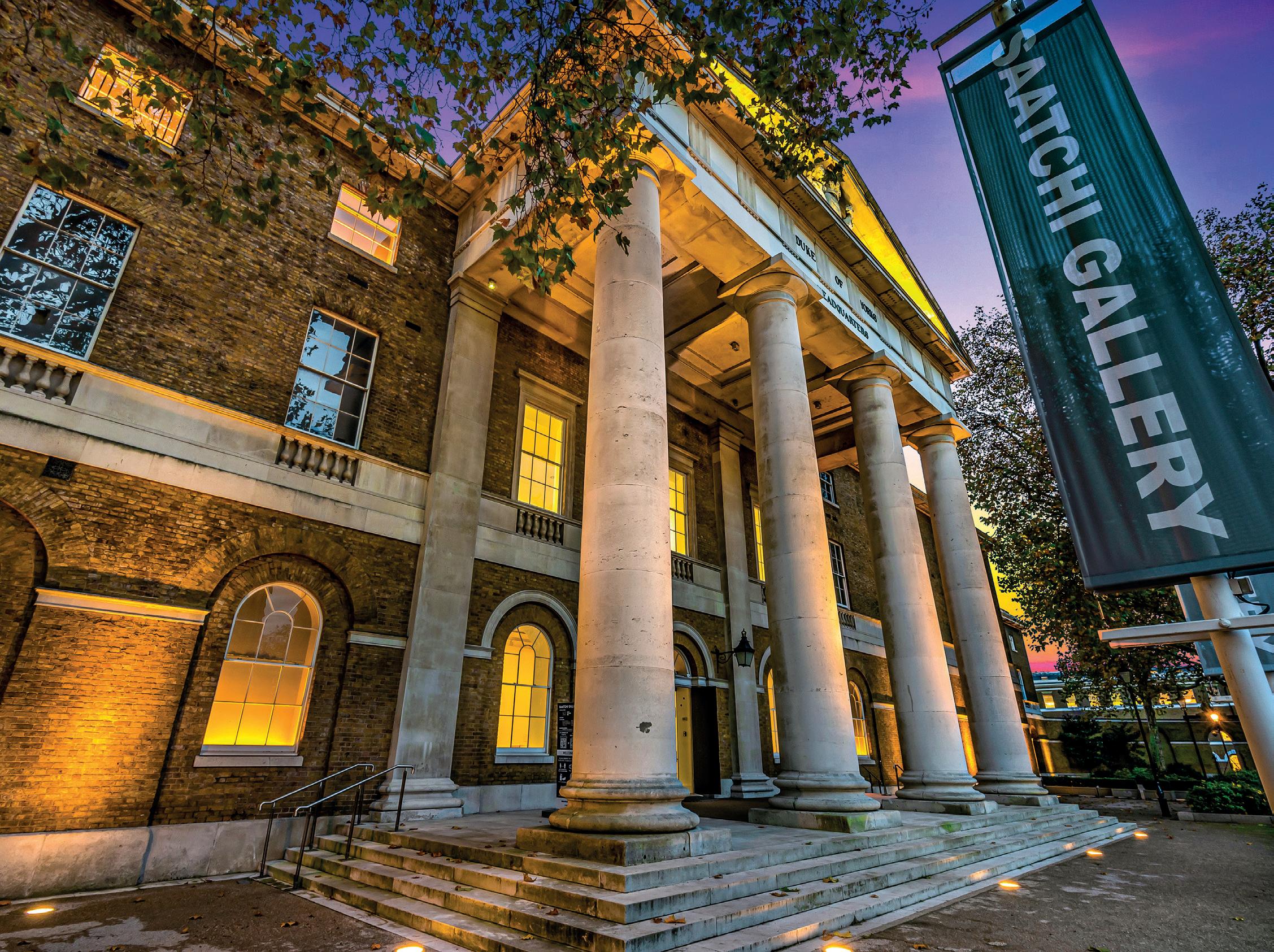
over 30 brands set amongst classic architecture and contemporary design. Home to one of Europe’s largest Zara fashion stores, as well as self-portrait, Reformation and British jewellery brand Monica Vinader, the Square also has a reputation as a gourmet destination, with seven restaurants and cafes that have extensive al-fresco dining spaces, and one of London’s best open-air fine-food markets. For those looking to immerse themselves in the community and remain active, complimentary fitness classes take place weekly throughout the year – find out more at dukeofyorksquare.co.uk
The Square can be found just off the famous King’s Road – which boasts royal origins and was also the birthplace of some of the 20th Century’s most iconic cultural movements. King's Road offers contemporary fashion and art,

plus great food and drink, and is home to some of the best independent and high-street stores, including RIXO, GANNI, Soho.Home.Studio and Peter Jones, anthropologie and Ralph Lauren.
The King's Road's award-winning pubs and acclaimed restaurants include The Cadogan Arms, Rabbit, The Surprise and Vardo. Gyms and health studios abound for those looking after their health and wellbeing, while lovers of art and culture will enjoy exploring the galleries aplenty.
Chelsea’s village heart is Pavilion Road, tucked away off Sloane Square and the home of artisan food, beauty, fashion and restaurants. London’s longest mews, adorned in twinkling lights, is the perfect spot to enjoy an al-fresco coffee while soaking up the atmosphere. Culinary


delights abound when shopping on the mews, with shops including a butcher, baker, cheesemonger and greengrocer.
These locations combine with Sloane Street to form a neighbourhood alive with personalities, characters and craftspeople. An annual events programme sees the community fill the streets in celebration throughout the year, with highlights including Chelsea in Bloom – London’s largest free flower festival, which takes place in May and sees the streets adorned in floral displays – as well as unmissable celebrations for the King's Coronation, outdoor Wimbledon tennis screenings in July, and a Christmas lights switch-on in November that sees Chelsea lit up beneath a spectacular fireworks display.
7 A summer evening on Pavilion Road, where al-fresco dining allows visitors to soak up the local atmosphere well into the night (PHOTO: @pavilionroad)“Chelsea’s village heart is Pavilion Road, tucked away off Sloane Square”




